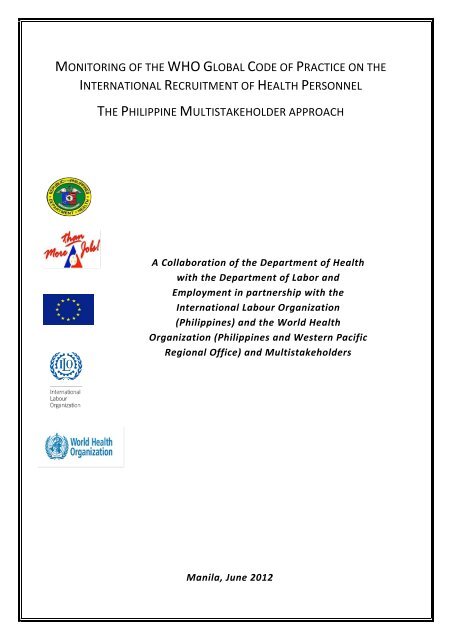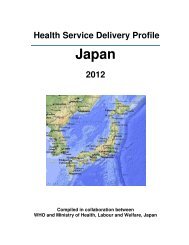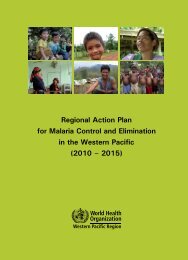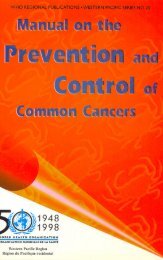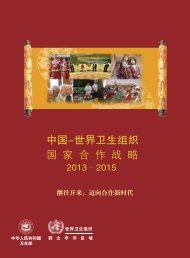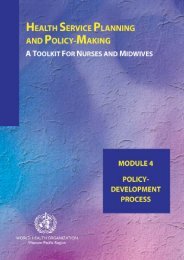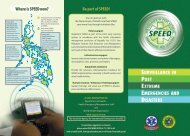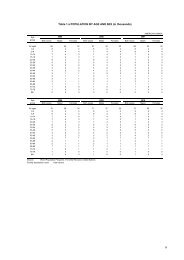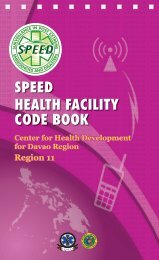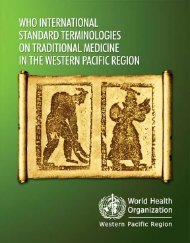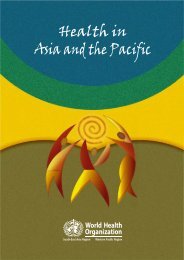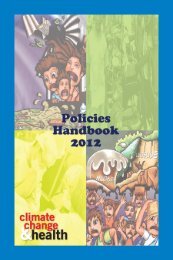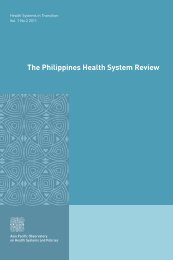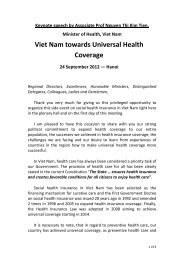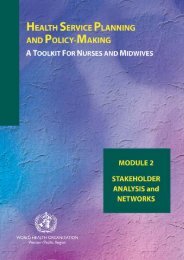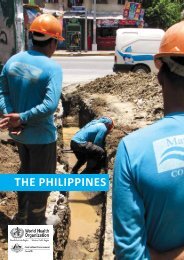monitoring of the who global code of practice on the international ...
monitoring of the who global code of practice on the international ...
monitoring of the who global code of practice on the international ...
You also want an ePaper? Increase the reach of your titles
YUMPU automatically turns print PDFs into web optimized ePapers that Google loves.
MONITORING OF THE WHO GLOBAL CODE OF PRACTICE ON THE<br />
INTERNATIONAL RECRUITMENT OF HEALTH PERSONNEL<br />
THE PHILIPPINE MULTISTAKEHOLDER APPROACH<br />
A Collaborati<strong>on</strong> <str<strong>on</strong>g>of</str<strong>on</strong>g> <str<strong>on</strong>g>the</str<strong>on</strong>g> Department <str<strong>on</strong>g>of</str<strong>on</strong>g> Health<br />
with <str<strong>on</strong>g>the</str<strong>on</strong>g> Department <str<strong>on</strong>g>of</str<strong>on</strong>g> Labor and<br />
Employment in partnership with <str<strong>on</strong>g>the</str<strong>on</strong>g><br />
Internati<strong>on</strong>al Labour Organizati<strong>on</strong><br />
(Philippines) and <str<strong>on</strong>g>the</str<strong>on</strong>g> World Health<br />
Organizati<strong>on</strong> (Philippines and Western Pacific<br />
Regi<strong>on</strong>al Office) and Multistakeholders<br />
Manila, June 2012
CONTENTS<br />
CONVENORS.............................................................................................................................. ii<br />
TECHNICAL and ORGANIZING COMMITTEE .............................................................................. ii<br />
CONSULTANT and TECHNICAL WRITER..................................................................................... ii<br />
FACILITATORS........................................................................................................................... iii<br />
SECRETARIAT............................................................................................................................ iii<br />
DOCUMENTORS ....................................................................................................................... iii<br />
MULTISTAKEHOLDERS.............................................................................................................. iii<br />
LIST OF FIGURES...................................................................................................................... vii<br />
LIST OF BOXES ......................................................................................................................... vii<br />
ACRONYMS..............................................................................................................................viii<br />
EXECUTIVE SUMMARY .............................................................................................................. x<br />
INTRODUCTION......................................................................................................................... 1<br />
THE PHILIPPINE APPROACH ...................................................................................................... 3<br />
SUPPLEMENTAL INFORMATION.............................................................................................. 18<br />
CONCLUSION........................................................................................................................... 21<br />
ANNEX A: Proposed Questi<strong>on</strong>s for Source Countries.............................................................. 23<br />
ANNEX B: The Philippine Worksheet....................................................................................... 24
CONVENORS<br />
Department <str<strong>on</strong>g>of</str<strong>on</strong>g> Health<br />
Dr. Kenneth R<strong>on</strong>quillo, Director IV, Health Human Resources Development Bureau<br />
Dr. Christine Joan Co, Team Leader for Policy and Network, Planning and Standards Divisi<strong>on</strong><br />
Department <str<strong>on</strong>g>of</str<strong>on</strong>g> Labor and Employment<br />
Ms. Fely Romero, Director, Philippine Overseas Employment Administrati<strong>on</strong><br />
Internati<strong>on</strong>al Labour Organizati<strong>on</strong> (Manila)<br />
Ms. Ca<str<strong>on</strong>g>the</str<strong>on</strong>g>rine Vaillancourt-‐Laflamme, Chief Technical Advisor, Decent Work Across Borders<br />
Project<br />
Ms. Jennifer Frances dela Rosa, Nati<strong>on</strong>al Program Officer, Decent Work Across Borders<br />
Project<br />
World Health Organizati<strong>on</strong> (Philippines)<br />
Dr. Soe Nyunt-‐U, WHO Representative, WHO Country Office<br />
Ms. Lucille Nievera,Programme Officer, WHO Country Office<br />
World Health Organizati<strong>on</strong> (Western Pacific Regi<strong>on</strong>al Office)<br />
Dr. F. Gülin Gedik, Team Leader, Human Resources for Health,WHO Western Pacific Regi<strong>on</strong>al<br />
Office<br />
Ms. Kathleen Fritsch, Nursing Regi<strong>on</strong>al Advisor, WHO Western Pacific Regi<strong>on</strong>al Office<br />
TECHNICAL AND ORGANIZING COMMITTEE<br />
Dr. Kenneth R<strong>on</strong>quillo, Director IV, Health Human Resources Development Bureau<br />
Dr. Christine Joan Co, Team Leader for Policy and Network, Planning and Standards Divisi<strong>on</strong><br />
Ms. Ca<str<strong>on</strong>g>the</str<strong>on</strong>g>rine Vaillancourt-‐Laflamme, Chief Technical Advisor, Decent Work Across Borders<br />
Project<br />
Ms. Jennifer Frances dela Rosa, Nati<strong>on</strong>al Program Officer, Decent Work Across Borders<br />
Project<br />
CONSULTANT AND TECHNICAL WRITER<br />
ii
Ms. Maria Lourdes Rebullida, DPA<br />
FACILITATORS<br />
Dr. Kenneth R<strong>on</strong>quillo, Department <str<strong>on</strong>g>of</str<strong>on</strong>g> Health<br />
Dr. Christine Joan Co, Department <str<strong>on</strong>g>of</str<strong>on</strong>g> Health<br />
Ms. Ca<str<strong>on</strong>g>the</str<strong>on</strong>g>rine Vaillancourt-‐Laflamme, ILO Manila<br />
Ms. Jennifer Frances dela Rosa, ILO Manila<br />
Ms. Maria C<strong>on</strong>cepci<strong>on</strong> Sardaña, ILO Manila<br />
Ms.Fely Marilyn Lorenzo, DrPH, University <str<strong>on</strong>g>of</str<strong>on</strong>g> <str<strong>on</strong>g>the</str<strong>on</strong>g> Philippines Manila<br />
Mr. Ricardo Casco, Internati<strong>on</strong>al Organizati<strong>on</strong> for Migrati<strong>on</strong><br />
Ms. Maria Lourdes Rebullida, DPA, University <str<strong>on</strong>g>of</str<strong>on</strong>g> <str<strong>on</strong>g>the</str<strong>on</strong>g> Philippines Diliman<br />
SECRETARIAT<br />
Ms. Madelyne Mabini<br />
Ms. Desiree Joy Granil<br />
DOCUMENTORS<br />
Dr. Carl Ant<strong>on</strong>io<br />
Ms. April Delos Santos<br />
Ms. Mary Jane Demegillo<br />
Ms. Marjorie Dungca<br />
Dr. Irene Farinas<br />
Ms. Farrah Grace Naparan<br />
Mr. Jays<strong>on</strong> Aguilar<br />
Ms. Grace Fernando<br />
Ms. Georgina Ramiro<br />
Ms. Caridad Ulanday<br />
iii
Mr. Frencel Tingga<br />
Mr. Jeric Sagala<br />
MULTISTAKEHOLDERS<br />
Commissi<strong>on</strong> <strong>on</strong> Filipinos Overseas<br />
Ms. Elsa Florendo Commissi<strong>on</strong> <strong>on</strong> Higher Educati<strong>on</strong><br />
Ms. Emily Villanueva – Descallar Department <str<strong>on</strong>g>of</str<strong>on</strong>g> Foreign Affairs<br />
Dr. Aleli Annie Grace Sudiacal<br />
Ms. Jeanne Bernas<br />
Dr. Lilibeth David<br />
Dr. Elizabeth Matibag<br />
Ms. Juanita Valeza<br />
Mr. Jose Sandoval<br />
Ms. Geraldine Labayani<br />
Ms. Milagros Oliva<br />
Dr. Marco Valeros<br />
Dr. Rhyan Gallego<br />
Ms. Vivian Tornea<br />
Atty. Bulyok Nil<strong>on</strong>g<br />
Ms. Luisa Reyes<br />
DOH-‐Bureau <str<strong>on</strong>g>of</str<strong>on</strong>g> Internati<strong>on</strong>al Health Cooperati<strong>on</strong><br />
DOH -‐ Health Policy Development and Planning Bureau<br />
DOLE -‐ Bureau <str<strong>on</strong>g>of</str<strong>on</strong>g> Local Employment<br />
DOLE -‐ Bureau <str<strong>on</strong>g>of</str<strong>on</strong>g> Working C<strong>on</strong>diti<strong>on</strong>s<br />
DOLE -‐ Nati<strong>on</strong>al Reintegrati<strong>on</strong> Center for OFWs<br />
Dr. Marissa San Jose DOLE – Occupati<strong>on</strong>al Safety and Health Center<br />
Ms. Arlene Ruiz<br />
Mr. Benjamin Jose Bautista<br />
Mr. Arthur Philip Sevilla<br />
Ms. Maybelle Gorospe<br />
Mr. J<strong>on</strong>e Fung<br />
Ms. Nimfa De Guzman<br />
Mr. Carlos Canabera<br />
Mr. Pamfilo Tabu, Jr.<br />
Ms. M<strong>on</strong>ica Ormillo<br />
Mr. Alvin Cloyd Dakis<br />
Mr. J<strong>on</strong>athan M<strong>on</strong>is<br />
Nati<strong>on</strong>al Ec<strong>on</strong>omic and Development Authority<br />
Philippine Overseas Employment Administrati<strong>on</strong><br />
Technical Educati<strong>on</strong> Skills Development Authority<br />
Alliance <str<strong>on</strong>g>of</str<strong>on</strong>g> Young Nurse Leaders and Advocates<br />
Internati<strong>on</strong>al, Inc.<br />
Ms. Joycelynn Aman Philippine Associati<strong>on</strong> <str<strong>on</strong>g>of</str<strong>on</strong>g> Medical Technologists, Inc.<br />
Mr. Noel Cadete<br />
Dr. Teresita Barcelo<br />
Philippine Nurses Associati<strong>on</strong>, Inc.<br />
iv
Ms. Le<strong>on</strong>ila Ocampo<br />
Dr. Yolanda Robles<br />
Philippine Pharmacists Associati<strong>on</strong><br />
Ms. Gayline Manalang, Jr. Philippine Physical Therapy Associati<strong>on</strong>, Inc<br />
Ms. Freyda Viesca Employers C<strong>on</strong>federati<strong>on</strong> <str<strong>on</strong>g>of</str<strong>on</strong>g> <str<strong>on</strong>g>the</str<strong>on</strong>g> Philippines<br />
Dr. Jose Luis Danguilan Lung Center <str<strong>on</strong>g>of</str<strong>on</strong>g> <str<strong>on</strong>g>the</str<strong>on</strong>g> Philippines<br />
Ms. Jeanette Nora Silao<br />
Dr. Bernadette Hogar<br />
Ms. Mary Eve De Le<strong>on</strong><br />
Ms. Ivy Alcantara<br />
Ms. Katrina Ledesma<br />
Dr. Jose Dante Dator<br />
Ms. Nimia Parale<br />
Manila Doctors Hospital<br />
Makati Medical Center<br />
Nati<strong>on</strong>al Kidney and Transplant Institute<br />
Ms. Lizel San Pedro Ospital ng Makati – Pembo<br />
Ms. Le<strong>on</strong>ida Ventosa Ospital ng Muntinlupa<br />
Dr. Paulo Castro<br />
Mr. Horacio Apuyan<br />
Dr. Kiko Tranquilino<br />
Pasig City General Hospital<br />
Ms. Maria Linda Buhat Philippine Heart Center<br />
Pharmaceutical and Healthcare Associati<strong>on</strong> <str<strong>on</strong>g>of</str<strong>on</strong>g> <str<strong>on</strong>g>the</str<strong>on</strong>g><br />
Philippines<br />
Mr. Vladimir Balbino St. Luke’s Medical Center – Quez<strong>on</strong> City<br />
Dr. John Jerusalem Ti<strong>on</strong>gs<strong>on</strong> The Medical Center<br />
Mr. Nestor Flores Abba Pers<strong>on</strong>nel Services, Inc<br />
Mr. Ram<strong>on</strong> Quevedo EDI-‐Staff Builders Internati<strong>on</strong>al<br />
Ms. Valerie Santos Health Carousel Philippines, Inc<br />
Ms. Marysol Ligod Innovative Manpower Services<br />
Ms. Ca<str<strong>on</strong>g>the</str<strong>on</strong>g>rine Peralta Jedegal Internati<strong>on</strong>al Manpower Services<br />
v
Mr. Loreto Soriano LBS Recruitment Soluti<strong>on</strong>s Corporati<strong>on</strong><br />
Ms. Marjo Miinalainen OPTEAM Global -‐ Regi<strong>on</strong>al Office<br />
Ms. Joy del Rosario PETRO -‐ FIL Manpower Services Inc.<br />
Mr. Victor Fernandez, Jr.<br />
Mr. Hernan Guanco<br />
Mr. Jesus Noel Litan<br />
Mr. Sim<strong>on</strong> John Corocoto Signature HealthCARE<br />
Philippine Associati<strong>on</strong> <str<strong>on</strong>g>of</str<strong>on</strong>g> Service Exporters, Inc<br />
Ms. Joanna Katrina Magal<strong>on</strong>g Transnati<strong>on</strong>al Services Inc.<br />
Mr. Josua Mata Alliance <str<strong>on</strong>g>of</str<strong>on</strong>g> Progressive Labor<br />
Ms. Suevelyn Clavite<br />
Mr. Abdulani Lakibul<br />
C<strong>on</strong>federati<strong>on</strong> <str<strong>on</strong>g>of</str<strong>on</strong>g> Independent Uni<strong>on</strong><br />
Mr. Julius Cainglet Federati<strong>on</strong> <str<strong>on</strong>g>of</str<strong>on</strong>g> Filipinos Workers<br />
Ms. Esperanza Ocampo<br />
Ms. Josephine Pagsuyuin -‐ Jam<strong>on</strong><br />
Ms. Annie Enriquez – Ger<strong>on</strong><br />
Ms. Jillian Roque<br />
Philippines Government Employee Alliance<br />
Public Services-‐Labour Independent C<strong>on</strong>federati<strong>on</strong><br />
vi
LIST OF FIGURES<br />
Figure1. Philippine Approach to M<strong>on</strong>itoring <str<strong>on</strong>g>the</str<strong>on</strong>g> WHO Global Code <str<strong>on</strong>g>of</str<strong>on</strong>g> Practice <strong>on</strong> <str<strong>on</strong>g>the</str<strong>on</strong>g><br />
Internati<strong>on</strong>al Recruitment <str<strong>on</strong>g>of</str<strong>on</strong>g> Health Pers<strong>on</strong>nel<br />
LIST OF BOXES<br />
Box 1. The Philippine Approach: Steps in M<strong>on</strong>itoring <str<strong>on</strong>g>the</str<strong>on</strong>g> Implementati<strong>on</strong> <str<strong>on</strong>g>of</str<strong>on</strong>g> <str<strong>on</strong>g>the</str<strong>on</strong>g> WHO Global<br />
Code <str<strong>on</strong>g>of</str<strong>on</strong>g> Practice <strong>on</strong> <str<strong>on</strong>g>the</str<strong>on</strong>g> Internati<strong>on</strong>al Recruitment <str<strong>on</strong>g>of</str<strong>on</strong>g> Health Pers<strong>on</strong>nel (April to May 2012)<br />
Box 2. DOH-‐HHRDB as Focal Unit for M<strong>on</strong>itoring Implementati<strong>on</strong> <str<strong>on</strong>g>of</str<strong>on</strong>g> <str<strong>on</strong>g>the</str<strong>on</strong>g> WHO Global Code <str<strong>on</strong>g>of</str<strong>on</strong>g><br />
Practice <strong>on</strong> <str<strong>on</strong>g>the</str<strong>on</strong>g> Internati<strong>on</strong>al Recruitment <str<strong>on</strong>g>of</str<strong>on</strong>g> Health Pers<strong>on</strong>nel (April to May 2012)<br />
Box 3. ILO Decent Work Across Borders Project: A Pilot Project for Migrant Health<br />
Pr<str<strong>on</strong>g>of</str<strong>on</strong>g>essi<strong>on</strong>als and Skilled Workers (ILO Manila with European Uni<strong>on</strong> funding)<br />
vii
ACRONYMS<br />
AANZFTA Associati<strong>on</strong> <str<strong>on</strong>g>of</str<strong>on</strong>g> Sou<str<strong>on</strong>g>the</str<strong>on</strong>g>ast Asian Nati<strong>on</strong>s-‐Australia-‐New Zealand Free<br />
Trade Agreement<br />
ASEAN Associati<strong>on</strong> <str<strong>on</strong>g>of</str<strong>on</strong>g> Sou<str<strong>on</strong>g>the</str<strong>on</strong>g>ast Asian Nati<strong>on</strong>s<br />
ASEAN MRAr ASEAN Mutual Recogniti<strong>on</strong> Arrangement<br />
CFO Commissi<strong>on</strong> <strong>on</strong> Filipinos Overseas<br />
CHED Commissi<strong>on</strong> <strong>on</strong> Higher Educati<strong>on</strong><br />
DFA Department <str<strong>on</strong>g>of</str<strong>on</strong>g> Foreign Affairs<br />
DILG Department <str<strong>on</strong>g>of</str<strong>on</strong>g> <str<strong>on</strong>g>the</str<strong>on</strong>g> Interior and Local Government<br />
DILG-‐BLGD Department <str<strong>on</strong>g>of</str<strong>on</strong>g> <str<strong>on</strong>g>the</str<strong>on</strong>g> Interior and Local Government-‐Bureau <str<strong>on</strong>g>of</str<strong>on</strong>g> Local<br />
Government Development<br />
DOH Department <str<strong>on</strong>g>of</str<strong>on</strong>g> Health<br />
DOH –BIHC DOH-‐Bureau <str<strong>on</strong>g>of</str<strong>on</strong>g> Health Internati<strong>on</strong>al Cooperati<strong>on</strong><br />
DOH-‐HHRDB DOH -‐Health Human Resources Development Bureau<br />
DOH – HPDPB DOH -‐Health Policy Development and Planning Bureau<br />
DOH – NCPAM DOH-‐Nati<strong>on</strong>al Center for Pharmaceutical Access & Management<br />
DOLE Department <str<strong>on</strong>g>of</str<strong>on</strong>g> Labor and Employment<br />
DOLE -‐ BLE DOLE-‐Bureau <str<strong>on</strong>g>of</str<strong>on</strong>g> Local Employment<br />
DOLE –BLR DOLE-‐Bureau <str<strong>on</strong>g>of</str<strong>on</strong>g> Labour Relati<strong>on</strong>s<br />
DOLE – BWC DOLE -‐Bureau <str<strong>on</strong>g>of</str<strong>on</strong>g> Working C<strong>on</strong>diti<strong>on</strong>s<br />
DOLE – ILS DOLE -‐Institute <str<strong>on</strong>g>of</str<strong>on</strong>g> Labor Studies<br />
DOLE – NRCO DOLE-‐Nati<strong>on</strong>al Reintegrati<strong>on</strong> Center for Overseas Filipino Workers<br />
DOLE –OSHC Department <str<strong>on</strong>g>of</str<strong>on</strong>g> Labor and Employment-‐Occupati<strong>on</strong>al Safety and<br />
Health Center<br />
DWAB Decent Work Across Borders<br />
HRH Human Resources for Health<br />
ILO Manila Internati<strong>on</strong>al Labour Organizati<strong>on</strong> (Manila Office)<br />
ILO-‐DWAB Internati<strong>on</strong>al Labour Organizati<strong>on</strong>-‐Decent Work Across Borders<br />
Project<br />
viii
MASEAN Medical Associati<strong>on</strong> <str<strong>on</strong>g>of</str<strong>on</strong>g> Sou<str<strong>on</strong>g>the</str<strong>on</strong>g>ast Asian Nati<strong>on</strong>s<br />
MDH Manila Doctors Hospital<br />
MRAr Mutual Recogniti<strong>on</strong> Arrangement<br />
NEDA Nati<strong>on</strong>al Ec<strong>on</strong>omic and Development Authority<br />
OWWA Overseas Workers Welfare Administrati<strong>on</strong><br />
PEOS Pre-‐Employment Orientati<strong>on</strong> Seminar<br />
PDOS Pre-‐Departure Orientati<strong>on</strong> Seminar<br />
PHC Philippine Heart Center<br />
PNA Philippine Nurses Associati<strong>on</strong>, Inc.<br />
PPhA Philippine Pharmacists Associati<strong>on</strong><br />
PPTA Philippine Physical Therapy Associati<strong>on</strong>, Inc.<br />
POEA Philippine Overseas Employment Administrati<strong>on</strong><br />
PRC Pr<str<strong>on</strong>g>of</str<strong>on</strong>g>essi<strong>on</strong>al Regulati<strong>on</strong> Commissi<strong>on</strong><br />
PRC-‐IAD Pr<str<strong>on</strong>g>of</str<strong>on</strong>g>essi<strong>on</strong>al Regulati<strong>on</strong> Commissi<strong>on</strong>-‐Internati<strong>on</strong>al Affairs Divisi<strong>on</strong><br />
PSLINK Public Services-‐Labour Independent C<strong>on</strong>federati<strong>on</strong><br />
TESDA Technical Educati<strong>on</strong> Skills Development Authority<br />
UP-‐NIH University <str<strong>on</strong>g>of</str<strong>on</strong>g> <str<strong>on</strong>g>the</str<strong>on</strong>g> Philippines-‐Nati<strong>on</strong>al Institutes <str<strong>on</strong>g>of</str<strong>on</strong>g> Health<br />
UP-‐NIH IHPDS University <str<strong>on</strong>g>of</str<strong>on</strong>g> <str<strong>on</strong>g>the</str<strong>on</strong>g> Philippines-‐Nati<strong>on</strong>al Institutes <str<strong>on</strong>g>of</str<strong>on</strong>g> Health, Institute<br />
<str<strong>on</strong>g>of</str<strong>on</strong>g> Health Policy and Development Studies<br />
WHO World Health Organizati<strong>on</strong><br />
WHO Philippines WHO Philippine Office<br />
WHO WPRO WHO Western Pacific Regi<strong>on</strong>al Office<br />
ix
EXECUTIVE SUMMARY<br />
The Philippines initiated a participatory multistakeholder process for <str<strong>on</strong>g>the</str<strong>on</strong>g> <str<strong>on</strong>g>m<strong>on</strong>itoring</str<strong>on</strong>g> <str<strong>on</strong>g>of</str<strong>on</strong>g><br />
implementati<strong>on</strong> <str<strong>on</strong>g>of</str<strong>on</strong>g> <str<strong>on</strong>g>the</str<strong>on</strong>g> WHO Global Code <str<strong>on</strong>g>of</str<strong>on</strong>g> Practice <strong>on</strong> <str<strong>on</strong>g>the</str<strong>on</strong>g> Internati<strong>on</strong>al Recruitment <str<strong>on</strong>g>of</str<strong>on</strong>g><br />
Health Pers<strong>on</strong>nel (The Code). The Department <str<strong>on</strong>g>of</str<strong>on</strong>g> Health (DOH) took <str<strong>on</strong>g>the</str<strong>on</strong>g> lead as <str<strong>on</strong>g>the</str<strong>on</strong>g> WHO<br />
designated nati<strong>on</strong>al authority, with <str<strong>on</strong>g>the</str<strong>on</strong>g> Department <str<strong>on</strong>g>of</str<strong>on</strong>g> Labor and Employment (DOLE), and<br />
in partnership with <str<strong>on</strong>g>the</str<strong>on</strong>g> Internati<strong>on</strong>al Labour Organizati<strong>on</strong> (ILO Manila) and <str<strong>on</strong>g>the</str<strong>on</strong>g> World Health<br />
Organizati<strong>on</strong> (WHO Philippines and Western Regi<strong>on</strong>al Pacific Office), and local stakeholders<br />
from <str<strong>on</strong>g>the</str<strong>on</strong>g> government, trade uni<strong>on</strong>s, employers, recruitment agencies, and pr<str<strong>on</strong>g>of</str<strong>on</strong>g>essi<strong>on</strong>al<br />
associati<strong>on</strong>s.<br />
The process benefited <str<strong>on</strong>g>the</str<strong>on</strong>g> fact that <str<strong>on</strong>g>the</str<strong>on</strong>g> ILO, with <str<strong>on</strong>g>the</str<strong>on</strong>g> financial support <str<strong>on</strong>g>of</str<strong>on</strong>g> <str<strong>on</strong>g>the</str<strong>on</strong>g> European<br />
Uni<strong>on</strong>, is implementing a project called Decent Work Across Borders: A Pilot project for<br />
Migrant Health Pr<str<strong>on</strong>g>of</str<strong>on</strong>g>essi<strong>on</strong>als and Skilled Workers (DWAB).The project is implemented<br />
through a partnership with DOLE, trade uni<strong>on</strong> and employers organizati<strong>on</strong>s and o<str<strong>on</strong>g>the</str<strong>on</strong>g>r<br />
relevant partners. It provided <str<strong>on</strong>g>the</str<strong>on</strong>g> opportunity to work with <str<strong>on</strong>g>the</str<strong>on</strong>g> DOH <strong>on</strong> <str<strong>on</strong>g>the</str<strong>on</strong>g>ir comm<strong>on</strong><br />
c<strong>on</strong>cern for ethical recruitment <str<strong>on</strong>g>of</str<strong>on</strong>g> human resources for health (HRH).<br />
The ILO DWAB hosted an initial meeting <strong>on</strong> <str<strong>on</strong>g>the</str<strong>on</strong>g> 29 th <str<strong>on</strong>g>of</str<strong>on</strong>g> March 2012, which was attended by<br />
representatives <str<strong>on</strong>g>of</str<strong>on</strong>g> <str<strong>on</strong>g>the</str<strong>on</strong>g> four organizing committee members —<str<strong>on</strong>g>the</str<strong>on</strong>g> DOH, DOLE, ILO and WHO<br />
Philippines and WPRO. In this meeting, organizers discussed <str<strong>on</strong>g>the</str<strong>on</strong>g> WHO Global Code <str<strong>on</strong>g>of</str<strong>on</strong>g><br />
Practice <strong>on</strong> <str<strong>on</strong>g>the</str<strong>on</strong>g> Internati<strong>on</strong>al Recruitment <str<strong>on</strong>g>of</str<strong>on</strong>g> Health Pers<strong>on</strong>nel, also known as <str<strong>on</strong>g>the</str<strong>on</strong>g> Code, and<br />
its Nati<strong>on</strong>al Reporting Instrument. This meeting mapped <str<strong>on</strong>g>the</str<strong>on</strong>g> terms <str<strong>on</strong>g>of</str<strong>on</strong>g> <str<strong>on</strong>g>the</str<strong>on</strong>g>ir collaborative<br />
engagement to assist <str<strong>on</strong>g>the</str<strong>on</strong>g> DOH in <str<strong>on</strong>g>m<strong>on</strong>itoring</str<strong>on</strong>g> <str<strong>on</strong>g>the</str<strong>on</strong>g> Code using a participatory approach,<br />
tapping <strong>on</strong> <str<strong>on</strong>g>the</str<strong>on</strong>g> ILO experience to work through social partners.<br />
The organizers ventured into <str<strong>on</strong>g>the</str<strong>on</strong>g> preparati<strong>on</strong> <str<strong>on</strong>g>of</str<strong>on</strong>g> a Philippine M<strong>on</strong>itoring Worksheet for<br />
multistakeholders to provide supplementary data and clarificatory statements. This<br />
worksheet, which stakeholders were asked to complete, included <str<strong>on</strong>g>the</str<strong>on</strong>g> WHO Nati<strong>on</strong>al<br />
Reporting Instrument questi<strong>on</strong>s and linked those to <str<strong>on</strong>g>the</str<strong>on</strong>g> statements from <str<strong>on</strong>g>the</str<strong>on</strong>g> Code. The<br />
worksheet also included a column for stakeholders to add supplementary informati<strong>on</strong> and<br />
clarificati<strong>on</strong> <strong>on</strong> <str<strong>on</strong>g>the</str<strong>on</strong>g>ir resp<strong>on</strong>ses. The worksheet also provided <str<strong>on</strong>g>the</str<strong>on</strong>g> opportunity for<br />
stakeholders to propose improvements to <str<strong>on</strong>g>the</str<strong>on</strong>g> wording <str<strong>on</strong>g>of</str<strong>on</strong>g> <str<strong>on</strong>g>the</str<strong>on</strong>g> questi<strong>on</strong>s included in <str<strong>on</strong>g>the</str<strong>on</strong>g><br />
nati<strong>on</strong>al reporting instrument.<br />
With <str<strong>on</strong>g>the</str<strong>on</strong>g> logistical support <str<strong>on</strong>g>of</str<strong>on</strong>g> <str<strong>on</strong>g>the</str<strong>on</strong>g> DOH and ILO, <str<strong>on</strong>g>the</str<strong>on</strong>g> Philippines c<strong>on</strong>vened introductory<br />
briefings in April 2012, for <str<strong>on</strong>g>the</str<strong>on</strong>g> stakeholders (governments, trade uni<strong>on</strong>s, hospitals,<br />
pr<str<strong>on</strong>g>of</str<strong>on</strong>g>essi<strong>on</strong>al organizati<strong>on</strong>s and recruitment agencies) to present and discuss <str<strong>on</strong>g>the</str<strong>on</strong>g> provisi<strong>on</strong>s<br />
<str<strong>on</strong>g>of</str<strong>on</strong>g> <str<strong>on</strong>g>the</str<strong>on</strong>g> WHO Code, to orient <str<strong>on</strong>g>the</str<strong>on</strong>g>m <strong>on</strong> <str<strong>on</strong>g>the</str<strong>on</strong>g> completi<strong>on</strong> <str<strong>on</strong>g>of</str<strong>on</strong>g> <str<strong>on</strong>g>the</str<strong>on</strong>g> WHO Nati<strong>on</strong>al Reporting<br />
Instrument and Philippine worksheet, and obtain <str<strong>on</strong>g>the</str<strong>on</strong>g>ir commitment to participate in <str<strong>on</strong>g>the</str<strong>on</strong>g><br />
<str<strong>on</strong>g>m<strong>on</strong>itoring</str<strong>on</strong>g> process. The stakeholders were encouraged to c<strong>on</strong>sult <str<strong>on</strong>g>the</str<strong>on</strong>g>ir c<strong>on</strong>stituents in<br />
completing <str<strong>on</strong>g>the</str<strong>on</strong>g> worksheet.<br />
x
Stakeholders were asked to send <str<strong>on</strong>g>the</str<strong>on</strong>g>ir completed worksheet electr<strong>on</strong>ically before <str<strong>on</strong>g>the</str<strong>on</strong>g><br />
organizers c<strong>on</strong>vened a first multi stakeholder meeting as to allow <str<strong>on</strong>g>the</str<strong>on</strong>g> collecti<strong>on</strong> <str<strong>on</strong>g>of</str<strong>on</strong>g><br />
informati<strong>on</strong> and c<strong>on</strong>solidati<strong>on</strong> <str<strong>on</strong>g>of</str<strong>on</strong>g> resp<strong>on</strong>ses per stakeholder group.<br />
The 1 st Multistakeholder Participatory Assessment Workshop was c<strong>on</strong>vened <strong>on</strong> 17 May<br />
2012. Each group <str<strong>on</strong>g>of</str<strong>on</strong>g> stakeholder ga<str<strong>on</strong>g>the</str<strong>on</strong>g>red to discuss and clarify <str<strong>on</strong>g>the</str<strong>on</strong>g> c<strong>on</strong>solidated data in<br />
separate sessi<strong>on</strong>s. The plenary sessi<strong>on</strong> that followed allowed clarificati<strong>on</strong> <str<strong>on</strong>g>of</str<strong>on</strong>g> resp<strong>on</strong>ses<br />
across stakeholder groups. The meeting lasted <strong>on</strong>e full day.<br />
The 2 nd Multistakeholders Participatory Assessment Workshop <strong>on</strong> 30 May 2012 focused <strong>on</strong><br />
<str<strong>on</strong>g>the</str<strong>on</strong>g> c<strong>on</strong>solidated draft country report that presented <str<strong>on</strong>g>the</str<strong>on</strong>g> Philippine situati<strong>on</strong> and <str<strong>on</strong>g>the</str<strong>on</strong>g><br />
stakeholders’ perspectives.<br />
The different stakeholders described <str<strong>on</strong>g>the</str<strong>on</strong>g> Philippines as a source country, that is, a sending<br />
country <str<strong>on</strong>g>of</str<strong>on</strong>g> migrant health pers<strong>on</strong>nel ra<str<strong>on</strong>g>the</str<strong>on</strong>g>r than as a destinati<strong>on</strong> country, that is a receiving<br />
country. It is from this perspective that <str<strong>on</strong>g>the</str<strong>on</strong>g>y resp<strong>on</strong>ded to <str<strong>on</strong>g>the</str<strong>on</strong>g> items in <str<strong>on</strong>g>the</str<strong>on</strong>g> WHO Nati<strong>on</strong>al<br />
Reporting Instrument. In this light, it was suggested that <str<strong>on</strong>g>the</str<strong>on</strong>g> WHO develop an additi<strong>on</strong>al<br />
instrument that would better capture <str<strong>on</strong>g>the</str<strong>on</strong>g> perspective existing in source and destinati<strong>on</strong><br />
countries with regards to health pers<strong>on</strong>nel migrati<strong>on</strong>.<br />
The perspectives <str<strong>on</strong>g>of</str<strong>on</strong>g> <str<strong>on</strong>g>the</str<strong>on</strong>g> five stakeholders groups indicated <str<strong>on</strong>g>the</str<strong>on</strong>g> nuances <str<strong>on</strong>g>of</str<strong>on</strong>g> <str<strong>on</strong>g>the</str<strong>on</strong>g> Philippine<br />
experiences as a source or sending country for health pers<strong>on</strong>nel with respect to bilateral and<br />
multilateral agreements that have been forged between <str<strong>on</strong>g>the</str<strong>on</strong>g> Philippines and o<str<strong>on</strong>g>the</str<strong>on</strong>g>r countries.<br />
Philippine policies and programs are geared at <str<strong>on</strong>g>the</str<strong>on</strong>g> promoti<strong>on</strong> and protecti<strong>on</strong> <str<strong>on</strong>g>of</str<strong>on</strong>g> <str<strong>on</strong>g>the</str<strong>on</strong>g> rights<br />
and welfare <str<strong>on</strong>g>of</str<strong>on</strong>g> Filipino migrant health pers<strong>on</strong>nel, including raising awareness through pre-‐<br />
employment and pre-‐departure orientati<strong>on</strong> seminars for migrants and through c<strong>on</strong>tinuous<br />
orientati<strong>on</strong> for and performance evaluati<strong>on</strong> <str<strong>on</strong>g>of</str<strong>on</strong>g> recruitment agencies. The Philippines also<br />
established a re-‐integrati<strong>on</strong> center for returning Filipino migrants.<br />
While <str<strong>on</strong>g>the</str<strong>on</strong>g> Philippine is signatory to <str<strong>on</strong>g>the</str<strong>on</strong>g> ASEAN Mutual Recogniti<strong>on</strong> Arrangements (MRArs)<br />
for <str<strong>on</strong>g>the</str<strong>on</strong>g> health pr<str<strong>on</strong>g>of</str<strong>on</strong>g>essi<strong>on</strong>s <str<strong>on</strong>g>of</str<strong>on</strong>g> Dentistry, Medicine, and Nursing, <str<strong>on</strong>g>the</str<strong>on</strong>g>se have not been made<br />
operati<strong>on</strong>al as <str<strong>on</strong>g>of</str<strong>on</strong>g> yet. There are restricti<strong>on</strong>s arising from <str<strong>on</strong>g>the</str<strong>on</strong>g> 1987 Philippine C<strong>on</strong>stituti<strong>on</strong><br />
(which does not allow foreign workers to work in <str<strong>on</strong>g>the</str<strong>on</strong>g> country) and c<strong>on</strong>tradicti<strong>on</strong>s in <str<strong>on</strong>g>the</str<strong>on</strong>g><br />
provisi<strong>on</strong>s <str<strong>on</strong>g>of</str<strong>on</strong>g> o<str<strong>on</strong>g>the</str<strong>on</strong>g>r laws and policies <strong>on</strong> receiving foreign health pr<str<strong>on</strong>g>of</str<strong>on</strong>g>essi<strong>on</strong>als. For <str<strong>on</strong>g>the</str<strong>on</strong>g>se<br />
reas<strong>on</strong>s, <str<strong>on</strong>g>the</str<strong>on</strong>g> Philippine is not yet a destinati<strong>on</strong> for foreign health pr<str<strong>on</strong>g>of</str<strong>on</strong>g>essi<strong>on</strong>als. Foreign<br />
health pr<str<strong>on</strong>g>of</str<strong>on</strong>g>essi<strong>on</strong>als found in <str<strong>on</strong>g>the</str<strong>on</strong>g> Philippines are trainees such as medical residents or under<br />
an exchange visitors program and under limited <str<strong>on</strong>g>practice</str<strong>on</strong>g> <str<strong>on</strong>g>of</str<strong>on</strong>g> pr<str<strong>on</strong>g>of</str<strong>on</strong>g>essi<strong>on</strong> for <str<strong>on</strong>g>the</str<strong>on</strong>g> c<strong>on</strong>duct <str<strong>on</strong>g>of</str<strong>on</strong>g><br />
medical missi<strong>on</strong>s for delivery <str<strong>on</strong>g>of</str<strong>on</strong>g> health services in crisis or emergency situati<strong>on</strong>s, researchers<br />
and teachers.<br />
The resp<strong>on</strong>ses and discussi<strong>on</strong>s around <str<strong>on</strong>g>the</str<strong>on</strong>g> WHO Nati<strong>on</strong>al Reporting Instrument and <str<strong>on</strong>g>the</str<strong>on</strong>g><br />
Philippine M<strong>on</strong>itoring Worksheet surfaced many challenges for <str<strong>on</strong>g>the</str<strong>on</strong>g> Philippines as a source<br />
country. The supplementary worksheet and <str<strong>on</strong>g>the</str<strong>on</strong>g> multistakeholder process were pursued to<br />
document <str<strong>on</strong>g>the</str<strong>on</strong>g> gaps in <str<strong>on</strong>g>the</str<strong>on</strong>g> WHO instrument using a source country perspective.<br />
The Philippines endeavored to c<strong>on</strong>tribute its experience with regard to <str<strong>on</strong>g>the</str<strong>on</strong>g> participatory<br />
<str<strong>on</strong>g>m<strong>on</strong>itoring</str<strong>on</strong>g> <str<strong>on</strong>g>of</str<strong>on</strong>g> <str<strong>on</strong>g>the</str<strong>on</strong>g> Code as a good <str<strong>on</strong>g>practice</str<strong>on</strong>g> in <str<strong>on</strong>g>the</str<strong>on</strong>g> <str<strong>on</strong>g>global</str<strong>on</strong>g> efforts to raise awareness <str<strong>on</strong>g>of</str<strong>on</strong>g> and<br />
xi
address ethical recruitment <str<strong>on</strong>g>of</str<strong>on</strong>g> health pers<strong>on</strong>nel. Much more than <str<strong>on</strong>g>the</str<strong>on</strong>g> c<strong>on</strong>tributi<strong>on</strong> <str<strong>on</strong>g>of</str<strong>on</strong>g> a full<br />
and very detailed country report to <str<strong>on</strong>g>the</str<strong>on</strong>g> WHO, <str<strong>on</strong>g>the</str<strong>on</strong>g> process led by <str<strong>on</strong>g>the</str<strong>on</strong>g> DOH and DOLE, with<br />
<str<strong>on</strong>g>the</str<strong>on</strong>g> ILO and WHO proved to be a very efficient channel to raise <str<strong>on</strong>g>the</str<strong>on</strong>g> awareness <str<strong>on</strong>g>of</str<strong>on</strong>g> <str<strong>on</strong>g>the</str<strong>on</strong>g><br />
importance <str<strong>on</strong>g>of</str<strong>on</strong>g> ethical recruitment <str<strong>on</strong>g>of</str<strong>on</strong>g> health pers<strong>on</strong>nel across a wide range <str<strong>on</strong>g>of</str<strong>on</strong>g> stakeholders. It<br />
created momentum to pursue activities <strong>on</strong> this matter and seek to c<strong>on</strong>tinuously improve<br />
systems regarding <str<strong>on</strong>g>the</str<strong>on</strong>g> migrati<strong>on</strong> <str<strong>on</strong>g>of</str<strong>on</strong>g> health pers<strong>on</strong>nel. The process <str<strong>on</strong>g>the</str<strong>on</strong>g> country underwent in<br />
<str<strong>on</strong>g>the</str<strong>on</strong>g> past m<strong>on</strong>ths will be captured into a “good <str<strong>on</strong>g>practice</str<strong>on</strong>g> sheet” which <str<strong>on</strong>g>the</str<strong>on</strong>g> Philippines is keen<br />
to share with <str<strong>on</strong>g>the</str<strong>on</strong>g> WHO and <str<strong>on</strong>g>the</str<strong>on</strong>g> ILO, member countries and o<str<strong>on</strong>g>the</str<strong>on</strong>g>r organizati<strong>on</strong>s that seek to<br />
promote ethical recruitment <str<strong>on</strong>g>of</str<strong>on</strong>g> health pers<strong>on</strong>nel.<br />
xii
MONITORING OF THE WHO GLOBAL CODE OF PRACTICE ON<br />
THE INTERNATIONAL RECRUITMENT OF HEALTH PERSONNEL<br />
THE PHILIPPINE MULTISTAKEHOLDER APPROACH<br />
INTRODUCTION<br />
Reaching a landmark decisi<strong>on</strong> <strong>on</strong> 21 May 2010 at <str<strong>on</strong>g>the</str<strong>on</strong>g> Sixty-‐third World Health Assembly<br />
(WHA), <str<strong>on</strong>g>the</str<strong>on</strong>g> 193 Member States <str<strong>on</strong>g>of</str<strong>on</strong>g> <str<strong>on</strong>g>the</str<strong>on</strong>g> World Health Organizati<strong>on</strong> (WHO) adopted <str<strong>on</strong>g>the</str<strong>on</strong>g> WHO<br />
Global Code <str<strong>on</strong>g>of</str<strong>on</strong>g> Practice <strong>on</strong> <str<strong>on</strong>g>the</str<strong>on</strong>g> Internati<strong>on</strong>al Recruitment <str<strong>on</strong>g>of</str<strong>on</strong>g> Health Pers<strong>on</strong>nel(The Code).This<br />
marks a historic milest<strong>on</strong>e in <str<strong>on</strong>g>the</str<strong>on</strong>g> <str<strong>on</strong>g>global</str<strong>on</strong>g> efforts since 2004 to develop a <str<strong>on</strong>g>code</str<strong>on</strong>g> <str<strong>on</strong>g>of</str<strong>on</strong>g> <str<strong>on</strong>g>practice</str<strong>on</strong>g> that<br />
addresses health workforce migrati<strong>on</strong>, given <str<strong>on</strong>g>the</str<strong>on</strong>g> observed critical shortage in health<br />
pers<strong>on</strong>nel and weakened health systems experienced by some 57 source countries identified<br />
by WHO. The Code promotes voluntary principles and <str<strong>on</strong>g>practice</str<strong>on</strong>g>s for ethical recruitment <str<strong>on</strong>g>of</str<strong>on</strong>g><br />
health pers<strong>on</strong>nel, c<strong>on</strong>sidering <str<strong>on</strong>g>the</str<strong>on</strong>g> rights, obligati<strong>on</strong>s and expectati<strong>on</strong>s <str<strong>on</strong>g>of</str<strong>on</strong>g> source countries,<br />
destinati<strong>on</strong> countries and migrant health pers<strong>on</strong>nel. It intends to serve as a reference for<br />
Member States in establishing or improving <str<strong>on</strong>g>the</str<strong>on</strong>g> legal and instituti<strong>on</strong>al framework required<br />
for internati<strong>on</strong>al recruitment <str<strong>on</strong>g>of</str<strong>on</strong>g> health pers<strong>on</strong>nel and in <str<strong>on</strong>g>the</str<strong>on</strong>g> formulati<strong>on</strong> <str<strong>on</strong>g>of</str<strong>on</strong>g> bilateral<br />
agreements and o<str<strong>on</strong>g>the</str<strong>on</strong>g>r internati<strong>on</strong>al legal instruments. The WHA recommends that <str<strong>on</strong>g>the</str<strong>on</strong>g> Code<br />
be a core comp<strong>on</strong>ent <str<strong>on</strong>g>of</str<strong>on</strong>g> bilateral agreements, and nati<strong>on</strong>al, regi<strong>on</strong>al and <str<strong>on</strong>g>global</str<strong>on</strong>g> resp<strong>on</strong>ses to<br />
health pers<strong>on</strong>nel migrati<strong>on</strong> and health systems streng<str<strong>on</strong>g>the</str<strong>on</strong>g>ning, particularly in developing<br />
countries, and countries with ec<strong>on</strong>omies in transiti<strong>on</strong>. The Code is expected to facilitate and<br />
promote internati<strong>on</strong>al discussi<strong>on</strong> as it poses as a guide for Member States to work with<br />
various stakeholders (such as health pers<strong>on</strong>nel, recruiters, employers, health pr<str<strong>on</strong>g>of</str<strong>on</strong>g>essi<strong>on</strong>al<br />
organizati<strong>on</strong>s, and o<str<strong>on</strong>g>the</str<strong>on</strong>g>r organizati<strong>on</strong>s).<br />
Am<strong>on</strong>g <str<strong>on</strong>g>the</str<strong>on</strong>g> guiding principles, <str<strong>on</strong>g>the</str<strong>on</strong>g> Code asserts that <str<strong>on</strong>g>the</str<strong>on</strong>g> “health <str<strong>on</strong>g>of</str<strong>on</strong>g> all is fundamental to <str<strong>on</strong>g>the</str<strong>on</strong>g><br />
attainment <str<strong>on</strong>g>of</str<strong>on</strong>g> peace and security,” for which individuals and states should render fullest<br />
cooperati<strong>on</strong>. Member states, recruiters, employers, and stakeholders are enjoined to<br />
observe <str<strong>on</strong>g>the</str<strong>on</strong>g> voluntary internati<strong>on</strong>al principles <strong>on</strong> ethical recruitment <str<strong>on</strong>g>of</str<strong>on</strong>g> health pers<strong>on</strong>nel to<br />
mitigate negative effects and maximize positive effects <strong>on</strong> health systems worldwide, for<br />
both source and destinati<strong>on</strong> countries, and up<strong>on</strong> <str<strong>on</strong>g>the</str<strong>on</strong>g> health pers<strong>on</strong>nel <str<strong>on</strong>g>the</str<strong>on</strong>g>mselves.<br />
The Code provides for <str<strong>on</strong>g>the</str<strong>on</strong>g> designati<strong>on</strong> <str<strong>on</strong>g>of</str<strong>on</strong>g> a nati<strong>on</strong>al authority resp<strong>on</strong>sible for<br />
implementati<strong>on</strong> (Article 7.3). Fur<str<strong>on</strong>g>the</str<strong>on</strong>g>rmore, <str<strong>on</strong>g>the</str<strong>on</strong>g> Code enjoins <str<strong>on</strong>g>the</str<strong>on</strong>g> participati<strong>on</strong> <str<strong>on</strong>g>of</str<strong>on</strong>g><br />
internati<strong>on</strong>al development organizati<strong>on</strong>s in rendering assistance to member countries.<br />
It was planned that <str<strong>on</strong>g>the</str<strong>on</strong>g> implementati<strong>on</strong> <str<strong>on</strong>g>of</str<strong>on</strong>g> <str<strong>on</strong>g>the</str<strong>on</strong>g> Code would be m<strong>on</strong>itored for <str<strong>on</strong>g>the</str<strong>on</strong>g> first time in<br />
2012 and <str<strong>on</strong>g>the</str<strong>on</strong>g>reafter every three years. The first round <str<strong>on</strong>g>of</str<strong>on</strong>g> nati<strong>on</strong>al and <str<strong>on</strong>g>global</str<strong>on</strong>g> data will be<br />
used for <str<strong>on</strong>g>the</str<strong>on</strong>g> WHO Director-‐General’s report to <str<strong>on</strong>g>the</str<strong>on</strong>g> 2013 WHA to assess effectiveness and<br />
determine necessary improvements to <str<strong>on</strong>g>the</str<strong>on</strong>g> Code’s implementati<strong>on</strong> and <str<strong>on</strong>g>m<strong>on</strong>itoring</str<strong>on</strong>g>.<br />
Resp<strong>on</strong>ding to <str<strong>on</strong>g>the</str<strong>on</strong>g> call for <str<strong>on</strong>g>the</str<strong>on</strong>g> nati<strong>on</strong>al <str<strong>on</strong>g>m<strong>on</strong>itoring</str<strong>on</strong>g> <str<strong>on</strong>g>of</str<strong>on</strong>g> <str<strong>on</strong>g>the</str<strong>on</strong>g> Code, <str<strong>on</strong>g>the</str<strong>on</strong>g> Department <str<strong>on</strong>g>of</str<strong>on</strong>g> Health-‐<br />
Health Human Resources for Health Bureau (DOH-‐HHRDB) initiated multistakeholder<br />
c<strong>on</strong>sultati<strong>on</strong>s with <str<strong>on</strong>g>the</str<strong>on</strong>g> Department <str<strong>on</strong>g>of</str<strong>on</strong>g> Labor and Employment (DOLE) and in partnership with<br />
1
<str<strong>on</strong>g>the</str<strong>on</strong>g> Internati<strong>on</strong>al Labour Organizati<strong>on</strong> (ILO Manila) and <str<strong>on</strong>g>the</str<strong>on</strong>g> World Health Organizati<strong>on</strong><br />
(Philippines) and <str<strong>on</strong>g>the</str<strong>on</strong>g> Western Pacific Regi<strong>on</strong>al Office (WPRO), and participati<strong>on</strong> <str<strong>on</strong>g>of</str<strong>on</strong>g> local<br />
stakeholder organizati<strong>on</strong>s.<br />
The ILO is <str<strong>on</strong>g>the</str<strong>on</strong>g> UN specialized agency which seeks <str<strong>on</strong>g>the</str<strong>on</strong>g> promoti<strong>on</strong> <str<strong>on</strong>g>of</str<strong>on</strong>g> social justice and<br />
internati<strong>on</strong>ally recognized human and labour rights. It operates through social dialogue<br />
between governments, trade uni<strong>on</strong> and employers’ organizati<strong>on</strong>s. The ILO is <str<strong>on</strong>g>the</str<strong>on</strong>g> <strong>on</strong>ly United<br />
Nati<strong>on</strong>s agency with a c<strong>on</strong>stituti<strong>on</strong>al mandate to protect migrant workers. In 2011, <str<strong>on</strong>g>the</str<strong>on</strong>g> ILO<br />
received funding from <str<strong>on</strong>g>the</str<strong>on</strong>g> European Uni<strong>on</strong> to implement an initiative called “Decent Work<br />
Across Borders (DWAB): A Pilot project for Migrant Health Pr<str<strong>on</strong>g>of</str<strong>on</strong>g>essi<strong>on</strong>als and Skilled<br />
Workers”. The 3-‐year project seeks to better understand schemes in line with circular<br />
migrati<strong>on</strong> <str<strong>on</strong>g>of</str<strong>on</strong>g> skilled and health pr<str<strong>on</strong>g>of</str<strong>on</strong>g>essi<strong>on</strong>als in three member countries, namely: India,<br />
Philippines and Vietnam. C<strong>on</strong>sidering <str<strong>on</strong>g>the</str<strong>on</strong>g> relevance <str<strong>on</strong>g>of</str<strong>on</strong>g> <str<strong>on</strong>g>the</str<strong>on</strong>g>ir endeavors to internati<strong>on</strong>al<br />
health workforce migrati<strong>on</strong>, <str<strong>on</strong>g>the</str<strong>on</strong>g> ILO, and its government partner DOLE were instrumental in<br />
bringing <str<strong>on</strong>g>the</str<strong>on</strong>g>ir tripartite c<strong>on</strong>stituents to collaborate with <str<strong>on</strong>g>the</str<strong>on</strong>g> DOH in <str<strong>on</strong>g>m<strong>on</strong>itoring</str<strong>on</strong>g> <str<strong>on</strong>g>the</str<strong>on</strong>g> WHO<br />
Global Code <str<strong>on</strong>g>of</str<strong>on</strong>g> Practice.<br />
As an initial step to <str<strong>on</strong>g>m<strong>on</strong>itoring</str<strong>on</strong>g> <str<strong>on</strong>g>the</str<strong>on</strong>g> Code’s implementati<strong>on</strong>, <str<strong>on</strong>g>the</str<strong>on</strong>g> Philippines took a unique<br />
approach by engaging crucial partners and stakeholders in <str<strong>on</strong>g>the</str<strong>on</strong>g> process <str<strong>on</strong>g>of</str<strong>on</strong>g> clarifying <str<strong>on</strong>g>the</str<strong>on</strong>g><br />
elements <str<strong>on</strong>g>of</str<strong>on</strong>g> <str<strong>on</strong>g>the</str<strong>on</strong>g> <str<strong>on</strong>g>m<strong>on</strong>itoring</str<strong>on</strong>g> instrument, and sharing perspectives across organizati<strong>on</strong>s and<br />
stakeholders group to help shape <str<strong>on</strong>g>the</str<strong>on</strong>g> nati<strong>on</strong>al scenario <strong>on</strong> <str<strong>on</strong>g>the</str<strong>on</strong>g> Code. To guide <str<strong>on</strong>g>the</str<strong>on</strong>g> process,<br />
<str<strong>on</strong>g>the</str<strong>on</strong>g> DOH operati<strong>on</strong>ally defined <str<strong>on</strong>g>the</str<strong>on</strong>g> migrant health pers<strong>on</strong>nel as “any health worker <str<strong>on</strong>g>who</str<strong>on</strong>g> has<br />
last held employment in a foreign country, or <str<strong>on</strong>g>who</str<strong>on</strong>g>se qualificati<strong>on</strong> for employment was<br />
obtained in a foreign country.” The Philippine approach engaged <str<strong>on</strong>g>the</str<strong>on</strong>g> government,<br />
employers, recruitment agencies, trade uni<strong>on</strong>s, pr<str<strong>on</strong>g>of</str<strong>on</strong>g>essi<strong>on</strong>al organizati<strong>on</strong>s in a<br />
multistakeholder c<strong>on</strong>sultative process c<strong>on</strong>sistent with <str<strong>on</strong>g>the</str<strong>on</strong>g> <str<strong>on</strong>g>practice</str<strong>on</strong>g>s <str<strong>on</strong>g>of</str<strong>on</strong>g> <str<strong>on</strong>g>the</str<strong>on</strong>g> collaborating<br />
entities—DOH and DOLE, ILO and WHO in <str<strong>on</strong>g>the</str<strong>on</strong>g> Philippines.<br />
This report is a supplement to <str<strong>on</strong>g>the</str<strong>on</strong>g> <strong>on</strong>-‐line submissi<strong>on</strong> <str<strong>on</strong>g>of</str<strong>on</strong>g> <str<strong>on</strong>g>the</str<strong>on</strong>g> Philippine Nati<strong>on</strong>al Reporting<br />
Instrument (submitted electr<strong>on</strong>ically <strong>on</strong> 31 May 2012). It aims to present <str<strong>on</strong>g>the</str<strong>on</strong>g> wider<br />
perspectives <str<strong>on</strong>g>of</str<strong>on</strong>g> different stakeholders c<strong>on</strong>cerned with <str<strong>on</strong>g>the</str<strong>on</strong>g> ethical recruitment <str<strong>on</strong>g>of</str<strong>on</strong>g> health<br />
pers<strong>on</strong>nel.<br />
The report is structured to respect <str<strong>on</strong>g>the</str<strong>on</strong>g> flow <str<strong>on</strong>g>of</str<strong>on</strong>g> topics and questi<strong>on</strong>s as <str<strong>on</strong>g>of</str<strong>on</strong>g>fered in <str<strong>on</strong>g>the</str<strong>on</strong>g><br />
Nati<strong>on</strong>al Reporting Instrument. Fur<str<strong>on</strong>g>the</str<strong>on</strong>g>r, this report also included discussi<strong>on</strong>s <strong>on</strong> <str<strong>on</strong>g>the</str<strong>on</strong>g> aspect<br />
<str<strong>on</strong>g>of</str<strong>on</strong>g> <str<strong>on</strong>g>the</str<strong>on</strong>g> Code that were not included in <str<strong>on</strong>g>the</str<strong>on</strong>g> Nati<strong>on</strong>al Reporting Instrument as those were<br />
deemed important by <str<strong>on</strong>g>the</str<strong>on</strong>g> organizers. As a result, additi<strong>on</strong>al questi<strong>on</strong>s were added to<str<strong>on</strong>g>the</str<strong>on</strong>g><br />
Philippine worksheet, which allowed <str<strong>on</strong>g>the</str<strong>on</strong>g> stakeholders to possibly assess <str<strong>on</strong>g>the</str<strong>on</strong>g> entirety <str<strong>on</strong>g>of</str<strong>on</strong>g> <str<strong>on</strong>g>the</str<strong>on</strong>g><br />
Code’s implementati<strong>on</strong>. The report c<strong>on</strong>cludes with <str<strong>on</strong>g>the</str<strong>on</strong>g> highlights <str<strong>on</strong>g>of</str<strong>on</strong>g> <str<strong>on</strong>g>the</str<strong>on</strong>g> discussi<strong>on</strong>. Annex A<br />
presents <str<strong>on</strong>g>the</str<strong>on</strong>g> Philippines’ stakeholders’ suggesti<strong>on</strong>s in view <str<strong>on</strong>g>of</str<strong>on</strong>g> a revised nati<strong>on</strong>al reporting<br />
instrument which would take in <str<strong>on</strong>g>the</str<strong>on</strong>g> perspective <str<strong>on</strong>g>of</str<strong>on</strong>g> source countries.<br />
2
THE PHILIPPINE APPROACH<br />
Through <str<strong>on</strong>g>the</str<strong>on</strong>g> ILO DWAB project, and with agreement <str<strong>on</strong>g>of</str<strong>on</strong>g> <str<strong>on</strong>g>the</str<strong>on</strong>g> DOH as <str<strong>on</strong>g>the</str<strong>on</strong>g> lead agency for<br />
<str<strong>on</strong>g>m<strong>on</strong>itoring</str<strong>on</strong>g> <str<strong>on</strong>g>of</str<strong>on</strong>g> <str<strong>on</strong>g>the</str<strong>on</strong>g> Code , a participatory, multistakeholder process was designed in order to<br />
bring around this important issues a wide range <str<strong>on</strong>g>of</str<strong>on</strong>g> stakeholders and opini<strong>on</strong>s(Box 1).<br />
Box 1. The Philippine Approach: Steps in M<strong>on</strong>itoring <str<strong>on</strong>g>the</str<strong>on</strong>g> Implementati<strong>on</strong> <str<strong>on</strong>g>of</str<strong>on</strong>g> <str<strong>on</strong>g>the</str<strong>on</strong>g> WHO<br />
Global Code <str<strong>on</strong>g>of</str<strong>on</strong>g> Practice <strong>on</strong> Internati<strong>on</strong>al Recruitment <str<strong>on</strong>g>of</str<strong>on</strong>g> Health Pers<strong>on</strong>nel (April to<br />
May 2012)<br />
1. ILO’s initiative in hosting <str<strong>on</strong>g>the</str<strong>on</strong>g> 29 March 2012 meeting <str<strong>on</strong>g>of</str<strong>on</strong>g> four partner organizati<strong>on</strong>s -‐DOH,<br />
DOLE, ILO Manila, WHO Philippines and WPRO.<br />
2. Development <str<strong>on</strong>g>of</str<strong>on</strong>g> <str<strong>on</strong>g>the</str<strong>on</strong>g> Philippine framework and approach (Figure 1).<br />
3. Development <str<strong>on</strong>g>of</str<strong>on</strong>g> <str<strong>on</strong>g>the</str<strong>on</strong>g> Philippine <str<strong>on</strong>g>m<strong>on</strong>itoring</str<strong>on</strong>g> worksheet for multistakeholder (inclusive <str<strong>on</strong>g>of</str<strong>on</strong>g> <str<strong>on</strong>g>the</str<strong>on</strong>g><br />
WHO Nati<strong>on</strong>al Reporting Instrument, explanatory notes <strong>on</strong> <str<strong>on</strong>g>the</str<strong>on</strong>g> WHO Code and WHO User’s<br />
Guide <strong>on</strong> <str<strong>on</strong>g>the</str<strong>on</strong>g> Code, and worksheet secti<strong>on</strong>s for supplementary data and clarificati<strong>on</strong> from<br />
stakeholder resp<strong>on</strong>dents (Annex B); and stipulati<strong>on</strong> <str<strong>on</strong>g>of</str<strong>on</strong>g> <str<strong>on</strong>g>the</str<strong>on</strong>g> operati<strong>on</strong>al definiti<strong>on</strong> <str<strong>on</strong>g>of</str<strong>on</strong>g> migrant<br />
health pers<strong>on</strong>nel (DOH definiti<strong>on</strong>).<br />
4. Planning and organizing for <str<strong>on</strong>g>the</str<strong>on</strong>g> <str<strong>on</strong>g>m<strong>on</strong>itoring</str<strong>on</strong>g> process by ILO and DOH, including logistics for<br />
orientati<strong>on</strong> sessi<strong>on</strong>s <strong>on</strong> <str<strong>on</strong>g>the</str<strong>on</strong>g> Code, data collecti<strong>on</strong>, data processing, and multistakeholder’s<br />
c<strong>on</strong>sultative meetings.<br />
5. Multiple meetings for stakeholders’ orientati<strong>on</strong> <strong>on</strong> <str<strong>on</strong>g>the</str<strong>on</strong>g> WHO Code Nati<strong>on</strong>al Reporting<br />
Instrument and <str<strong>on</strong>g>the</str<strong>on</strong>g> Philippine worksheet; and, for stakeholders’ commitment to participate<br />
in <str<strong>on</strong>g>the</str<strong>on</strong>g> data collecti<strong>on</strong> and c<strong>on</strong>sultati<strong>on</strong>s.<br />
6. Multistakeholders’ submissi<strong>on</strong> <str<strong>on</strong>g>of</str<strong>on</strong>g> completed worksheet.<br />
7. C<strong>on</strong>solidati<strong>on</strong> <str<strong>on</strong>g>of</str<strong>on</strong>g> accomplished worksheets.<br />
8. 1st Multistakeholder Meeting was c<strong>on</strong>ducted <strong>on</strong> <str<strong>on</strong>g>the</str<strong>on</strong>g> basis <str<strong>on</strong>g>of</str<strong>on</strong>g> <str<strong>on</strong>g>the</str<strong>on</strong>g> c<strong>on</strong>solidated data and draft<br />
country report.<br />
9. 2nd Multistakeholder Meeting was c<strong>on</strong>ducted for validati<strong>on</strong> <str<strong>on</strong>g>of</str<strong>on</strong>g> <str<strong>on</strong>g>the</str<strong>on</strong>g> draft country report.<br />
10. Online submissi<strong>on</strong> <str<strong>on</strong>g>of</str<strong>on</strong>g> WHO Nati<strong>on</strong>al Reporting Instrument <strong>on</strong> 31 May 2012.<br />
11. Submissi<strong>on</strong> <str<strong>on</strong>g>of</str<strong>on</strong>g> full report <strong>on</strong> <str<strong>on</strong>g>the</str<strong>on</strong>g> M<strong>on</strong>itoring <str<strong>on</strong>g>of</str<strong>on</strong>g> <str<strong>on</strong>g>the</str<strong>on</strong>g> WHO Global Code <str<strong>on</strong>g>of</str<strong>on</strong>g> Practice <strong>on</strong> <str<strong>on</strong>g>the</str<strong>on</strong>g><br />
Internati<strong>on</strong>al Recruitment <str<strong>on</strong>g>of</str<strong>on</strong>g> Health Pers<strong>on</strong>nel: The Philippine Multistakeholder Approach in<br />
June 2012.<br />
12. Preparati<strong>on</strong> <str<strong>on</strong>g>of</str<strong>on</strong>g> a good <str<strong>on</strong>g>practice</str<strong>on</strong>g> sheet documenting <str<strong>on</strong>g>the</str<strong>on</strong>g> entire participatory process in line<br />
with <str<strong>on</strong>g>the</str<strong>on</strong>g> <str<strong>on</strong>g>m<strong>on</strong>itoring</str<strong>on</strong>g> <str<strong>on</strong>g>of</str<strong>on</strong>g> <str<strong>on</strong>g>the</str<strong>on</strong>g> Code and submissi<strong>on</strong> to <str<strong>on</strong>g>the</str<strong>on</strong>g> WHO and ILO in July 2012.<br />
The ILO DWAB hosted <str<strong>on</strong>g>the</str<strong>on</strong>g> initial meeting <strong>on</strong> <str<strong>on</strong>g>the</str<strong>on</strong>g> 29 th <str<strong>on</strong>g>of</str<strong>on</strong>g> March 2012, which was attended by<br />
representatives <str<strong>on</strong>g>of</str<strong>on</strong>g> <str<strong>on</strong>g>the</str<strong>on</strong>g> four partner organizati<strong>on</strong>s—<str<strong>on</strong>g>the</str<strong>on</strong>g> DOH, DOLE, ILO and WHO Philippines<br />
and WPRO. In this meeting, partners discussed <str<strong>on</strong>g>the</str<strong>on</strong>g> Code and its Nati<strong>on</strong>al Reporting<br />
Instrument, and mapped <str<strong>on</strong>g>the</str<strong>on</strong>g> terms <str<strong>on</strong>g>of</str<strong>on</strong>g> <str<strong>on</strong>g>the</str<strong>on</strong>g>ir collaborative engagement to assist <str<strong>on</strong>g>the</str<strong>on</strong>g> DOH in<br />
<str<strong>on</strong>g>m<strong>on</strong>itoring</str<strong>on</strong>g> <str<strong>on</strong>g>the</str<strong>on</strong>g> Code. It was agreed <str<strong>on</strong>g>the</str<strong>on</strong>g>n that much value would be added to <str<strong>on</strong>g>the</str<strong>on</strong>g> report by<br />
inviting a wide range <str<strong>on</strong>g>of</str<strong>on</strong>g> stakeholders to <str<strong>on</strong>g>the</str<strong>on</strong>g> table. It was also agreed that, such an open and<br />
participative process would raise awareness and interest <str<strong>on</strong>g>of</str<strong>on</strong>g> <str<strong>on</strong>g>the</str<strong>on</strong>g> issue <str<strong>on</strong>g>of</str<strong>on</strong>g> ethical recruitment<br />
and <str<strong>on</strong>g>the</str<strong>on</strong>g> Code itself. The ILO <str<strong>on</strong>g>of</str<strong>on</strong>g>fered its experience in dealing with social partners to <str<strong>on</strong>g>the</str<strong>on</strong>g><br />
benefit <str<strong>on</strong>g>of</str<strong>on</strong>g> <str<strong>on</strong>g>the</str<strong>on</strong>g> <str<strong>on</strong>g>m<strong>on</strong>itoring</str<strong>on</strong>g> <str<strong>on</strong>g>of</str<strong>on</strong>g> <str<strong>on</strong>g>the</str<strong>on</strong>g> Code. As <str<strong>on</strong>g>the</str<strong>on</strong>g> ILO main governmental partner and agency<br />
3
esp<strong>on</strong>sible to manage internati<strong>on</strong>al migrati<strong>on</strong> in <str<strong>on</strong>g>the</str<strong>on</strong>g> Philippine, <str<strong>on</strong>g>the</str<strong>on</strong>g> DOLE was also keen to<br />
take part in <str<strong>on</strong>g>the</str<strong>on</strong>g> process.<br />
The DOH as <str<strong>on</strong>g>the</str<strong>on</strong>g> nati<strong>on</strong>al authority resp<strong>on</strong>sible for <str<strong>on</strong>g>the</str<strong>on</strong>g> <str<strong>on</strong>g>m<strong>on</strong>itoring</str<strong>on</strong>g> <str<strong>on</strong>g>of</str<strong>on</strong>g> <str<strong>on</strong>g>the</str<strong>on</strong>g> Code dynamically<br />
took <str<strong>on</strong>g>the</str<strong>on</strong>g> lead in <str<strong>on</strong>g>the</str<strong>on</strong>g> process. The WHO Philippines and WPRO’s support was instrumental in<br />
linking <str<strong>on</strong>g>the</str<strong>on</strong>g> Philippines efforts to <str<strong>on</strong>g>the</str<strong>on</strong>g> WHO in Geneva. (Box 2).<br />
Box 2. DOH-‐HHRDB as Focal Unit for WHO Global Code <str<strong>on</strong>g>of</str<strong>on</strong>g> Practice <strong>on</strong> <str<strong>on</strong>g>the</str<strong>on</strong>g> Internati<strong>on</strong>al<br />
Recruitment <str<strong>on</strong>g>of</str<strong>on</strong>g> Health Pers<strong>on</strong>nel<br />
1. HHRDB is <str<strong>on</strong>g>the</str<strong>on</strong>g> designated focal unit <str<strong>on</strong>g>of</str<strong>on</strong>g> <str<strong>on</strong>g>the</str<strong>on</strong>g> DOH as <str<strong>on</strong>g>the</str<strong>on</strong>g> nati<strong>on</strong>al resp<strong>on</strong>sible authority for <str<strong>on</strong>g>the</str<strong>on</strong>g><br />
WHO Code <str<strong>on</strong>g>m<strong>on</strong>itoring</str<strong>on</strong>g>.<br />
2. HHRDB is <str<strong>on</strong>g>the</str<strong>on</strong>g> Secretariat <str<strong>on</strong>g>of</str<strong>on</strong>g> <str<strong>on</strong>g>the</str<strong>on</strong>g> Human Resources for Health (HRH) Network Philippines, a<br />
multi-‐sectoral organizati<strong>on</strong> <str<strong>on</strong>g>of</str<strong>on</strong>g> government agencies and n<strong>on</strong>-‐government organizati<strong>on</strong>s that<br />
have HRH-‐related mandates. 1<br />
The ILO is implementing <str<strong>on</strong>g>the</str<strong>on</strong>g> “DWAB project: A Pilot project for Migrant Health Pr<str<strong>on</strong>g>of</str<strong>on</strong>g>essi<strong>on</strong>als<br />
and Skilled Workers” in <str<strong>on</strong>g>the</str<strong>on</strong>g> Philippines, as well as in India and Vietnam, for which <str<strong>on</strong>g>the</str<strong>on</strong>g> WHO<br />
Global Code <str<strong>on</strong>g>of</str<strong>on</strong>g> Practice is relevant. (Box 3).<br />
Box 3. ILO DWAB: A Pilot Project for Migrant Health Pr<str<strong>on</strong>g>of</str<strong>on</strong>g>essi<strong>on</strong>als and Skilled<br />
Workers(ILO Manila)<br />
The Internati<strong>on</strong>al Labour Organizati<strong>on</strong> (ILO) is <str<strong>on</strong>g>the</str<strong>on</strong>g> United Nati<strong>on</strong>s’ internati<strong>on</strong>al organizati<strong>on</strong><br />
resp<strong>on</strong>sible for drawing up and overseeing internati<strong>on</strong>al labour standards. It is <str<strong>on</strong>g>the</str<strong>on</strong>g> <strong>on</strong>ly<br />
'tripartite' United Nati<strong>on</strong>s agency that brings toge<str<strong>on</strong>g>the</str<strong>on</strong>g>r representatives <str<strong>on</strong>g>of</str<strong>on</strong>g> governments,<br />
employers and workers to jointly shape policies and programs promoting Decent Work for<br />
All.<br />
The ILO has a c<strong>on</strong>stituti<strong>on</strong>al mandate to protect migrant workers, and this mandate has been re-‐<br />
affirmed by <str<strong>on</strong>g>the</str<strong>on</strong>g> 1944 Declarati<strong>on</strong> <str<strong>on</strong>g>of</str<strong>on</strong>g> Philadelphia and <str<strong>on</strong>g>the</str<strong>on</strong>g> 1998 ILO Declarati<strong>on</strong> <strong>on</strong> Fundamental<br />
Principles and Rights at Work. It has been dealing with labour migrati<strong>on</strong> issues since its incepti<strong>on</strong> in<br />
1919. It has pi<strong>on</strong>eered internati<strong>on</strong>al C<strong>on</strong>venti<strong>on</strong>s to guide migrati<strong>on</strong> policy and protecti<strong>on</strong> <str<strong>on</strong>g>of</str<strong>on</strong>g> migrant<br />
workers. All major sectors <str<strong>on</strong>g>of</str<strong>on</strong>g> <str<strong>on</strong>g>the</str<strong>on</strong>g> ILO -‐ standards, employment, social protecti<strong>on</strong> and social dialogue -‐<br />
are relevant to labour migrati<strong>on</strong> within its overarching framework <str<strong>on</strong>g>of</str<strong>on</strong>g> Decent Work for All. ILO adopts<br />
a rights-‐based approach to labour migrati<strong>on</strong> and promotes tripartite participati<strong>on</strong> in migrati<strong>on</strong> policy.<br />
In 2006, <str<strong>on</strong>g>the</str<strong>on</strong>g> ILO adopted its Multilateral Framework <strong>on</strong> Internati<strong>on</strong>al Migrati<strong>on</strong>. Fur<str<strong>on</strong>g>the</str<strong>on</strong>g>r, <str<strong>on</strong>g>the</str<strong>on</strong>g> ILO has<br />
adopted 2 c<strong>on</strong>venti<strong>on</strong>s (and associated recommendati<strong>on</strong>s) focusing specifically <strong>on</strong> migrati<strong>on</strong> issues.<br />
1. C<strong>on</strong>venti<strong>on</strong> No 97 – Migrati<strong>on</strong> for Employment C<strong>on</strong>venti<strong>on</strong> (1949)<br />
2. Recommendati<strong>on</strong> No 86 – Migrati<strong>on</strong> for Employment Recommendati<strong>on</strong> (1949)<br />
3. C<strong>on</strong>venti<strong>on</strong> No 143 – Migrant Workers C<strong>on</strong>venti<strong>on</strong> (1975)<br />
4. Recommendati<strong>on</strong> No 151 – Migrant Workers Recommendati<strong>on</strong> (1975)<br />
The Philippines joined <str<strong>on</strong>g>the</str<strong>on</strong>g> ILO in 1948. As <str<strong>on</strong>g>of</str<strong>on</strong>g> January 2012, <str<strong>on</strong>g>the</str<strong>on</strong>g> Philippines had ratified 33<br />
c<strong>on</strong>venti<strong>on</strong>s, including <str<strong>on</strong>g>the</str<strong>on</strong>g> 8 fundamental c<strong>on</strong>venti<strong>on</strong>s <strong>on</strong> freedom <str<strong>on</strong>g>of</str<strong>on</strong>g> associati<strong>on</strong> and<br />
collective bargaining (C87, C98), forced labour (C29, C105), discriminati<strong>on</strong> (C100, C111) and<br />
child labour (C138, C182) Fur<str<strong>on</strong>g>the</str<strong>on</strong>g>r, <str<strong>on</strong>g>the</str<strong>on</strong>g> Philippines has ratified <str<strong>on</strong>g>the</str<strong>on</strong>g> 2 migrant specific<br />
c<strong>on</strong>venti<strong>on</strong>s (C97, C143).<br />
1 http://dev1.doh.gov.ph/node/1069<br />
4
The ILO Decent Work Across Borders (DWAB) project: A Pilot project for Migrant Health Pr<str<strong>on</strong>g>of</str<strong>on</strong>g>essi<strong>on</strong>als<br />
and Skilled Workers, a European Uni<strong>on</strong> funded project, seeks to better understand schemes in line<br />
with circular migrati<strong>on</strong> <str<strong>on</strong>g>of</str<strong>on</strong>g> health pr<str<strong>on</strong>g>of</str<strong>on</strong>g>essi<strong>on</strong>als. This will be d<strong>on</strong>e by engaging governments, trade<br />
uni<strong>on</strong>s, and employers organizati<strong>on</strong>s around <str<strong>on</strong>g>the</str<strong>on</strong>g> 3 main objectives:<br />
1. To streng<str<strong>on</strong>g>the</str<strong>on</strong>g>n mechanisms <str<strong>on</strong>g>of</str<strong>on</strong>g> policy dialogue am<strong>on</strong>g stakeholders<br />
2. To streng<str<strong>on</strong>g>the</str<strong>on</strong>g>n employment services for healthcare pr<str<strong>on</strong>g>of</str<strong>on</strong>g>essi<strong>on</strong>als and skilled workers<br />
3. To enhance labour market informati<strong>on</strong> system with regards to <str<strong>on</strong>g>the</str<strong>on</strong>g> migrati<strong>on</strong> <str<strong>on</strong>g>of</str<strong>on</strong>g> healthcare<br />
pr<str<strong>on</strong>g>of</str<strong>on</strong>g>essi<strong>on</strong>als and skilled workers<br />
Through this project, <str<strong>on</strong>g>the</str<strong>on</strong>g> ILO seeks to foster an approach to migrati<strong>on</strong> that benefits <str<strong>on</strong>g>the</str<strong>on</strong>g> migrant<br />
workers, <str<strong>on</strong>g>the</str<strong>on</strong>g> source and destinati<strong>on</strong> countries within a rights-‐based framework for labour migrati<strong>on</strong><br />
management. The project focuses its activities <strong>on</strong> three Asian countries with significant outflows <str<strong>on</strong>g>of</str<strong>on</strong>g><br />
health pr<str<strong>on</strong>g>of</str<strong>on</strong>g>essi<strong>on</strong>als and skilled workers for foreign employment, namely: <str<strong>on</strong>g>the</str<strong>on</strong>g> Philippines, India, and<br />
Viet Nam.<br />
Under <str<strong>on</strong>g>the</str<strong>on</strong>g> DWAB project, <str<strong>on</strong>g>the</str<strong>on</strong>g> ILO is looking at ethical recruitment <str<strong>on</strong>g>practice</str<strong>on</strong>g>s <str<strong>on</strong>g>of</str<strong>on</strong>g> private recruitment<br />
agencies to include and incorporate <str<strong>on</strong>g>the</str<strong>on</strong>g> guidelines <strong>on</strong> <str<strong>on</strong>g>the</str<strong>on</strong>g> ethical recruitment <str<strong>on</strong>g>of</str<strong>on</strong>g> health care<br />
pr<str<strong>on</strong>g>of</str<strong>on</strong>g>essi<strong>on</strong>als and skilled workers adopted by <str<strong>on</strong>g>the</str<strong>on</strong>g> World Health Organizati<strong>on</strong> and provisi<strong>on</strong> <str<strong>on</strong>g>of</str<strong>on</strong>g> <str<strong>on</strong>g>the</str<strong>on</strong>g> ILO<br />
C<strong>on</strong>venti<strong>on</strong> 181 <strong>on</strong> Private Employment Agencies as well as <str<strong>on</strong>g>the</str<strong>on</strong>g> ILO Multilateral Framework <strong>on</strong> labour<br />
migrati<strong>on</strong>.<br />
The four partners developed <str<strong>on</strong>g>the</str<strong>on</strong>g> Philippine framework that underlies <str<strong>on</strong>g>the</str<strong>on</strong>g> unique Philippine<br />
approach to <str<strong>on</strong>g>the</str<strong>on</strong>g> <str<strong>on</strong>g>m<strong>on</strong>itoring</str<strong>on</strong>g> process. The Philippine approach (Figure 1) expresses <str<strong>on</strong>g>the</str<strong>on</strong>g><br />
dynamics <str<strong>on</strong>g>of</str<strong>on</strong>g> instituti<strong>on</strong>al collaborati<strong>on</strong> <strong>on</strong> ethical internati<strong>on</strong>al recruitment to sustain <str<strong>on</strong>g>the</str<strong>on</strong>g><br />
local health workforce, to streng<str<strong>on</strong>g>the</str<strong>on</strong>g>n local health systems, and to ensure decent work across<br />
borders am<strong>on</strong>g health pr<str<strong>on</strong>g>of</str<strong>on</strong>g>essi<strong>on</strong>als. The DOH and <str<strong>on</strong>g>the</str<strong>on</strong>g> DOLE are at <str<strong>on</strong>g>the</str<strong>on</strong>g> forefr<strong>on</strong>t as <str<strong>on</strong>g>the</str<strong>on</strong>g><br />
resp<strong>on</strong>sible government agencies with <str<strong>on</strong>g>the</str<strong>on</strong>g> World Health Organizati<strong>on</strong> and <str<strong>on</strong>g>the</str<strong>on</strong>g> Internati<strong>on</strong>al<br />
Labour Organizati<strong>on</strong> as members <str<strong>on</strong>g>of</str<strong>on</strong>g> <str<strong>on</strong>g>the</str<strong>on</strong>g> United Nati<strong>on</strong>s system in charge <str<strong>on</strong>g>of</str<strong>on</strong>g> internati<strong>on</strong>al<br />
agreements relevant to health pers<strong>on</strong>nel migrati<strong>on</strong>. Though <str<strong>on</strong>g>the</str<strong>on</strong>g>se organizati<strong>on</strong>s have<br />
different core orientati<strong>on</strong>s-‐-‐ health and labour, <str<strong>on</strong>g>the</str<strong>on</strong>g>ir collaborati<strong>on</strong> is anchored <strong>on</strong> <str<strong>on</strong>g>the</str<strong>on</strong>g><br />
comm<strong>on</strong> goal <str<strong>on</strong>g>of</str<strong>on</strong>g> ensuring ethical recruitment <str<strong>on</strong>g>of</str<strong>on</strong>g> health pers<strong>on</strong>nel.<br />
C<strong>on</strong>sidering <str<strong>on</strong>g>the</str<strong>on</strong>g> WHO Nati<strong>on</strong>al Reporting Instrument, and issues <str<strong>on</strong>g>of</str<strong>on</strong>g> its relevance and<br />
appropriateness to <str<strong>on</strong>g>the</str<strong>on</strong>g> unique nati<strong>on</strong>al situati<strong>on</strong>-‐-‐that <str<strong>on</strong>g>of</str<strong>on</strong>g> an exclusively source country-‐-‐<str<strong>on</strong>g>the</str<strong>on</strong>g><br />
partners ventured into <str<strong>on</strong>g>the</str<strong>on</strong>g> preparati<strong>on</strong> <str<strong>on</strong>g>of</str<strong>on</strong>g> a specific Philippine <str<strong>on</strong>g>m<strong>on</strong>itoring</str<strong>on</strong>g> worksheet for<br />
various stakeholders to provide supplementary data and clarificatory statements. This<br />
Philippine <str<strong>on</strong>g>m<strong>on</strong>itoring</str<strong>on</strong>g> worksheet for stakeholders to complete includes <str<strong>on</strong>g>the</str<strong>on</strong>g> WHO Nati<strong>on</strong>al<br />
Reporting Instrument, linked to <str<strong>on</strong>g>the</str<strong>on</strong>g> specific articles <str<strong>on</strong>g>of</str<strong>on</strong>g> <str<strong>on</strong>g>the</str<strong>on</strong>g> Code, and 2 additi<strong>on</strong>al columns<br />
for stakeholders to add supplementary informati<strong>on</strong>, and clarify <str<strong>on</strong>g>the</str<strong>on</strong>g>ir resp<strong>on</strong>ses.<br />
The term 'multistakeholders' refers to <str<strong>on</strong>g>the</str<strong>on</strong>g> participating organizati<strong>on</strong>s that were grouped into<br />
five stakeholder groups, namely:<br />
• government instituti<strong>on</strong>s with migrati<strong>on</strong> related functi<strong>on</strong>s<br />
• hospitals as employers <str<strong>on</strong>g>of</str<strong>on</strong>g> health pers<strong>on</strong>nel<br />
• health pr<str<strong>on</strong>g>of</str<strong>on</strong>g>essi<strong>on</strong>al associati<strong>on</strong>s<br />
• trade uni<strong>on</strong>s<br />
• recruitment agencies<br />
5
Figure 1. Philippine Approach to M<strong>on</strong>itoring <str<strong>on</strong>g>the</str<strong>on</strong>g> WHO Global Code <strong>on</strong><br />
Internati<strong>on</strong>al Recruitment <str<strong>on</strong>g>of</str<strong>on</strong>g> Health Pers<strong>on</strong>nel<br />
Promoti<strong>on</strong> <str<strong>on</strong>g>of</str<strong>on</strong>g><br />
Health<br />
Sustain Health<br />
Workforce to<br />
streng<str<strong>on</strong>g>the</str<strong>on</strong>g>n health<br />
systems<br />
Ethical<br />
Recruitment<br />
Ethical<br />
Recruitment<br />
Stakeholders:<br />
Governments, Employers, Trade Uni<strong>on</strong>s, Recruitment agencies, Pr<str<strong>on</strong>g>of</str<strong>on</strong>g>essi<strong>on</strong>al Organizati<strong>on</strong>s<br />
Promoti<strong>on</strong> <str<strong>on</strong>g>of</str<strong>on</strong>g><br />
Decent Work<br />
Decent Work<br />
Across Borders<br />
for health<br />
pr<str<strong>on</strong>g>of</str<strong>on</strong>g>essi<strong>on</strong>als<br />
With <str<strong>on</strong>g>the</str<strong>on</strong>g> logistical arrangements <str<strong>on</strong>g>of</str<strong>on</strong>g> <str<strong>on</strong>g>the</str<strong>on</strong>g> DOH and ILO, <str<strong>on</strong>g>the</str<strong>on</strong>g> Philippines c<strong>on</strong>vened briefing<br />
meetings for <str<strong>on</strong>g>the</str<strong>on</strong>g> different stakeholders to discuss <str<strong>on</strong>g>the</str<strong>on</strong>g> WHO Code, to orient <str<strong>on</strong>g>the</str<strong>on</strong>g>m <strong>on</strong> <str<strong>on</strong>g>the</str<strong>on</strong>g><br />
completi<strong>on</strong> <str<strong>on</strong>g>of</str<strong>on</strong>g> <str<strong>on</strong>g>the</str<strong>on</strong>g> WHO Nati<strong>on</strong>al Reporting Instrument and Philippine worksheet, and obtain<br />
<str<strong>on</strong>g>the</str<strong>on</strong>g>ir commitment to participate in <str<strong>on</strong>g>the</str<strong>on</strong>g> <str<strong>on</strong>g>m<strong>on</strong>itoring</str<strong>on</strong>g> process.<br />
The process c<strong>on</strong>tinued with <str<strong>on</strong>g>the</str<strong>on</strong>g> collecti<strong>on</strong> <str<strong>on</strong>g>of</str<strong>on</strong>g> completed worksheets from <str<strong>on</strong>g>the</str<strong>on</strong>g> stakeholders<br />
and <str<strong>on</strong>g>the</str<strong>on</strong>g> c<strong>on</strong>solidati<strong>on</strong>, by <str<strong>on</strong>g>the</str<strong>on</strong>g> c<strong>on</strong>sultant, <str<strong>on</strong>g>of</str<strong>on</strong>g> resp<strong>on</strong>ses per stakeholder group.<br />
The 1 st Multistakeholders Participatory Assessment Workshop was c<strong>on</strong>vened <strong>on</strong> 17 May<br />
2012. Each group <str<strong>on</strong>g>of</str<strong>on</strong>g> stakeholder ga<str<strong>on</strong>g>the</str<strong>on</strong>g>red to discuss and clarify <str<strong>on</strong>g>the</str<strong>on</strong>g> c<strong>on</strong>solidated data in<br />
separate and parallel sessi<strong>on</strong>s. The plenary sessi<strong>on</strong> that followed allowed cross-‐sectoral<br />
clarificati<strong>on</strong> <str<strong>on</strong>g>of</str<strong>on</strong>g> resp<strong>on</strong>ses.<br />
A 2 nd Multistakeholders Participatory Assessment Workshop c<strong>on</strong>ducted <strong>on</strong> 30 May 2012<br />
focused <strong>on</strong> <str<strong>on</strong>g>the</str<strong>on</strong>g> draft country report presenting <str<strong>on</strong>g>the</str<strong>on</strong>g> Philippine situati<strong>on</strong> and <str<strong>on</strong>g>the</str<strong>on</strong>g> stakeholder<br />
perspectives’ per item in <str<strong>on</strong>g>the</str<strong>on</strong>g> Code.<br />
The <str<strong>on</strong>g>m<strong>on</strong>itoring</str<strong>on</strong>g> experience proved to be worthwhile in eliciting <str<strong>on</strong>g>the</str<strong>on</strong>g> issues and c<strong>on</strong>cerns <str<strong>on</strong>g>of</str<strong>on</strong>g><br />
<str<strong>on</strong>g>the</str<strong>on</strong>g> Philippines with respect to <str<strong>on</strong>g>the</str<strong>on</strong>g> status <str<strong>on</strong>g>of</str<strong>on</strong>g> implementati<strong>on</strong> <str<strong>on</strong>g>of</str<strong>on</strong>g> <str<strong>on</strong>g>the</str<strong>on</strong>g> Code in <str<strong>on</strong>g>the</str<strong>on</strong>g> country. The<br />
Philippine approach optimized <str<strong>on</strong>g>the</str<strong>on</strong>g> use <str<strong>on</strong>g>of</str<strong>on</strong>g> <str<strong>on</strong>g>the</str<strong>on</strong>g> WHO instrument as stimulus for cross-‐sectoral<br />
and multi-‐sectoral discussi<strong>on</strong> <strong>on</strong> issues relevant to <str<strong>on</strong>g>the</str<strong>on</strong>g> Philippine’s implementati<strong>on</strong> <str<strong>on</strong>g>of</str<strong>on</strong>g> <str<strong>on</strong>g>the</str<strong>on</strong>g><br />
Code.<br />
The WHO Nati<strong>on</strong>al Reporting Instrument could be improved to appropriately reflect<br />
c<strong>on</strong>diti<strong>on</strong>s in both source and destinati<strong>on</strong> countries <str<strong>on</strong>g>of</str<strong>on</strong>g> migrant health pers<strong>on</strong>nel. On <str<strong>on</strong>g>the</str<strong>on</strong>g><br />
o<str<strong>on</strong>g>the</str<strong>on</strong>g>r hand, <str<strong>on</strong>g>the</str<strong>on</strong>g> data and discussi<strong>on</strong>s surfaced some challenges for <str<strong>on</strong>g>the</str<strong>on</strong>g> Philippines to better<br />
implement <str<strong>on</strong>g>the</str<strong>on</strong>g> provisi<strong>on</strong>s c<strong>on</strong>tained in <str<strong>on</strong>g>the</str<strong>on</strong>g> Code.<br />
6
MULTISTAKEHOLDER PERSPECTIVES ON MONITORING THE CODE<br />
The five groups <str<strong>on</strong>g>of</str<strong>on</strong>g> stakeholders (government, hospitals; pr<str<strong>on</strong>g>of</str<strong>on</strong>g>essi<strong>on</strong>al associati<strong>on</strong>s;<br />
recruitment agencies; and trade uni<strong>on</strong>s) used a mix <str<strong>on</strong>g>of</str<strong>on</strong>g> methods, particularly key informant<br />
interviews, document review (policy instruments cited), and observati<strong>on</strong> through <str<strong>on</strong>g>the</str<strong>on</strong>g>ir<br />
various engagements.<br />
This secti<strong>on</strong> presents <str<strong>on</strong>g>the</str<strong>on</strong>g> resp<strong>on</strong>ses <str<strong>on</strong>g>of</str<strong>on</strong>g> <str<strong>on</strong>g>the</str<strong>on</strong>g> stakeholders and emerging general patterns with<br />
regards to <str<strong>on</strong>g>the</str<strong>on</strong>g> implementati<strong>on</strong> <str<strong>on</strong>g>of</str<strong>on</strong>g> <str<strong>on</strong>g>the</str<strong>on</strong>g> WHO Code in <str<strong>on</strong>g>the</str<strong>on</strong>g> Philippines. The informati<strong>on</strong> is<br />
organized in such a manner that it follows <str<strong>on</strong>g>the</str<strong>on</strong>g> series <str<strong>on</strong>g>of</str<strong>on</strong>g> questi<strong>on</strong>s included in <str<strong>on</strong>g>the</str<strong>on</strong>g> WHO<br />
Nati<strong>on</strong>al Reporting instrument.<br />
1. Legal rights and resp<strong>on</strong>sibilities <str<strong>on</strong>g>of</str<strong>on</strong>g> equally qualified and experienced<br />
migrant health pers<strong>on</strong>nel and domestically trained health workforce in<br />
terms <str<strong>on</strong>g>of</str<strong>on</strong>g> employment and c<strong>on</strong>diti<strong>on</strong>s <str<strong>on</strong>g>of</str<strong>on</strong>g> work.<br />
In resp<strong>on</strong>ding to <str<strong>on</strong>g>the</str<strong>on</strong>g> WHO reporting instrument, <str<strong>on</strong>g>the</str<strong>on</strong>g> Philippines defined <str<strong>on</strong>g>the</str<strong>on</strong>g> migrant health<br />
pers<strong>on</strong>nel as <strong>on</strong>e <str<strong>on</strong>g>who</str<strong>on</strong>g> has last held employment in a foreign country or <str<strong>on</strong>g>who</str<strong>on</strong>g>se qualificati<strong>on</strong><br />
for employment was obtained in a foreign country. The Philippines is c<strong>on</strong>sidered as a source<br />
country <str<strong>on</strong>g>of</str<strong>on</strong>g> migrant health pers<strong>on</strong>nel. It is not c<strong>on</strong>sidered yet as a destinati<strong>on</strong> country for<br />
migrant health pers<strong>on</strong>nel. Hence, <str<strong>on</strong>g>the</str<strong>on</strong>g> matter <str<strong>on</strong>g>of</str<strong>on</strong>g> “equality in <str<strong>on</strong>g>the</str<strong>on</strong>g> legal rights and<br />
resp<strong>on</strong>sibilities <str<strong>on</strong>g>of</str<strong>on</strong>g> qualified and experienced migrant health pers<strong>on</strong>nel and domestically<br />
trained health workforce in terms <str<strong>on</strong>g>of</str<strong>on</strong>g> employment c<strong>on</strong>diti<strong>on</strong>s <str<strong>on</strong>g>of</str<strong>on</strong>g> work”, is not applicable to<br />
<str<strong>on</strong>g>the</str<strong>on</strong>g> current Philippine situati<strong>on</strong>.<br />
The government agencies am<strong>on</strong>g <str<strong>on</strong>g>the</str<strong>on</strong>g> members <str<strong>on</strong>g>of</str<strong>on</strong>g> HRH Network Philippines clarified <str<strong>on</strong>g>the</str<strong>on</strong>g><br />
Philippine situati<strong>on</strong> regarding <str<strong>on</strong>g>the</str<strong>on</strong>g> legal rights and resp<strong>on</strong>sibilities <str<strong>on</strong>g>of</str<strong>on</strong>g> equally qualified and<br />
experienced migrant health pers<strong>on</strong>nel vis-‐a-‐vis Filipino health pr<str<strong>on</strong>g>of</str<strong>on</strong>g>essi<strong>on</strong>als in <str<strong>on</strong>g>the</str<strong>on</strong>g><br />
Philippines. Though <str<strong>on</strong>g>the</str<strong>on</strong>g> Philippines is signatory to <str<strong>on</strong>g>the</str<strong>on</strong>g> ASEAN Mutual Recogniti<strong>on</strong><br />
Arrangements (MRArs) <strong>on</strong> Medical Practiti<strong>on</strong>ers (2009), <strong>on</strong> Dental Practiti<strong>on</strong>ers (2009), and<br />
<strong>on</strong> Nursing Services (2006), such regi<strong>on</strong>al arrangements have not been implemented to<br />
allow <str<strong>on</strong>g>the</str<strong>on</strong>g> entry into <str<strong>on</strong>g>the</str<strong>on</strong>g> Philippines <str<strong>on</strong>g>of</str<strong>on</strong>g> foreign migrant health workers.<br />
The 1987 Philippine C<strong>on</strong>stituti<strong>on</strong> provides for <str<strong>on</strong>g>the</str<strong>on</strong>g> “sustained development <str<strong>on</strong>g>of</str<strong>on</strong>g> a reservoir <str<strong>on</strong>g>of</str<strong>on</strong>g><br />
nati<strong>on</strong>al talents...”, <str<strong>on</strong>g>who</str<strong>on</strong>g>se <str<strong>on</strong>g>practice</str<strong>on</strong>g> in <str<strong>on</strong>g>the</str<strong>on</strong>g> Philippines has been limited to Filipino citizens in<br />
22 health pr<str<strong>on</strong>g>of</str<strong>on</strong>g>essi<strong>on</strong>s and sub pr<str<strong>on</strong>g>of</str<strong>on</strong>g>essi<strong>on</strong>s, including medicine, allied pr<str<strong>on</strong>g>of</str<strong>on</strong>g>essi<strong>on</strong>s, medical<br />
technology, midwifery, nursing, nutriti<strong>on</strong> and dietetics, optometry, pharmacy, physical and<br />
occupati<strong>on</strong>al <str<strong>on</strong>g>the</str<strong>on</strong>g>rapy, radiologic and x-‐ray technology, and veterinary medicine (1987<br />
Philippine C<strong>on</strong>stituti<strong>on</strong> Article XII Secti<strong>on</strong>s 10 and 14; Executive Order No. 584).<br />
The access <str<strong>on</strong>g>of</str<strong>on</strong>g> foreign workers to <str<strong>on</strong>g>the</str<strong>on</strong>g> labour market is covered by <str<strong>on</strong>g>the</str<strong>on</strong>g> Labor Code as<br />
amended (Article 40 referring to <str<strong>on</strong>g>the</str<strong>on</strong>g> employment permit <str<strong>on</strong>g>of</str<strong>on</strong>g>n<strong>on</strong>-‐resident aliens). 2 The health<br />
migrant’s right to be a member <str<strong>on</strong>g>of</str<strong>on</strong>g> labor organizati<strong>on</strong>s varies am<strong>on</strong>g countries; some allow<br />
membership as in <str<strong>on</strong>g>the</str<strong>on</strong>g> case <str<strong>on</strong>g>of</str<strong>on</strong>g> <str<strong>on</strong>g>the</str<strong>on</strong>g> United States as a receiving country, in some cases<br />
2 Article 40 <str<strong>on</strong>g>of</str<strong>on</strong>g> <str<strong>on</strong>g>the</str<strong>on</strong>g> Labor Code – Employment permit <str<strong>on</strong>g>of</str<strong>on</strong>g> n<strong>on</strong>-‐resident aliens.<br />
http://www.chanrobles.com/legal4labor1.htm<br />
7
membership is restricted such as in <str<strong>on</strong>g>the</str<strong>on</strong>g> Philippines (RA 6715 Labor Code as Amended Article<br />
269). 3<br />
There are observable c<strong>on</strong>tradicti<strong>on</strong>s in Philippine laws and policies pertinent to allowing<br />
foreign health pr<str<strong>on</strong>g>of</str<strong>on</strong>g>essi<strong>on</strong>als to <str<strong>on</strong>g>practice</str<strong>on</strong>g> in <str<strong>on</strong>g>the</str<strong>on</strong>g> country. Given <str<strong>on</strong>g>the</str<strong>on</strong>g> DOH definiti<strong>on</strong> <str<strong>on</strong>g>of</str<strong>on</strong>g> a health<br />
worker, <str<strong>on</strong>g>the</str<strong>on</strong>g>re are yet no foreign health pr<str<strong>on</strong>g>of</str<strong>on</strong>g>essi<strong>on</strong>als practicing in <str<strong>on</strong>g>the</str<strong>on</strong>g> country. Currently, <str<strong>on</strong>g>the</str<strong>on</strong>g><br />
Philippines is not a destinati<strong>on</strong> for foreign health pr<str<strong>on</strong>g>of</str<strong>on</strong>g>essi<strong>on</strong>als, though it is a source country<br />
for health pr<str<strong>on</strong>g>of</str<strong>on</strong>g>essi<strong>on</strong>als.<br />
The participating hospitals noted <str<strong>on</strong>g>the</str<strong>on</strong>g> involvement <str<strong>on</strong>g>of</str<strong>on</strong>g> foreign health workers as<br />
residents/trainees in hospitals;however, such medical residency does not make <str<strong>on</strong>g>the</str<strong>on</strong>g>m health<br />
workers, in <str<strong>on</strong>g>the</str<strong>on</strong>g> c<strong>on</strong>text <str<strong>on</strong>g>of</str<strong>on</strong>g> <str<strong>on</strong>g>the</str<strong>on</strong>g> DOH definiti<strong>on</strong> <str<strong>on</strong>g>of</str<strong>on</strong>g> a health worker.<br />
The health pr<str<strong>on</strong>g>of</str<strong>on</strong>g>essi<strong>on</strong>al associati<strong>on</strong>s observed <str<strong>on</strong>g>the</str<strong>on</strong>g> presence <str<strong>on</strong>g>of</str<strong>on</strong>g> foreign health pr<str<strong>on</strong>g>of</str<strong>on</strong>g>essi<strong>on</strong>als<br />
in <str<strong>on</strong>g>the</str<strong>on</strong>g> Philippines, but <strong>on</strong>ly in <str<strong>on</strong>g>the</str<strong>on</strong>g> c<strong>on</strong>text <str<strong>on</strong>g>of</str<strong>on</strong>g> taking up medical residency,engaging in medical<br />
missi<strong>on</strong>s, and generally for training, research, and academic engagement, for a temporary<br />
durati<strong>on</strong>, compliant with nati<strong>on</strong>al policy restricti<strong>on</strong>s. However, <str<strong>on</strong>g>the</str<strong>on</strong>g>re are provisi<strong>on</strong>s in <str<strong>on</strong>g>the</str<strong>on</strong>g><br />
Pr<str<strong>on</strong>g>of</str<strong>on</strong>g>essi<strong>on</strong>al Regulati<strong>on</strong> Commissi<strong>on</strong> (PRC) Modernizati<strong>on</strong> Act, and o<str<strong>on</strong>g>the</str<strong>on</strong>g>r specific laws <strong>on</strong> <str<strong>on</strong>g>the</str<strong>on</strong>g><br />
pr<str<strong>on</strong>g>of</str<strong>on</strong>g>essi<strong>on</strong>s that need review and implementati<strong>on</strong> given <str<strong>on</strong>g>the</str<strong>on</strong>g> WHO Code implementati<strong>on</strong>. For<br />
intance, by virtue <str<strong>on</strong>g>of</str<strong>on</strong>g> Registrati<strong>on</strong> by Reciprocity, “foreign educated physical <str<strong>on</strong>g>the</str<strong>on</strong>g>rapists<br />
allowed to <str<strong>on</strong>g>practice</str<strong>on</strong>g> in <str<strong>on</strong>g>the</str<strong>on</strong>g> country are covered by <str<strong>on</strong>g>the</str<strong>on</strong>g> same law as locally educated<br />
pr<str<strong>on</strong>g>of</str<strong>on</strong>g>essi<strong>on</strong>als given that requirements for reciprocity are complied with (RA 5680 Secti<strong>on</strong> 21<br />
Registrati<strong>on</strong> by Reciprocity). In <str<strong>on</strong>g>the</str<strong>on</strong>g> Nursing Act <str<strong>on</strong>g>of</str<strong>on</strong>g> 2002, foreigners can work in <str<strong>on</strong>g>the</str<strong>on</strong>g><br />
Philippines given an agreement <str<strong>on</strong>g>of</str<strong>on</strong>g> reciprocity with <str<strong>on</strong>g>the</str<strong>on</strong>g> sending state.Currently, <str<strong>on</strong>g>the</str<strong>on</strong>g>re are no<br />
foreign health pr<str<strong>on</strong>g>of</str<strong>on</strong>g>essi<strong>on</strong>als in <str<strong>on</strong>g>the</str<strong>on</strong>g> Philippines, given <str<strong>on</strong>g>the</str<strong>on</strong>g> DOH definiti<strong>on</strong> <str<strong>on</strong>g>of</str<strong>on</strong>g> a migrant health<br />
pers<strong>on</strong>nel.<br />
In <str<strong>on</strong>g>the</str<strong>on</strong>g> perspective <str<strong>on</strong>g>of</str<strong>on</strong>g> recruitment agencies, this particular questi<strong>on</strong> in <str<strong>on</strong>g>the</str<strong>on</strong>g> WHO reporting<br />
instrument does not apply to <str<strong>on</strong>g>the</str<strong>on</strong>g> Philippines as it is c<strong>on</strong>sidered to be a sending country.<br />
Based <strong>on</strong> <str<strong>on</strong>g>the</str<strong>on</strong>g>ir experience, destinati<strong>on</strong>/receiving countries vary in policies and <str<strong>on</strong>g>practice</str<strong>on</strong>g>s; but<br />
in <str<strong>on</strong>g>the</str<strong>on</strong>g> case <str<strong>on</strong>g>of</str<strong>on</strong>g> <str<strong>on</strong>g>the</str<strong>on</strong>g> United States <str<strong>on</strong>g>of</str<strong>on</strong>g> America, Filipinos and o<str<strong>on</strong>g>the</str<strong>on</strong>g>r foreign migrants may find<br />
protecti<strong>on</strong> in US labor laws.<br />
The trade uni<strong>on</strong>s’ group cited <str<strong>on</strong>g>the</str<strong>on</strong>g> Philippine legislati<strong>on</strong>, Republic Act(RA) 8042 amended by<br />
RA 10022 (Migrant Workers Act)Secti<strong>on</strong> 2 (a) (b), for <str<strong>on</strong>g>the</str<strong>on</strong>g> Philippineto protect <str<strong>on</strong>g>the</str<strong>on</strong>g> dignity <str<strong>on</strong>g>of</str<strong>on</strong>g><br />
Filipino migrant workers, afford full protecti<strong>on</strong> to labor, local and overseas. With regard<br />
t<str<strong>on</strong>g>of</str<strong>on</strong>g>oreign health pr<str<strong>on</strong>g>of</str<strong>on</strong>g>essi<strong>on</strong>als present in <str<strong>on</strong>g>the</str<strong>on</strong>g> Philippines under <str<strong>on</strong>g>the</str<strong>on</strong>g> status <str<strong>on</strong>g>of</str<strong>on</strong>g> trainees, <str<strong>on</strong>g>the</str<strong>on</strong>g>re<br />
are observati<strong>on</strong>s that somereceive even better treatment than <str<strong>on</strong>g>the</str<strong>on</strong>g>ir Filipino counterparts.<br />
2. Legal mechanisms to ensure that migrant health pers<strong>on</strong>nel enjoy <str<strong>on</strong>g>the</str<strong>on</strong>g><br />
same legal rights and resp<strong>on</strong>sibilities as <str<strong>on</strong>g>the</str<strong>on</strong>g> domestically trained health<br />
workforce<br />
From <str<strong>on</strong>g>the</str<strong>on</strong>g> perspective <str<strong>on</strong>g>of</str<strong>on</strong>g> <str<strong>on</strong>g>the</str<strong>on</strong>g> HRH Network Philippines, certain Philippine government<br />
agencies, such as <str<strong>on</strong>g>the</str<strong>on</strong>g> Philippine Overseas Employment Administrati<strong>on</strong> (POEA), <str<strong>on</strong>g>the</str<strong>on</strong>g> DOLE-‐<br />
3 Article 269 <str<strong>on</strong>g>of</str<strong>on</strong>g> <str<strong>on</strong>g>the</str<strong>on</strong>g> Labor Code – Prohibiti<strong>on</strong> against aliens;<br />
excepti<strong>on</strong>s.http://www.chanrobles.com/legal4labor5.htm<br />
8
Philippine Overseas Labor Offices (POLOs), <str<strong>on</strong>g>the</str<strong>on</strong>g> Overseas Workers Welfare Administrati<strong>on</strong><br />
(OWWA), and <str<strong>on</strong>g>the</str<strong>on</strong>g> PRC, respectively oversee procedures for Filipino migrant health workers<br />
and hiring/recruitment agencies, such as in securing appropriate employment permit, visa,<br />
and special permit to <str<strong>on</strong>g>practice</str<strong>on</strong>g> pr<str<strong>on</strong>g>of</str<strong>on</strong>g>essi<strong>on</strong>. O<str<strong>on</strong>g>the</str<strong>on</strong>g>r mechanismsare bilateral agreements with<br />
specific stipulati<strong>on</strong>s with regard to migrant health pr<str<strong>on</strong>g>of</str<strong>on</strong>g>essi<strong>on</strong>als, such as <str<strong>on</strong>g>the</str<strong>on</strong>g> Philippine-‐Japan<br />
Ec<strong>on</strong>omic PartnershipAgreement (PJEPA), ASEAN-‐Australia-‐New Zealand Free Trade<br />
Agreement (AANZFTA), and <str<strong>on</strong>g>the</str<strong>on</strong>g> Recruitment Agreement between <str<strong>on</strong>g>the</str<strong>on</strong>g> Government <str<strong>on</strong>g>of</str<strong>on</strong>g> <str<strong>on</strong>g>the</str<strong>on</strong>g><br />
Philippines-‐United Kingdom <str<strong>on</strong>g>of</str<strong>on</strong>g> Great Britain and Nor<str<strong>on</strong>g>the</str<strong>on</strong>g>rn Ireland. However, despite<br />
government agreements <strong>on</strong> initial requirements necessary to <str<strong>on</strong>g>practice</str<strong>on</strong>g> in a given country,<br />
<str<strong>on</strong>g>the</str<strong>on</strong>g>re have been instances when Filipino migrant health pr<str<strong>on</strong>g>of</str<strong>on</strong>g>essi<strong>on</strong>als have had to comply<br />
with additi<strong>on</strong>al requirements that are not necessarily initially stipulated in <str<strong>on</strong>g>the</str<strong>on</strong>g>ir c<strong>on</strong>tracts.<br />
In Philippine hospitals, <str<strong>on</strong>g>the</str<strong>on</strong>g>re are foreign health pr<str<strong>on</strong>g>of</str<strong>on</strong>g>essi<strong>on</strong>als that come to <str<strong>on</strong>g>the</str<strong>on</strong>g> Philippines to<br />
be residents, trainees, administrators, or researchers, teachers or practi<strong>on</strong>ers in <str<strong>on</strong>g>the</str<strong>on</strong>g> c<strong>on</strong>text<br />
<str<strong>on</strong>g>of</str<strong>on</strong>g> medical missi<strong>on</strong>s.These foreign health pr<str<strong>on</strong>g>of</str<strong>on</strong>g>essi<strong>on</strong>als are compliant with <str<strong>on</strong>g>the</str<strong>on</strong>g> rules <str<strong>on</strong>g>of</str<strong>on</strong>g> <str<strong>on</strong>g>the</str<strong>on</strong>g><br />
PRC, <str<strong>on</strong>g>the</str<strong>on</strong>g> Civil Service Commissi<strong>on</strong> (CSC), and <str<strong>on</strong>g>the</str<strong>on</strong>g> Bureau <str<strong>on</strong>g>of</str<strong>on</strong>g> Immigrati<strong>on</strong> (BI).<br />
O<str<strong>on</strong>g>the</str<strong>on</strong>g>r legal mechanism menti<strong>on</strong>ed by <str<strong>on</strong>g>the</str<strong>on</strong>g> health pr<str<strong>on</strong>g>of</str<strong>on</strong>g>essi<strong>on</strong>al associati<strong>on</strong>s emphasized <str<strong>on</strong>g>the</str<strong>on</strong>g><br />
provisi<strong>on</strong>s <str<strong>on</strong>g>of</str<strong>on</strong>g>various Memorandum <str<strong>on</strong>g>of</str<strong>on</strong>g> Agreement (MoA) and <str<strong>on</strong>g>the</str<strong>on</strong>g> regulati<strong>on</strong>s <str<strong>on</strong>g>of</str<strong>on</strong>g> <str<strong>on</strong>g>the</str<strong>on</strong>g> DOH and<br />
PRC that serve asguides for <str<strong>on</strong>g>the</str<strong>on</strong>g> c<strong>on</strong>duct <str<strong>on</strong>g>of</str<strong>on</strong>g> medical missi<strong>on</strong>s in <str<strong>on</strong>g>the</str<strong>on</strong>g> country by foreign health<br />
pr<str<strong>on</strong>g>of</str<strong>on</strong>g>essi<strong>on</strong>als. In <str<strong>on</strong>g>the</str<strong>on</strong>g>ir view, since <str<strong>on</strong>g>the</str<strong>on</strong>g> Code’s provisi<strong>on</strong>s have yet to befully implemented in<br />
<str<strong>on</strong>g>the</str<strong>on</strong>g> Philippines,mechanisms needed to be in place cannot still be appreciated.<br />
C<strong>on</strong>sidering <str<strong>on</strong>g>the</str<strong>on</strong>g> Philippines as a sending country <str<strong>on</strong>g>of</str<strong>on</strong>g> health pr<str<strong>on</strong>g>of</str<strong>on</strong>g>essi<strong>on</strong>als, this WHO<br />
<str<strong>on</strong>g>m<strong>on</strong>itoring</str<strong>on</strong>g> item is not applicable according to recruitment agencies. However, c<strong>on</strong>sidering<br />
varying nati<strong>on</strong>al situati<strong>on</strong>s, recruiters referred to labor laws in receiving countries as legal<br />
mechanisms that promote <str<strong>on</strong>g>the</str<strong>on</strong>g> protecti<strong>on</strong> <str<strong>on</strong>g>of</str<strong>on</strong>g> Filipino migrants, such as in <str<strong>on</strong>g>the</str<strong>on</strong>g> United States <str<strong>on</strong>g>of</str<strong>on</strong>g><br />
America. The POEA provides legal mechanisms and attempt to adopt prevailing wage rates<br />
in receiving countries to ensure protecti<strong>on</strong> <str<strong>on</strong>g>of</str<strong>on</strong>g> Filipino migrant workers.<br />
Trade uni<strong>on</strong>s represented in <str<strong>on</strong>g>the</str<strong>on</strong>g> workshop cited RA 8042 as amended by RA 10022(Secti<strong>on</strong><br />
4), “whereby <str<strong>on</strong>g>the</str<strong>on</strong>g> State shall deploy OFWs (Overseas Filipino Workers) <strong>on</strong>ly in countries<br />
where <str<strong>on</strong>g>the</str<strong>on</strong>g> rights <str<strong>on</strong>g>of</str<strong>on</strong>g> Filipno migrant workers are protected.” Most Filipino health pers<strong>on</strong>nel<br />
migrate due to limited opti<strong>on</strong>s for local employment. Their local educati<strong>on</strong> and training are<br />
not directly accredited in receiving countries in order to qualify for work abroad. Filipino<br />
migrant health workers are reportedly discriminated because <str<strong>on</strong>g>the</str<strong>on</strong>g>y do not receive <str<strong>on</strong>g>the</str<strong>on</strong>g> same<br />
remunerati<strong>on</strong> (as nati<strong>on</strong>als <str<strong>on</strong>g>of</str<strong>on</strong>g> o<str<strong>on</strong>g>the</str<strong>on</strong>g>r countries) and encounter difficulty in getting promoted<br />
in <str<strong>on</strong>g>the</str<strong>on</strong>g> receiving country. For instance, Filipino pharmacists need to have a post-‐graduate<br />
degree to be hired as pharmacists in <str<strong>on</strong>g>the</str<strong>on</strong>g> Middle East; o<str<strong>on</strong>g>the</str<strong>on</strong>g>rwise, <str<strong>on</strong>g>the</str<strong>on</strong>g>y are hired as pharmacy<br />
assistants. Trade uni<strong>on</strong>s raised <str<strong>on</strong>g>the</str<strong>on</strong>g> need to streng<str<strong>on</strong>g>the</str<strong>on</strong>g>n <str<strong>on</strong>g>the</str<strong>on</strong>g> <str<strong>on</strong>g>m<strong>on</strong>itoring</str<strong>on</strong>g> <str<strong>on</strong>g>of</str<strong>on</strong>g> Pre-‐Departure<br />
Orientati<strong>on</strong> Seminars (PDOS) by <str<strong>on</strong>g>the</str<strong>on</strong>g> OWWA, and Pre-‐Employment Orientati<strong>on</strong> Seminars<br />
(PEOS) by <str<strong>on</strong>g>the</str<strong>on</strong>g> POEA, aimed at helping workers understand <str<strong>on</strong>g>the</str<strong>on</strong>g>ir rights and privileges in<br />
receiving countries.<br />
3. Evidence <str<strong>on</strong>g>of</str<strong>on</strong>g> legal mechanisms<br />
9
Identified by <str<strong>on</strong>g>the</str<strong>on</strong>g> government agencies in <str<strong>on</strong>g>the</str<strong>on</strong>g> HRH Network Philippines, <str<strong>on</strong>g>the</str<strong>on</strong>g> legal<br />
mechanisms <strong>on</strong> employment and c<strong>on</strong>diti<strong>on</strong>s for local health workers that are relevant to<br />
foreign migrant health workers are <str<strong>on</strong>g>the</str<strong>on</strong>g> following: (1) PRC regulati<strong>on</strong>s; (2) Labor Code -‐ Book<br />
3 (C<strong>on</strong>diti<strong>on</strong>s <str<strong>on</strong>g>of</str<strong>on</strong>g> Employment in <str<strong>on</strong>g>the</str<strong>on</strong>g> Philippines);(3) DOLE Department Order No. 97-‐09<br />
(Revised Rules for <str<strong>on</strong>g>the</str<strong>on</strong>g> Issuance <str<strong>on</strong>g>of</str<strong>on</strong>g> Employment Permits to Foreign Nati<strong>on</strong>als; <str<strong>on</strong>g>the</str<strong>on</strong>g><br />
implementing guideline for Article 40 <str<strong>on</strong>g>of</str<strong>on</strong>g> <str<strong>on</strong>g>the</str<strong>on</strong>g> Labor Code <strong>on</strong> <str<strong>on</strong>g>the</str<strong>on</strong>g> issuance <str<strong>on</strong>g>of</str<strong>on</strong>g> employment<br />
permits;and, (4) DOLE Department Order No. 120-‐12 (Amending Certain Provisi<strong>on</strong>s <str<strong>on</strong>g>of</str<strong>on</strong>g><br />
Department Order No. 97-‐09 Entitled Revised Rules for <str<strong>on</strong>g>the</str<strong>on</strong>g> Issuance <str<strong>on</strong>g>of</str<strong>on</strong>g> Employment Permits<br />
to Foreign Nati<strong>on</strong>als).<br />
As legal mechanisms, <str<strong>on</strong>g>the</str<strong>on</strong>g> hospitals are guided by <str<strong>on</strong>g>the</str<strong>on</strong>g> Civil Services Commissi<strong>on</strong><br />
(CSC), <str<strong>on</strong>g>the</str<strong>on</strong>g> <str<strong>on</strong>g>practice</str<strong>on</strong>g> laws specific to <str<strong>on</strong>g>the</str<strong>on</strong>g> health pr<str<strong>on</strong>g>of</str<strong>on</strong>g>essi<strong>on</strong>s, <str<strong>on</strong>g>the</str<strong>on</strong>g> PRC regulati<strong>on</strong>s, and <str<strong>on</strong>g>the</str<strong>on</strong>g><br />
Bureau <str<strong>on</strong>g>of</str<strong>on</strong>g> Immigati<strong>on</strong> (BI) requirements.<br />
Referring to Philippine legal mechanisms, <str<strong>on</strong>g>the</str<strong>on</strong>g> recruitment agencies cited <str<strong>on</strong>g>the</str<strong>on</strong>g> Migrant<br />
Workers Act (RA 8042 as amended by RA10022) implemented by POEA. And taking <str<strong>on</strong>g>the</str<strong>on</strong>g> view<br />
<str<strong>on</strong>g>of</str<strong>on</strong>g> <str<strong>on</strong>g>the</str<strong>on</strong>g> USA as <str<strong>on</strong>g>the</str<strong>on</strong>g> receiving country <str<strong>on</strong>g>of</str<strong>on</strong>g> Filipino migrant health workers, <str<strong>on</strong>g>the</str<strong>on</strong>g> recruitment<br />
agencies noted <str<strong>on</strong>g>the</str<strong>on</strong>g> following nati<strong>on</strong>al laws: USA Immigrati<strong>on</strong> and Nati<strong>on</strong>ality Act <str<strong>on</strong>g>of</str<strong>on</strong>g> 1952<br />
(Secti<strong>on</strong>s 101(a)(15)(H)(i)(b) and (b1); 212(n) and (t), and 214(g), as amended (8 USC<br />
§1101(a)(15)(H)(i)(b) and (b1), 1182(n) and (t), 1184(g); 20 CFR Part 655 Subparts H and I);<br />
also, <str<strong>on</strong>g>the</str<strong>on</strong>g> William Wilberforces Trafficking Victims Protecti<strong>on</strong>.<br />
According to <str<strong>on</strong>g>the</str<strong>on</strong>g> trade uni<strong>on</strong>s, legal mechanisms are embodied in <str<strong>on</strong>g>the</str<strong>on</strong>g> Migrant Workers Act<br />
(RA 8042 as amended by RA 10022), in <str<strong>on</strong>g>the</str<strong>on</strong>g> PJEPA bilateral agreement and ASEAN MRArs and<br />
o<str<strong>on</strong>g>the</str<strong>on</strong>g>r similar government’s agreements. Despite legal mechanisms, procedures have not<br />
always been properly followed as shown in certain cases. The trade uni<strong>on</strong>s group<br />
emphasized <str<strong>on</strong>g>the</str<strong>on</strong>g> need for <str<strong>on</strong>g>the</str<strong>on</strong>g> WHO Nati<strong>on</strong>al ReportingInstrument to differentiate <str<strong>on</strong>g>the</str<strong>on</strong>g><br />
questi<strong>on</strong> <strong>on</strong> legal mechanisms for sending and receiving countries.<br />
4. Bilateral, regi<strong>on</strong>al, multilateral agreements or arrangements regarding<br />
<str<strong>on</strong>g>the</str<strong>on</strong>g> internati<strong>on</strong>al recruitment <str<strong>on</strong>g>of</str<strong>on</strong>g> health pers<strong>on</strong>nel<br />
Philippine bilateral, regi<strong>on</strong>al, and multilateral agreements and arrangements relevant to <str<strong>on</strong>g>the</str<strong>on</strong>g><br />
internati<strong>on</strong>al recruitment <str<strong>on</strong>g>of</str<strong>on</strong>g> health pers<strong>on</strong>nel, identified by <str<strong>on</strong>g>the</str<strong>on</strong>g> government agencies in <str<strong>on</strong>g>the</str<strong>on</strong>g><br />
HRH Network Philippines, include <str<strong>on</strong>g>the</str<strong>on</strong>g> following: (1) ASEAN MRArs respectively for Dentistry,<br />
Medicine, and Nursing services;(2) Recruitment Agreement between <str<strong>on</strong>g>the</str<strong>on</strong>g> Government <str<strong>on</strong>g>of</str<strong>on</strong>g> <str<strong>on</strong>g>the</str<strong>on</strong>g><br />
Philippines-‐United Kingdom <str<strong>on</strong>g>of</str<strong>on</strong>g> Great Britain and Nor<str<strong>on</strong>g>the</str<strong>on</strong>g>rn Ireland; (3) PJEPA; (4)<br />
AANZFTA;and, (4) Medical Associati<strong>on</strong> <str<strong>on</strong>g>of</str<strong>on</strong>g> Sou<str<strong>on</strong>g>the</str<strong>on</strong>g>ast Asian Nati<strong>on</strong>s (MASEAN). Compliance by<br />
countries cannot determined due to <str<strong>on</strong>g>the</str<strong>on</strong>g> lack <str<strong>on</strong>g>of</str<strong>on</strong>g> a <str<strong>on</strong>g>m<strong>on</strong>itoring</str<strong>on</strong>g> system.<br />
In hospitals, <str<strong>on</strong>g>the</str<strong>on</strong>g>re are few twinning arrangements and exchange <str<strong>on</strong>g>of</str<strong>on</strong>g> trainees between <str<strong>on</strong>g>the</str<strong>on</strong>g><br />
Philippines and a foreign instituti<strong>on</strong>, usually in <str<strong>on</strong>g>the</str<strong>on</strong>g> form <str<strong>on</strong>g>of</str<strong>on</strong>g> Memoranda <str<strong>on</strong>g>of</str<strong>on</strong>g> Agreement.<br />
Pr<str<strong>on</strong>g>of</str<strong>on</strong>g>essi<strong>on</strong>al associati<strong>on</strong>s menti<strong>on</strong>ed <str<strong>on</strong>g>the</str<strong>on</strong>g> ASEAN MRArs and <str<strong>on</strong>g>the</str<strong>on</strong>g> PJEPA as evidence <str<strong>on</strong>g>of</str<strong>on</strong>g> existing<br />
legal mechanisms in <str<strong>on</strong>g>the</str<strong>on</strong>g> country<br />
For recruitment agencies, <str<strong>on</strong>g>the</str<strong>on</strong>g> POEA and <str<strong>on</strong>g>the</str<strong>on</strong>g> Department <str<strong>on</strong>g>of</str<strong>on</strong>g> Foreign Affairs (DFA)were seen<br />
as <str<strong>on</strong>g>the</str<strong>on</strong>g> appropriate agencies that can provide <str<strong>on</strong>g>the</str<strong>on</strong>g> detailed informati<strong>on</strong> <strong>on</strong> <str<strong>on</strong>g>the</str<strong>on</strong>g> bilateral<br />
10
agreements. On <str<strong>on</strong>g>the</str<strong>on</strong>g>ir part, <str<strong>on</strong>g>the</str<strong>on</strong>g>y stand to support <str<strong>on</strong>g>the</str<strong>on</strong>g> government and to ensure proper<br />
implementati<strong>on</strong> <str<strong>on</strong>g>of</str<strong>on</strong>g> existing laws as <str<strong>on</strong>g>the</str<strong>on</strong>g>se apply to migrant workers. Recruitment agencies<br />
see <str<strong>on</strong>g>the</str<strong>on</strong>g> government’s role in initiating and properly implementing bilateral agreements.<br />
Aside from <str<strong>on</strong>g>the</str<strong>on</strong>g> PJEPA and <str<strong>on</strong>g>the</str<strong>on</strong>g> ASEAN MRAs, trade uni<strong>on</strong>s identified o<str<strong>on</strong>g>the</str<strong>on</strong>g>r Philippine bilateral<br />
(nati<strong>on</strong>al or subnati<strong>on</strong>als) arrangements with, for example,British Columbia (in Canada),<br />
United Arab Emirate, Bahrain; Iraq, Japan, Marianas Island, Ind<strong>on</strong>esia, and Trinidad and<br />
Tobago.<br />
In destinati<strong>on</strong> countries where <str<strong>on</strong>g>the</str<strong>on</strong>g>re are no specific bilateral or multilateral mechanisms for<br />
protecti<strong>on</strong> <str<strong>on</strong>g>of</str<strong>on</strong>g> migrant health workers, <str<strong>on</strong>g>the</str<strong>on</strong>g> Philippines may look at <str<strong>on</strong>g>the</str<strong>on</strong>g> country’s labor laws<br />
and o<str<strong>on</strong>g>the</str<strong>on</strong>g>r relevant social and ec<strong>on</strong>omic laws and policies. When at <str<strong>on</strong>g>the</str<strong>on</strong>g> destinati<strong>on</strong> country,<br />
<str<strong>on</strong>g>the</str<strong>on</strong>g> DFA and <str<strong>on</strong>g>the</str<strong>on</strong>g> DOLE’s Philippines Overseas Labor Office (POLO) are <str<strong>on</strong>g>the</str<strong>on</strong>g> relevant<br />
authorities for Filipino migrant workers. DOLE’s POLO are mandated to check if Filipino<br />
workers abroad are protected. The POEA and DOLE are mandated to take charge <str<strong>on</strong>g>of</str<strong>on</strong>g>migrant<br />
workers’ protecti<strong>on</strong> in collaborati<strong>on</strong> with <str<strong>on</strong>g>the</str<strong>on</strong>g> DFA.<br />
5. Descripti<strong>on</strong>s <str<strong>on</strong>g>of</str<strong>on</strong>g> bilateral, regi<strong>on</strong>al or multilateral agreements or<br />
arrangements<br />
The HRH Network Philippines identified <str<strong>on</strong>g>the</str<strong>on</strong>g> POEA and DFA as <str<strong>on</strong>g>the</str<strong>on</strong>g> appropriate agencies to<br />
provide supplementary answers to this <str<strong>on</strong>g>m<strong>on</strong>itoring</str<strong>on</strong>g> item. In <str<strong>on</strong>g>the</str<strong>on</strong>g> case <str<strong>on</strong>g>of</str<strong>on</strong>g> PJEPA, <str<strong>on</strong>g>the</str<strong>on</strong>g> MOU sets<br />
<str<strong>on</strong>g>the</str<strong>on</strong>g> procedures for recruitment and deployment <str<strong>on</strong>g>of</str<strong>on</strong>g> Filipino nurses and careworkers to Japan.<br />
Under <str<strong>on</strong>g>the</str<strong>on</strong>g> agreement, Japan health facilities hire Filipino registered nurses with three (3)<br />
years work experience to undergo language training. For careworkers, entry requirement is<br />
a four-‐year course and Caregiving NC-‐II or <str<strong>on</strong>g>the</str<strong>on</strong>g> nursing course for certified caregivers. After<br />
passing <str<strong>on</strong>g>the</str<strong>on</strong>g> licensure exam, <str<strong>on</strong>g>the</str<strong>on</strong>g>y can work as nurses and careworkers in Japan. Candidates<br />
<str<strong>on</strong>g>who</str<strong>on</strong>g> do not pass <str<strong>on</strong>g>the</str<strong>on</strong>g> Japan licensure exams can be employed in Japanese retirement villages<br />
in <str<strong>on</strong>g>the</str<strong>on</strong>g> Philippines to be able to use <str<strong>on</strong>g>the</str<strong>on</strong>g>ir exposure to <str<strong>on</strong>g>the</str<strong>on</strong>g> Japanese language and culture.<br />
With respect to Australia and New Zealand, <str<strong>on</strong>g>the</str<strong>on</strong>g>se countries have committed to hire Filipino<br />
registered nurses that have undertaken <str<strong>on</strong>g>the</str<strong>on</strong>g> two-‐m<strong>on</strong>th bridging program. Given <str<strong>on</strong>g>the</str<strong>on</strong>g><br />
experiences with <str<strong>on</strong>g>the</str<strong>on</strong>g>se bilateral agreements, <str<strong>on</strong>g>the</str<strong>on</strong>g> government agencies stakeholder group<br />
emphasized <str<strong>on</strong>g>the</str<strong>on</strong>g> need to set standards and include ethical recruitment in future<br />
agreements.Aside from <str<strong>on</strong>g>the</str<strong>on</strong>g> PJEPA and <str<strong>on</strong>g>the</str<strong>on</strong>g> ASEAN MRArs, <str<strong>on</strong>g>the</str<strong>on</strong>g> pr<str<strong>on</strong>g>of</str<strong>on</strong>g>essi<strong>on</strong>al associati<strong>on</strong>s<br />
identified <str<strong>on</strong>g>the</str<strong>on</strong>g> Philippine agreements with Canadaas regards to <str<strong>on</strong>g>the</str<strong>on</strong>g> hiring <str<strong>on</strong>g>of</str<strong>on</strong>g> nurses.<br />
Trade uni<strong>on</strong>s described PJEPA as nati<strong>on</strong>al in scope pertinent to Filipino nurses and noted<br />
that this was signed in light <str<strong>on</strong>g>of</str<strong>on</strong>g> RA 8042, as amended by RA 10022, for protecti<strong>on</strong> <str<strong>on</strong>g>of</str<strong>on</strong>g> Filipino<br />
migrant workers. The trade uni<strong>on</strong>s raised <str<strong>on</strong>g>the</str<strong>on</strong>g>ir c<strong>on</strong>cern for <str<strong>on</strong>g>the</str<strong>on</strong>g> applicati<strong>on</strong> <str<strong>on</strong>g>of</str<strong>on</strong>g> <str<strong>on</strong>g>the</str<strong>on</strong>g> General<br />
Agreement <strong>on</strong> Trade and Services Mode 4 provisi<strong>on</strong>s in bilateral and multilateral agreements<br />
and for laws in destinati<strong>on</strong> countries relevant to migrant workers, not merely an agreement.<br />
They suggested that <str<strong>on</strong>g>the</str<strong>on</strong>g> WHO <str<strong>on</strong>g>m<strong>on</strong>itoring</str<strong>on</strong>g> instrument include, in <str<strong>on</strong>g>the</str<strong>on</strong>g> future, o<str<strong>on</strong>g>the</str<strong>on</strong>g>r elements<br />
to track implementati<strong>on</strong> <str<strong>on</strong>g>of</str<strong>on</strong>g> <str<strong>on</strong>g>the</str<strong>on</strong>g> bilateral and multilateral agreements/arrangements such as<br />
<str<strong>on</strong>g>the</str<strong>on</strong>g> following: training, working c<strong>on</strong>diti<strong>on</strong>s, grievance mechanism, skill recogniti<strong>on</strong>, and<br />
resp<strong>on</strong>sibilities <str<strong>on</strong>g>of</str<strong>on</strong>g> recruitment agencies. They raised <str<strong>on</strong>g>the</str<strong>on</strong>g> importance <str<strong>on</strong>g>of</str<strong>on</strong>g> <str<strong>on</strong>g>the</str<strong>on</strong>g><br />
agreement/arrangement being written in <str<strong>on</strong>g>the</str<strong>on</strong>g> language that workers can understand and<br />
that can be m<strong>on</strong>itored.<br />
11
Websites are available as sources <str<strong>on</strong>g>of</str<strong>on</strong>g> informati<strong>on</strong> <strong>on</strong> <str<strong>on</strong>g>the</str<strong>on</strong>g> Philippine bilateral and multilateral<br />
agreements and arrangements.<br />
6. Research in health pers<strong>on</strong>nel migrati<strong>on</strong><br />
In general, research <strong>on</strong> <str<strong>on</strong>g>the</str<strong>on</strong>g> subject <str<strong>on</strong>g>of</str<strong>on</strong>g> health pers<strong>on</strong>nel migrati<strong>on</strong> has been c<strong>on</strong>ducted by<br />
various Philippine organizati<strong>on</strong>s.<br />
Government agencies referred to <str<strong>on</strong>g>the</str<strong>on</strong>g> c<strong>on</strong>duct <str<strong>on</strong>g>of</str<strong>on</strong>g> research in <str<strong>on</strong>g>the</str<strong>on</strong>g> following organizati<strong>on</strong>s:<br />
HRH Network Philippines and member organizati<strong>on</strong>s, particularly <str<strong>on</strong>g>the</str<strong>on</strong>g> DOH, <str<strong>on</strong>g>the</str<strong>on</strong>g> Nati<strong>on</strong>al<br />
Institutes <str<strong>on</strong>g>of</str<strong>on</strong>g> Health (NIH), <str<strong>on</strong>g>the</str<strong>on</strong>g> DOLE-‐Institute Labor Studies (ILS), and <str<strong>on</strong>g>the</str<strong>on</strong>g> Public Services<br />
Labor Independent C<strong>on</strong>federati<strong>on</strong> (PSLINK).<br />
The hospitals menti<strong>on</strong>ed <str<strong>on</strong>g>the</str<strong>on</strong>g> DOH and DOLE, ILO and WHO as <str<strong>on</strong>g>the</str<strong>on</strong>g> instituti<strong>on</strong>s with research<br />
<strong>on</strong> health pers<strong>on</strong>nel related to migrati<strong>on</strong>. On <str<strong>on</strong>g>the</str<strong>on</strong>g>ir part, <str<strong>on</strong>g>the</str<strong>on</strong>g>y collect data, receive reports<br />
from alumni networks, and c<strong>on</strong>duct interviews that may have some relevance to health<br />
pr<str<strong>on</strong>g>of</str<strong>on</strong>g>essi<strong>on</strong>als’ migrati<strong>on</strong>.<br />
The pr<str<strong>on</strong>g>of</str<strong>on</strong>g>essi<strong>on</strong>al associati<strong>on</strong>s’ group cited <str<strong>on</strong>g>the</str<strong>on</strong>g> Nati<strong>on</strong>al Institutes <str<strong>on</strong>g>of</str<strong>on</strong>g> Health-‐Institute <str<strong>on</strong>g>of</str<strong>on</strong>g><br />
Health Policy and Development Studies (NIH-‐IHPDS). The Philippine Associati<strong>on</strong> <str<strong>on</strong>g>of</str<strong>on</strong>g> Medical<br />
Technologists (PAMET) expressed its intenti<strong>on</strong> to prepare a research proposal <strong>on</strong> health<br />
migrati<strong>on</strong>.<br />
Recruitment agencies referred to researches d<strong>on</strong>e in <str<strong>on</strong>g>the</str<strong>on</strong>g> Philippines by <str<strong>on</strong>g>the</str<strong>on</strong>g> DOH, DOLE,<br />
POEA and PSLINK and in receiving countries, by <str<strong>on</strong>g>the</str<strong>on</strong>g> US Department <str<strong>on</strong>g>of</str<strong>on</strong>g> Labor and US<br />
pr<str<strong>on</strong>g>of</str<strong>on</strong>g>essi<strong>on</strong>al organizati<strong>on</strong>s.They have observed that, research has been limited to <str<strong>on</strong>g>the</str<strong>on</strong>g><br />
academe (for example Asian Institute <str<strong>on</strong>g>of</str<strong>on</strong>g> Management), while o<str<strong>on</strong>g>the</str<strong>on</strong>g>rs, such as recruiters,<br />
have not been invited to participate in research endeavors.<br />
Citing RA 8042, as amended by RA 10022(Sec. 10 and Secti<strong>on</strong> 17), trade uni<strong>on</strong>s<br />
acknowledged DOLE’s creati<strong>on</strong> <str<strong>on</strong>g>of</str<strong>on</strong>g> a re-‐placement and <str<strong>on</strong>g>m<strong>on</strong>itoring</str<strong>on</strong>g> center for returning<br />
Filipino migrant workers, named <str<strong>on</strong>g>the</str<strong>on</strong>g> Nati<strong>on</strong>al Reintegrati<strong>on</strong> Center for Overseas Filipino<br />
Workers (NRCO). This <str<strong>on</strong>g>of</str<strong>on</strong>g>fice implements mechanisms for re-‐integrati<strong>on</strong> <str<strong>on</strong>g>of</str<strong>on</strong>g> returning Filipino<br />
migrants into Philippine society, serving as promoti<strong>on</strong> house for local employment. For<br />
research <strong>on</strong> health pr<str<strong>on</strong>g>of</str<strong>on</strong>g>essi<strong>on</strong>als’ migrati<strong>on</strong>, <str<strong>on</strong>g>the</str<strong>on</strong>g>y identified <str<strong>on</strong>g>the</str<strong>on</strong>g> following organizati<strong>on</strong>s:<br />
PSLINK, UP Manila, DOH-‐ILS, POEA,and <str<strong>on</strong>g>the</str<strong>on</strong>g> HRH Network Philippines.<br />
7. C<strong>on</strong>tact details <str<strong>on</strong>g>of</str<strong>on</strong>g> research programs or instituti<strong>on</strong>s<br />
The DOH is identified as <str<strong>on</strong>g>the</str<strong>on</strong>g> appropriate agency for informati<strong>on</strong> <strong>on</strong> research programs and<br />
instituti<strong>on</strong>s, specificially <str<strong>on</strong>g>the</str<strong>on</strong>g> DOH-‐HHRDB and <str<strong>on</strong>g>the</str<strong>on</strong>g> HRH Network Philippines <str<strong>on</strong>g>of</str<strong>on</strong>g> which <str<strong>on</strong>g>the</str<strong>on</strong>g><br />
DOH-‐HHRDB is <str<strong>on</strong>g>the</str<strong>on</strong>g> Secretariat. C<strong>on</strong>tact informati<strong>on</strong> are available for <str<strong>on</strong>g>the</str<strong>on</strong>g> NIH, Asian Institute<br />
<str<strong>on</strong>g>of</str<strong>on</strong>g> Management (AIM), o<str<strong>on</strong>g>the</str<strong>on</strong>g>r entities, even individuals that do research <strong>on</strong> health pers<strong>on</strong>nel<br />
migrati<strong>on</strong>.<br />
12
8. Acti<strong>on</strong> to implement <str<strong>on</strong>g>the</str<strong>on</strong>g> Code<br />
The DOH is <str<strong>on</strong>g>the</str<strong>on</strong>g> identified nati<strong>on</strong>al authority to resp<strong>on</strong>d to how <str<strong>on</strong>g>the</str<strong>on</strong>g> Codehas been<br />
implemented in <str<strong>on</strong>g>the</str<strong>on</strong>g> Philippines. Relevant to implementati<strong>on</strong> are <str<strong>on</strong>g>the</str<strong>on</strong>g> Philippine internati<strong>on</strong>al<br />
legal instruments, namely: <str<strong>on</strong>g>the</str<strong>on</strong>g> ASEAN MRAs, PJEPA and MASEAN.In <str<strong>on</strong>g>the</str<strong>on</strong>g> view <str<strong>on</strong>g>of</str<strong>on</strong>g> government<br />
agencies in <str<strong>on</strong>g>the</str<strong>on</strong>g> HRH Network Philippines, Philippine laws and policies tend to be<br />
c<strong>on</strong>flictingwith <str<strong>on</strong>g>the</str<strong>on</strong>g> provisi<strong>on</strong>s <str<strong>on</strong>g>of</str<strong>on</strong>g> <str<strong>on</strong>g>the</str<strong>on</strong>g> WHO Code.<br />
Hospitals c<strong>on</strong>sidered some <str<strong>on</strong>g>of</str<strong>on</strong>g> <str<strong>on</strong>g>the</str<strong>on</strong>g>ir <str<strong>on</strong>g>practice</str<strong>on</strong>g>s as aligned with <str<strong>on</strong>g>the</str<strong>on</strong>g> provisi<strong>on</strong>s <str<strong>on</strong>g>of</str<strong>on</strong>g> <str<strong>on</strong>g>the</str<strong>on</strong>g>Code.<br />
Private hospitals follow and harm<strong>on</strong>ize <str<strong>on</strong>g>the</str<strong>on</strong>g> DOH and DOLE requirements in <str<strong>on</strong>g>the</str<strong>on</strong>g> operati<strong>on</strong> <str<strong>on</strong>g>of</str<strong>on</strong>g><br />
hospitals, while public hospitals follow those <str<strong>on</strong>g>of</str<strong>on</strong>g> <str<strong>on</strong>g>the</str<strong>on</strong>g> CSC.<br />
Pr<str<strong>on</strong>g>of</str<strong>on</strong>g>essi<strong>on</strong>al associati<strong>on</strong>s attributed <str<strong>on</strong>g>the</str<strong>on</strong>g>ir awareness <str<strong>on</strong>g>of</str<strong>on</strong>g> <str<strong>on</strong>g>the</str<strong>on</strong>g> Code to this current DOH-‐ and-‐<br />
ILO initiativeto m<strong>on</strong>itor <str<strong>on</strong>g>the</str<strong>on</strong>g>Code through multistakeholders c<strong>on</strong>sultati<strong>on</strong>s.Prior to this, <str<strong>on</strong>g>the</str<strong>on</strong>g>y<br />
had limited awareness <str<strong>on</strong>g>of</str<strong>on</strong>g> <str<strong>on</strong>g>the</str<strong>on</strong>g> Code.<br />
The implementati<strong>on</strong> <str<strong>on</strong>g>of</str<strong>on</strong>g> POEA regulati<strong>on</strong>s and <str<strong>on</strong>g>the</str<strong>on</strong>g> Migrant Workers Act are relevant to <str<strong>on</strong>g>the</str<strong>on</strong>g><br />
implementati<strong>on</strong> <str<strong>on</strong>g>of</str<strong>on</strong>g> <str<strong>on</strong>g>the</str<strong>on</strong>g>Code, according to <str<strong>on</strong>g>the</str<strong>on</strong>g> recruitment agencies group. They c<strong>on</strong>sidered<br />
<str<strong>on</strong>g>the</str<strong>on</strong>g>DOH-‐and-‐ILO initiated multistakeholder process as a step to m<strong>on</strong>itor <str<strong>on</strong>g>the</str<strong>on</strong>g> Philippine<br />
implementati<strong>on</strong> <str<strong>on</strong>g>of</str<strong>on</strong>g> <str<strong>on</strong>g>the</str<strong>on</strong>g>Code.<br />
Am<strong>on</strong>g <str<strong>on</strong>g>the</str<strong>on</strong>g> trade uni<strong>on</strong>s’s, <str<strong>on</strong>g>the</str<strong>on</strong>g>re is very limited awareness <str<strong>on</strong>g>of</str<strong>on</strong>g> <str<strong>on</strong>g>the</str<strong>on</strong>g> <str<strong>on</strong>g>of</str<strong>on</strong>g> <str<strong>on</strong>g>the</str<strong>on</strong>g> Code. They have not<br />
observed <str<strong>on</strong>g>the</str<strong>on</strong>g> Code being discussed in universities, in technical vocati<strong>on</strong>al schools, nei<str<strong>on</strong>g>the</str<strong>on</strong>g>r is<br />
<str<strong>on</strong>g>the</str<strong>on</strong>g> Code referred to in <str<strong>on</strong>g>the</str<strong>on</strong>g> PDOS and PEOS, undertaken respectively by <str<strong>on</strong>g>the</str<strong>on</strong>g> OWWA and<br />
POEA.<br />
9. Steps taken to implement <str<strong>on</strong>g>the</str<strong>on</strong>g> Code<br />
In general, <str<strong>on</strong>g>the</str<strong>on</strong>g> stakeholders observed <str<strong>on</strong>g>the</str<strong>on</strong>g> WHO Code’s implementati<strong>on</strong> in <str<strong>on</strong>g>the</str<strong>on</strong>g> Philippines in<br />
terms <str<strong>on</strong>g>of</str<strong>on</strong>g> <str<strong>on</strong>g>the</str<strong>on</strong>g> steps below listed in <str<strong>on</strong>g>the</str<strong>on</strong>g> WHO <str<strong>on</strong>g>m<strong>on</strong>itoring</str<strong>on</strong>g> instrument:<br />
• (9.a) Acti<strong>on</strong>s have been taken to communicate and share informati<strong>on</strong> across<br />
stakeholders <strong>on</strong> health worker recruitment and migrati<strong>on</strong> issues, as well as <str<strong>on</strong>g>the</str<strong>on</strong>g><br />
Code, am<strong>on</strong>g relevant ministries, departments and agencies, nati<strong>on</strong>ally and sub-‐<br />
nati<strong>on</strong>ally<br />
• (9.b) Measures have been taken to involve all stakeholders in any decisi<strong>on</strong> making<br />
processes involving health pers<strong>on</strong>nel migrati<strong>on</strong> and internati<strong>on</strong>al recruitment.<br />
• (9.c) Acti<strong>on</strong>s are being c<strong>on</strong>sidered to introduce changes to laws or policies <strong>on</strong> <str<strong>on</strong>g>the</str<strong>on</strong>g><br />
internati<strong>on</strong>al recruitment <str<strong>on</strong>g>of</str<strong>on</strong>g> health pers<strong>on</strong>nel.<br />
Not all bilateral agreements c<strong>on</strong>tainprovisi<strong>on</strong>s <strong>on</strong> HRH. Am<strong>on</strong>g HRH Network Philippines<br />
members, <str<strong>on</strong>g>the</str<strong>on</strong>g> DOH is deemed <str<strong>on</strong>g>the</str<strong>on</strong>g> appropriate agency to resp<strong>on</strong>d to how <str<strong>on</strong>g>the</str<strong>on</strong>g> Code has been<br />
implemented, while o<str<strong>on</strong>g>the</str<strong>on</strong>g>r government agencies have authority with regard to<str<strong>on</strong>g>the</str<strong>on</strong>g><br />
internati<strong>on</strong>al recruitment <str<strong>on</strong>g>of</str<strong>on</strong>g> health pers<strong>on</strong>nel.<br />
Hospitals have <str<strong>on</strong>g>practice</str<strong>on</strong>g>s relevant to <str<strong>on</strong>g>the</str<strong>on</strong>g> implementati<strong>on</strong> <str<strong>on</strong>g>of</str<strong>on</strong>g> <str<strong>on</strong>g>the</str<strong>on</strong>g> Code covering items 9a to 9c<br />
in <str<strong>on</strong>g>the</str<strong>on</strong>g> <str<strong>on</strong>g>m<strong>on</strong>itoring</str<strong>on</strong>g> instrument, which are compliant with <str<strong>on</strong>g>the</str<strong>on</strong>g> PRC and CSC requirements. In<br />
<str<strong>on</strong>g>the</str<strong>on</strong>g> case <str<strong>on</strong>g>of</str<strong>on</strong>g> <str<strong>on</strong>g>the</str<strong>on</strong>g> Philippine Heart Center (PHC), a specialty government hospital, has<br />
interacted with recruitment agencies to develop exchange arrangements for <str<strong>on</strong>g>the</str<strong>on</strong>g>ir nurses’<br />
13
training abroad.The PHC also has nursing alumni all over <str<strong>on</strong>g>the</str<strong>on</strong>g> world and informal networking<br />
through <strong>on</strong>line communicati<strong>on</strong>, and visits <str<strong>on</strong>g>of</str<strong>on</strong>g> foreign health pr<str<strong>on</strong>g>of</str<strong>on</strong>g>essi<strong>on</strong>als that can be<br />
harnessed for <str<strong>on</strong>g>the</str<strong>on</strong>g> purposes <str<strong>on</strong>g>of</str<strong>on</strong>g> <str<strong>on</strong>g>the</str<strong>on</strong>g> Code, such as informati<strong>on</strong> disseminati<strong>on</strong> and data<br />
collecti<strong>on</strong>.<br />
Am<strong>on</strong>g pr<str<strong>on</strong>g>of</str<strong>on</strong>g>essi<strong>on</strong>al associati<strong>on</strong>s, <str<strong>on</strong>g>the</str<strong>on</strong>g> Philippine Nurses Associati<strong>on</strong>, Inc. (PNA) is engaged in<br />
collaborati<strong>on</strong> with <str<strong>on</strong>g>the</str<strong>on</strong>g> POEA in <str<strong>on</strong>g>the</str<strong>on</strong>g> c<strong>on</strong>duct <str<strong>on</strong>g>of</str<strong>on</strong>g> <str<strong>on</strong>g>the</str<strong>on</strong>g> PEOS, and has m<strong>on</strong>itored <str<strong>on</strong>g>the</str<strong>on</strong>g> PJEPA’s<br />
implementati<strong>on</strong>. Such acti<strong>on</strong>s are relevant to <str<strong>on</strong>g>the</str<strong>on</strong>g> implementati<strong>on</strong> <str<strong>on</strong>g>of</str<strong>on</strong>g> <str<strong>on</strong>g>the</str<strong>on</strong>g>Code.<br />
For <str<strong>on</strong>g>the</str<strong>on</strong>g> recruitment agencies’ group, <str<strong>on</strong>g>the</str<strong>on</strong>g> implementati<strong>on</strong> <str<strong>on</strong>g>of</str<strong>on</strong>g> <str<strong>on</strong>g>the</str<strong>on</strong>g> Codemay be c<strong>on</strong>sidered in<br />
terms <str<strong>on</strong>g>of</str<strong>on</strong>g>: (1) <str<strong>on</strong>g>the</str<strong>on</strong>g> implementati<strong>on</strong> <str<strong>on</strong>g>of</str<strong>on</strong>g> <str<strong>on</strong>g>the</str<strong>on</strong>g> Migrant Workers Act (RA 8042 as amended by RA<br />
10022); (2) <str<strong>on</strong>g>the</str<strong>on</strong>g> processing for pre-‐screening and job <str<strong>on</strong>g>of</str<strong>on</strong>g>fer; and, (3) <str<strong>on</strong>g>the</str<strong>on</strong>g> c<strong>on</strong>duct <str<strong>on</strong>g>of</str<strong>on</strong>g> <str<strong>on</strong>g>the</str<strong>on</strong>g> PEOS<br />
and PDOS. Fur<str<strong>on</strong>g>the</str<strong>on</strong>g>r, <strong>on</strong>e agency shared its “no-‐placement fee policy.” They also referred to<br />
POEA’s role as a step toward <str<strong>on</strong>g>the</str<strong>on</strong>g> implementati<strong>on</strong> <str<strong>on</strong>g>of</str<strong>on</strong>g> <str<strong>on</strong>g>the</str<strong>on</strong>g> Code because it regulates<br />
recruitment agencies, ensures compliance with Philippine labor laws, and ensures protecti<strong>on</strong><br />
<str<strong>on</strong>g>of</str<strong>on</strong>g> Filipino overseas workers through fair working c<strong>on</strong>diti<strong>on</strong>s in employment c<strong>on</strong>tracts.<br />
Recruitment agencies also averred that <str<strong>on</strong>g>the</str<strong>on</strong>g>y do not have a forum to make recruiters<br />
understand <str<strong>on</strong>g>the</str<strong>on</strong>g> Code. On <str<strong>on</strong>g>the</str<strong>on</strong>g> o<str<strong>on</strong>g>the</str<strong>on</strong>g>r hand, <str<strong>on</strong>g>the</str<strong>on</strong>g> POEA called attenti<strong>on</strong> to <str<strong>on</strong>g>the</str<strong>on</strong>g>ir C<strong>on</strong>tinuing<br />
Agency Educati<strong>on</strong> Program to advocate ethical recruitment to licensed recruitment agencies,<br />
as well as, <str<strong>on</strong>g>the</str<strong>on</strong>g> PEOS c<strong>on</strong>ducted by POEA and PDOS c<strong>on</strong>ducted by OWWA, as potential<br />
platforms for knowledge disseminati<strong>on</strong> <strong>on</strong> <str<strong>on</strong>g>the</str<strong>on</strong>g> Code. The recruitment agencies suggested<br />
that <str<strong>on</strong>g>the</str<strong>on</strong>g>y, <str<strong>on</strong>g>the</str<strong>on</strong>g> POEA, and DOLE, be engaged in collaborati<strong>on</strong> and discussi<strong>on</strong> <strong>on</strong> <str<strong>on</strong>g>the</str<strong>on</strong>g> Code’s<br />
implementati<strong>on</strong> in <str<strong>on</strong>g>the</str<strong>on</strong>g> following years. Establishment <str<strong>on</strong>g>of</str<strong>on</strong>g> an <strong>on</strong>-‐line feedback mechanism to<br />
track how Filipino migrant health pr<str<strong>on</strong>g>of</str<strong>on</strong>g>essi<strong>on</strong>als are treated in destinati<strong>on</strong> countries was<br />
str<strong>on</strong>gly recommended.<br />
The trade uni<strong>on</strong>s c<strong>on</strong>firmed <str<strong>on</strong>g>the</str<strong>on</strong>g> observati<strong>on</strong>s that items 9a to 9c in <str<strong>on</strong>g>the</str<strong>on</strong>g> WHO Nati<strong>on</strong>al<br />
ReportingInstrument are operati<strong>on</strong>al in <str<strong>on</strong>g>the</str<strong>on</strong>g> Philippines.<br />
In additi<strong>on</strong>, recruitment agencies are engaged in records keeping and promoti<strong>on</strong> <str<strong>on</strong>g>of</str<strong>on</strong>g> good<br />
<str<strong>on</strong>g>practice</str<strong>on</strong>g>s, which are items 9d and 9e in <str<strong>on</strong>g>the</str<strong>on</strong>g> <str<strong>on</strong>g>m<strong>on</strong>itoring</str<strong>on</strong>g> instrument, respectively. The<br />
recruiters group suggested <str<strong>on</strong>g>the</str<strong>on</strong>g> following interventi<strong>on</strong>s: (1) awareness raising am<strong>on</strong>g migrant<br />
health workers, recruitment agencies, academe, pr<str<strong>on</strong>g>of</str<strong>on</strong>g>essi<strong>on</strong>al organizati<strong>on</strong>s, through multi<br />
media, <str<strong>on</strong>g>the</str<strong>on</strong>g> You Tube, comics, with <str<strong>on</strong>g>the</str<strong>on</strong>g> use <str<strong>on</strong>g>of</str<strong>on</strong>g> local language and in <str<strong>on</strong>g>the</str<strong>on</strong>g> perspective <str<strong>on</strong>g>of</str<strong>on</strong>g> <str<strong>on</strong>g>the</str<strong>on</strong>g><br />
migrant workers; (2) a <str<strong>on</strong>g>global</str<strong>on</strong>g> meeting am<strong>on</strong>g <str<strong>on</strong>g>the</str<strong>on</strong>g> biggest sending countries (Philippines,<br />
India, China); (3) Commissi<strong>on</strong> <strong>on</strong> Higher Educati<strong>on</strong> (CHED)to include <str<strong>on</strong>g>the</str<strong>on</strong>g>Code into <str<strong>on</strong>g>the</str<strong>on</strong>g><br />
curriculum <str<strong>on</strong>g>of</str<strong>on</strong>g> <str<strong>on</strong>g>the</str<strong>on</strong>g> health pr<str<strong>on</strong>g>of</str<strong>on</strong>g>essi<strong>on</strong>s, and <str<strong>on</strong>g>the</str<strong>on</strong>g> PRC to include <str<strong>on</strong>g>the</str<strong>on</strong>g> same into <str<strong>on</strong>g>the</str<strong>on</strong>g> licensure<br />
examinati<strong>on</strong>s; and, (4) CSC to incorporate <str<strong>on</strong>g>the</str<strong>on</strong>g> Code provisi<strong>on</strong>s into <str<strong>on</strong>g>the</str<strong>on</strong>g> system <str<strong>on</strong>g>of</str<strong>on</strong>g><br />
performance appraisal <str<strong>on</strong>g>of</str<strong>on</strong>g> public sector health pr<str<strong>on</strong>g>of</str<strong>on</strong>g>essi<strong>on</strong>als. Awareness <str<strong>on</strong>g>of</str<strong>on</strong>g> <str<strong>on</strong>g>the</str<strong>on</strong>g> Code has not<br />
cascaded from DOH and <str<strong>on</strong>g>the</str<strong>on</strong>g> HRH Network Philippines to o<str<strong>on</strong>g>the</str<strong>on</strong>g>r government agencies and<br />
stakeholders.<br />
14
10. Main c<strong>on</strong>straints to <str<strong>on</strong>g>the</str<strong>on</strong>g> implementati<strong>on</strong> <str<strong>on</strong>g>of</str<strong>on</strong>g> <str<strong>on</strong>g>the</str<strong>on</strong>g> Code in <str<strong>on</strong>g>the</str<strong>on</strong>g> country and<br />
proposed possible soluti<strong>on</strong>s<br />
Main c<strong>on</strong>straints to <str<strong>on</strong>g>the</str<strong>on</strong>g> Code’s implementati<strong>on</strong>, in <str<strong>on</strong>g>the</str<strong>on</strong>g> view <str<strong>on</strong>g>of</str<strong>on</strong>g> <str<strong>on</strong>g>the</str<strong>on</strong>g> HRH Network Philippines,<br />
derive from <str<strong>on</strong>g>the</str<strong>on</strong>g> limitati<strong>on</strong>s posed by provisi<strong>on</strong>s <str<strong>on</strong>g>of</str<strong>on</strong>g> <str<strong>on</strong>g>the</str<strong>on</strong>g> 1987 Philippine C<strong>on</strong>stituti<strong>on</strong> and<br />
o<str<strong>on</strong>g>the</str<strong>on</strong>g>r laws.<br />
For hospitals, c<strong>on</strong>straints emanate from <str<strong>on</strong>g>the</str<strong>on</strong>g> devoluti<strong>on</strong> <str<strong>on</strong>g>of</str<strong>on</strong>g> authority in <str<strong>on</strong>g>the</str<strong>on</strong>g> delivery <str<strong>on</strong>g>of</str<strong>on</strong>g> health<br />
services from DOH to <str<strong>on</strong>g>the</str<strong>on</strong>g> local government units, <str<strong>on</strong>g>the</str<strong>on</strong>g> hospital budget and <str<strong>on</strong>g>the</str<strong>on</strong>g> lack <str<strong>on</strong>g>of</str<strong>on</strong>g><br />
agreements am<strong>on</strong>g instituti<strong>on</strong>s regarding HRH.<br />
The pr<str<strong>on</strong>g>of</str<strong>on</strong>g>essi<strong>on</strong>al associati<strong>on</strong>s listed <str<strong>on</strong>g>the</str<strong>on</strong>g> lack <str<strong>on</strong>g>of</str<strong>on</strong>g> informati<strong>on</strong> <strong>on</strong> <str<strong>on</strong>g>the</str<strong>on</strong>g> Code as a c<strong>on</strong>straint. The<br />
<str<strong>on</strong>g>m<strong>on</strong>itoring</str<strong>on</strong>g> instrument itself poses a c<strong>on</strong>straint in that many questi<strong>on</strong>s in <str<strong>on</strong>g>the</str<strong>on</strong>g> Nati<strong>on</strong>al<br />
Reporting Instrument do not apply to <str<strong>on</strong>g>the</str<strong>on</strong>g> situati<strong>on</strong> in source countries, like <str<strong>on</strong>g>the</str<strong>on</strong>g> Philippines.<br />
Promoti<strong>on</strong> <str<strong>on</strong>g>of</str<strong>on</strong>g> ethical recruitment was seen to be a challenge. To promote ethical<br />
recruitment am<strong>on</strong>g recruitment agencies, an incentive scheme such as an award system was<br />
recommended. Instead <str<strong>on</strong>g>of</str<strong>on</strong>g> sancti<strong>on</strong>s, recruitment agencies suggested <str<strong>on</strong>g>the</str<strong>on</strong>g> instituti<strong>on</strong> <str<strong>on</strong>g>of</str<strong>on</strong>g> an<br />
award system for good <str<strong>on</strong>g>practice</str<strong>on</strong>g> <strong>on</strong> <str<strong>on</strong>g>the</str<strong>on</strong>g> Code , differentiating it from <str<strong>on</strong>g>the</str<strong>on</strong>g> current award<br />
system that recognizes <str<strong>on</strong>g>the</str<strong>on</strong>g> number ra<str<strong>on</strong>g>the</str<strong>on</strong>g>r than <str<strong>on</strong>g>the</str<strong>on</strong>g> quality <str<strong>on</strong>g>of</str<strong>on</strong>g> processed transacti<strong>on</strong>s for<br />
foreign recruitment.The proposed alternative award should focus <strong>on</strong> quality ra<str<strong>on</strong>g>the</str<strong>on</strong>g>r than<br />
quantity in <str<strong>on</strong>g>the</str<strong>on</strong>g> recruitment agencies’ performance.<br />
Main c<strong>on</strong>traints cited by <str<strong>on</strong>g>the</str<strong>on</strong>g> trade uni<strong>on</strong>s are: (1) unemployment forcing local health<br />
pers<strong>on</strong>nel to migrate, indicating <str<strong>on</strong>g>the</str<strong>on</strong>g> need for industry policies and programs; (2) lack <str<strong>on</strong>g>of</str<strong>on</strong>g><br />
awareness <strong>on</strong> <str<strong>on</strong>g>the</str<strong>on</strong>g> Code, am<strong>on</strong>g <str<strong>on</strong>g>the</str<strong>on</strong>g> migrant health workers, trade uni<strong>on</strong>s, and<br />
recruiters,which may be appropriately addressed by communicati<strong>on</strong> and informati<strong>on</strong> drives;<br />
(3) lack <str<strong>on</strong>g>of</str<strong>on</strong>g> dialogue <strong>on</strong> <str<strong>on</strong>g>the</str<strong>on</strong>g> WHO Code between receiving countries and migrant health<br />
pers<strong>on</strong>nel; (4) policy gaps <strong>on</strong> <str<strong>on</strong>g>the</str<strong>on</strong>g> part <str<strong>on</strong>g>of</str<strong>on</strong>g> government; and, (5) sancti<strong>on</strong>s that can penalize<br />
<str<strong>on</strong>g>the</str<strong>on</strong>g> recruiter and employer.<br />
11. Database <str<strong>on</strong>g>of</str<strong>on</strong>g> laws and regulati<strong>on</strong>s related to internati<strong>on</strong>al health<br />
pers<strong>on</strong>nel recruitment and migrati<strong>on</strong> and informati<strong>on</strong> related to <str<strong>on</strong>g>the</str<strong>on</strong>g>ir<br />
implementati<strong>on</strong><br />
According to HRH Network Philippines’ member-‐government agencies, <str<strong>on</strong>g>the</str<strong>on</strong>g> POEA and <str<strong>on</strong>g>the</str<strong>on</strong>g><br />
DFA maintain a data base <str<strong>on</strong>g>of</str<strong>on</strong>g> laws and regulati<strong>on</strong>s related to internati<strong>on</strong>al health pers<strong>on</strong>nel<br />
recruitment and migrati<strong>on</strong> (www.poea.gov.ph-‐Labor Agreements Secti<strong>on</strong>; www.dfa.gov.ph).<br />
O<str<strong>on</strong>g>the</str<strong>on</strong>g>r stakeholders are not informed <str<strong>on</strong>g>of</str<strong>on</strong>g> <str<strong>on</strong>g>the</str<strong>on</strong>g> existence <str<strong>on</strong>g>of</str<strong>on</strong>g> any such data bases <strong>on</strong> migrati<strong>on</strong>-‐<br />
related laws. The recruiters’ and trade uni<strong>on</strong>s’ groups suggested that planning be d<strong>on</strong>e to<br />
include <str<strong>on</strong>g>the</str<strong>on</strong>g> setting up <str<strong>on</strong>g>of</str<strong>on</strong>g> databases.<br />
12. Technical cooperati<strong>on</strong> agreement and financial assistance related to<br />
internati<strong>on</strong>al health pers<strong>on</strong>nel recruitment or <str<strong>on</strong>g>the</str<strong>on</strong>g> management <str<strong>on</strong>g>of</str<strong>on</strong>g> and<br />
migrati<strong>on</strong><br />
In <str<strong>on</strong>g>the</str<strong>on</strong>g> case <str<strong>on</strong>g>of</str<strong>on</strong>g> <str<strong>on</strong>g>the</str<strong>on</strong>g> PJEPA, <str<strong>on</strong>g>the</str<strong>on</strong>g>re are government agencies in charge <str<strong>on</strong>g>of</str<strong>on</strong>g> giving technical<br />
assistance, such as <str<strong>on</strong>g>the</str<strong>on</strong>g> DOH, DOLE, and PRC.<br />
15
In hospitals, <str<strong>on</strong>g>the</str<strong>on</strong>g>re are no technical and financial assistance <strong>on</strong> matters <str<strong>on</strong>g>of</str<strong>on</strong>g> internati<strong>on</strong>al<br />
health pers<strong>on</strong>nel recruitment and migrati<strong>on</strong> mangement.<br />
Recruitment Agencies cannot resp<strong>on</strong>d to this <str<strong>on</strong>g>m<strong>on</strong>itoring</str<strong>on</strong>g> item.<br />
Trade uni<strong>on</strong>s questi<strong>on</strong>ned <str<strong>on</strong>g>the</str<strong>on</strong>g> meaning <str<strong>on</strong>g>of</str<strong>on</strong>g> “financial assistance and technical cooperati<strong>on</strong>”. It<br />
is not clear whe<str<strong>on</strong>g>the</str<strong>on</strong>g>r this <str<strong>on</strong>g>m<strong>on</strong>itoring</str<strong>on</strong>g> item refers to government-‐to-‐government relati<strong>on</strong>s, or<br />
to government with internati<strong>on</strong>al fund organizati<strong>on</strong>s like ILO’s DWAB and <str<strong>on</strong>g>the</str<strong>on</strong>g> Asian<br />
Development Bank.<br />
13. Statistical records <str<strong>on</strong>g>of</str<strong>on</strong>g> health pers<strong>on</strong>nel <str<strong>on</strong>g>who</str<strong>on</strong>g>se first qualificati<strong>on</strong> was<br />
obtained overseas<br />
Am<strong>on</strong>g government agencies, <str<strong>on</strong>g>the</str<strong>on</strong>g> POEA maintains a database <str<strong>on</strong>g>of</str<strong>on</strong>g> board passers for <str<strong>on</strong>g>the</str<strong>on</strong>g><br />
purposes <str<strong>on</strong>g>of</str<strong>on</strong>g> <str<strong>on</strong>g>the</str<strong>on</strong>g> PJEPA, while <str<strong>on</strong>g>the</str<strong>on</strong>g> PRC maintains a list <str<strong>on</strong>g>of</str<strong>on</strong>g> foreign health pr<str<strong>on</strong>g>of</str<strong>on</strong>g>essi<strong>on</strong>als that<br />
requested permissi<strong>on</strong> for limited local <str<strong>on</strong>g>practice</str<strong>on</strong>g>. Maintaining statistical records is tedious and<br />
difficult,though an important task for government agencies.<br />
Hospitals were not aware as to where such statistical records could be obtained and <str<strong>on</strong>g>the</str<strong>on</strong>g>y do<br />
not also operate such mechanisms. They do not track migrant health pr<str<strong>on</strong>g>of</str<strong>on</strong>g>essi<strong>on</strong>als <str<strong>on</strong>g>who</str<strong>on</strong>g><br />
obtained <str<strong>on</strong>g>the</str<strong>on</strong>g>ir license from o<str<strong>on</strong>g>the</str<strong>on</strong>g>r countries, though in certain cases <str<strong>on</strong>g>of</str<strong>on</strong>g> visiting foreign health<br />
pr<str<strong>on</strong>g>of</str<strong>on</strong>g>essi<strong>on</strong>als, <str<strong>on</strong>g>the</str<strong>on</strong>g>y c<strong>on</strong>duct exit interviews.<br />
Recruitment agencies cannot resp<strong>on</strong>d to this <str<strong>on</strong>g>m<strong>on</strong>itoring</str<strong>on</strong>g> item and trade uni<strong>on</strong>s stated that<br />
<str<strong>on</strong>g>the</str<strong>on</strong>g>y do not have any such database.<br />
14. Mechanism(s) or entity(ies) that regulate or grant authorizati<strong>on</strong> for<br />
<str<strong>on</strong>g>practice</str<strong>on</strong>g> <str<strong>on</strong>g>of</str<strong>on</strong>g> internati<strong>on</strong>ally recruited health pers<strong>on</strong>nel and that maintain<br />
statistical records<br />
Am<strong>on</strong>g government agencies, <str<strong>on</strong>g>the</str<strong>on</strong>g> PRC’s Internati<strong>on</strong>al Affairs Divisi<strong>on</strong> and POEAhave<br />
mechanisms that regulate and grant authority for internati<strong>on</strong>ally recruited health pers<strong>on</strong>nel<br />
to <str<strong>on</strong>g>practice</str<strong>on</strong>g> or work in <str<strong>on</strong>g>the</str<strong>on</strong>g> Philippines. However, <str<strong>on</strong>g>the</str<strong>on</strong>g> government agencies in <str<strong>on</strong>g>the</str<strong>on</strong>g> HRH<br />
Network Philippines are not aware <str<strong>on</strong>g>of</str<strong>on</strong>g> entities that maintain statistical data in <str<strong>on</strong>g>the</str<strong>on</strong>g> country<strong>on</strong><br />
health pr<str<strong>on</strong>g>of</str<strong>on</strong>g>essi<strong>on</strong>als <str<strong>on</strong>g>who</str<strong>on</strong>g> first obtained <str<strong>on</strong>g>the</str<strong>on</strong>g>ir license to <str<strong>on</strong>g>practice</str<strong>on</strong>g> overseas.<br />
The hospitals in this stakeholder group are not aware <str<strong>on</strong>g>of</str<strong>on</strong>g> such mechanisms. Pr<str<strong>on</strong>g>of</str<strong>on</strong>g>essi<strong>on</strong>al<br />
organizati<strong>on</strong>s, recruitment agencies, and trade uni<strong>on</strong>s identified <str<strong>on</strong>g>the</str<strong>on</strong>g> PRC as possibly <str<strong>on</strong>g>the</str<strong>on</strong>g><br />
government agency with data <strong>on</strong> <str<strong>on</strong>g>the</str<strong>on</strong>g> registrati<strong>on</strong> <str<strong>on</strong>g>of</str<strong>on</strong>g> foreign health pr<str<strong>on</strong>g>of</str<strong>on</strong>g>essi<strong>on</strong>als.<br />
The stakeholders identified <str<strong>on</strong>g>the</str<strong>on</strong>g> POEA and <str<strong>on</strong>g>the</str<strong>on</strong>g> BI, but are unclear <strong>on</strong> <str<strong>on</strong>g>the</str<strong>on</strong>g>se agencies’ roles<br />
with respect to alien records data base.<br />
Over all, stakeholders agreed that this <str<strong>on</strong>g>m<strong>on</strong>itoring</str<strong>on</strong>g> item no. 14 wasnot applicable to <str<strong>on</strong>g>the</str<strong>on</strong>g><br />
Philippines, which is c<strong>on</strong>sidered a source ra<str<strong>on</strong>g>the</str<strong>on</strong>g>r than a destinati<strong>on</strong> country for<br />
internati<strong>on</strong>ally recruited health pers<strong>on</strong>nel.<br />
16
15. Complementary comments or materials <strong>on</strong> <str<strong>on</strong>g>the</str<strong>on</strong>g> internati<strong>on</strong>al<br />
recruitment and management <str<strong>on</strong>g>of</str<strong>on</strong>g> migrati<strong>on</strong> <str<strong>on</strong>g>of</str<strong>on</strong>g> <str<strong>on</strong>g>the</str<strong>on</strong>g> health workforce<br />
related to <str<strong>on</strong>g>the</str<strong>on</strong>g> implementati<strong>on</strong> <str<strong>on</strong>g>of</str<strong>on</strong>g> <str<strong>on</strong>g>the</str<strong>on</strong>g> Code.<br />
The HRH Network Philippines emphasized <str<strong>on</strong>g>the</str<strong>on</strong>g>Code’sbias toward destinati<strong>on</strong> countries<br />
indicating <str<strong>on</strong>g>the</str<strong>on</strong>g> importance to develop <str<strong>on</strong>g>the</str<strong>on</strong>g> instrument pertinent to source countries.<br />
Stakeholders resp<strong>on</strong>ses point to <str<strong>on</strong>g>the</str<strong>on</strong>g> need for streng<str<strong>on</strong>g>the</str<strong>on</strong>g>ing <str<strong>on</strong>g>the</str<strong>on</strong>g> <str<strong>on</strong>g>m<strong>on</strong>itoring</str<strong>on</strong>g> <str<strong>on</strong>g>of</str<strong>on</strong>g> <str<strong>on</strong>g>the</str<strong>on</strong>g> Code, to<br />
link policy and <str<strong>on</strong>g>practice</str<strong>on</strong>g>, and to build <str<strong>on</strong>g>the</str<strong>on</strong>g> informati<strong>on</strong> database system.<br />
For hospitals, <str<strong>on</strong>g>the</str<strong>on</strong>g> references for internati<strong>on</strong>al recruitment and migrati<strong>on</strong> management <str<strong>on</strong>g>of</str<strong>on</strong>g><br />
<str<strong>on</strong>g>the</str<strong>on</strong>g> health workforce are <str<strong>on</strong>g>the</str<strong>on</strong>g> Migrant Workers Act (RA 8042 as amended by RA 10022), <str<strong>on</strong>g>the</str<strong>on</strong>g><br />
Magna Carta <str<strong>on</strong>g>of</str<strong>on</strong>g> Public Health Workers (RA 7305), <str<strong>on</strong>g>the</str<strong>on</strong>g> Labor Code <str<strong>on</strong>g>of</str<strong>on</strong>g> <str<strong>on</strong>g>the</str<strong>on</strong>g> Philippines, and <str<strong>on</strong>g>the</str<strong>on</strong>g><br />
Code <str<strong>on</strong>g>of</str<strong>on</strong>g> Ethics <str<strong>on</strong>g>of</str<strong>on</strong>g> each Health Pr<str<strong>on</strong>g>of</str<strong>on</strong>g>essi<strong>on</strong>.<br />
Recruitment Agencies commented that <str<strong>on</strong>g>the</str<strong>on</strong>g>Codehas <str<strong>on</strong>g>the</str<strong>on</strong>g> right intenti<strong>on</strong>s and meaning, but is<br />
lacking in relevance and islimited by <str<strong>on</strong>g>the</str<strong>on</strong>g> “voluntary” adopti<strong>on</strong> and implementati<strong>on</strong> <str<strong>on</strong>g>of</str<strong>on</strong>g><br />
member countries. As suggested, <str<strong>on</strong>g>the</str<strong>on</strong>g> Codeshould be disseminated not <strong>on</strong>ly to government<br />
instituti<strong>on</strong>s, but to all stakeholders, including recruitment companies and migrant health<br />
workers in all countries. The feedback mechanism should be made available (even<br />
throughweb) for all stakeholders to determine <str<strong>on</strong>g>who</str<strong>on</strong>g> are practicing <str<strong>on</strong>g>the</str<strong>on</strong>g> Code and<str<strong>on</strong>g>who</str<strong>on</strong>g> are in<br />
need <str<strong>on</strong>g>of</str<strong>on</strong>g> informati<strong>on</strong>.<br />
17
SUPPLEMENTAL INFORMATION<br />
At <str<strong>on</strong>g>the</str<strong>on</strong>g> <strong>on</strong>-‐set <str<strong>on</strong>g>of</str<strong>on</strong>g> this process, <str<strong>on</strong>g>the</str<strong>on</strong>g> technical and organizing comimitee mapped <str<strong>on</strong>g>the</str<strong>on</strong>g> questi<strong>on</strong>s<br />
in <str<strong>on</strong>g>the</str<strong>on</strong>g> Nati<strong>on</strong>al Reporting Instruments side by side with <str<strong>on</strong>g>the</str<strong>on</strong>g> provisi<strong>on</strong>s <str<strong>on</strong>g>of</str<strong>on</strong>g> <str<strong>on</strong>g>the</str<strong>on</strong>g>Code and<br />
c<strong>on</strong>cluded that some important provisi<strong>on</strong>s <str<strong>on</strong>g>of</str<strong>on</strong>g> <str<strong>on</strong>g>the</str<strong>on</strong>g>Code were not included in <str<strong>on</strong>g>the</str<strong>on</strong>g> Nati<strong>on</strong>al<br />
Reporting Instrument.As a result, additi<strong>on</strong>al questi<strong>on</strong>s were addedto <str<strong>on</strong>g>the</str<strong>on</strong>g> Philippine<br />
worksheet by <str<strong>on</strong>g>the</str<strong>on</strong>g> committee, which allowed<str<strong>on</strong>g>the</str<strong>on</strong>g> stakeholders to possibly assess <str<strong>on</strong>g>the</str<strong>on</strong>g> entirety<br />
<str<strong>on</strong>g>of</str<strong>on</strong>g> <str<strong>on</strong>g>the</str<strong>on</strong>g> Code’s implementati<strong>on</strong>. So as to not c<strong>on</strong>fuse those additi<strong>on</strong>al questi<strong>on</strong>s with those in<br />
<str<strong>on</strong>g>the</str<strong>on</strong>g> Nati<strong>on</strong>al Reporting Instrument, letters were used by <str<strong>on</strong>g>the</str<strong>on</strong>g> organizing committee to<br />
address <str<strong>on</strong>g>the</str<strong>on</strong>g>se new items.<br />
a) Philippine participati<strong>on</strong> in internati<strong>on</strong>al discussi<strong>on</strong>s and advanced<br />
cooperati<strong>on</strong> <strong>on</strong> matters related to ethical internati<strong>on</strong>al recruitment<br />
Some HRH Network members reported <str<strong>on</strong>g>the</str<strong>on</strong>g> Philippine government’s participati<strong>on</strong> in <str<strong>on</strong>g>the</str<strong>on</strong>g><br />
recent internati<strong>on</strong>al discussi<strong>on</strong>s <strong>on</strong> ethical internati<strong>on</strong>al recruitment, am<strong>on</strong>g o<str<strong>on</strong>g>the</str<strong>on</strong>g>r such fora<br />
included:<br />
1. 6 th Asia-‐Pacific Acti<strong>on</strong> Alliance <strong>on</strong> HRH in 2011<br />
2. 10 th ASEAN Joint Coordinating Committee <strong>on</strong> Nursing (AJCCN) in 2011<br />
3. 6 th ASEAN Joint Coordinating Committee <strong>on</strong> Medical Practiti<strong>on</strong>ers (AJCCM) in 2011<br />
This DOH-‐and-‐ILO multistakeholder initiative, with <str<strong>on</strong>g>the</str<strong>on</strong>g>ir partners,c<strong>on</strong>stitutes<str<strong>on</strong>g>the</str<strong>on</strong>g> first time for<br />
<str<strong>on</strong>g>the</str<strong>on</strong>g> hospital to participate in such discussi<strong>on</strong> <strong>on</strong> WHO Code and <strong>on</strong> ethical recruitment <str<strong>on</strong>g>of</str<strong>on</strong>g><br />
health pers<strong>on</strong>nel.<br />
Some <str<strong>on</strong>g>of</str<strong>on</strong>g> <str<strong>on</strong>g>the</str<strong>on</strong>g> pr<str<strong>on</strong>g>of</str<strong>on</strong>g>essi<strong>on</strong>al associati<strong>on</strong>s have participated in internati<strong>on</strong>al discussi<strong>on</strong>s<br />
c<strong>on</strong>cerning <str<strong>on</strong>g>the</str<strong>on</strong>g>ASEAN MRArs and <str<strong>on</strong>g>the</str<strong>on</strong>g> PJEPA.<br />
Some trade uni<strong>on</strong>s are aware <str<strong>on</strong>g>of</str<strong>on</strong>g> Philippines’ participati<strong>on</strong> in internati<strong>on</strong>al fora, while some<br />
have <str<strong>on</strong>g>the</str<strong>on</strong>g>mselves participated in internati<strong>on</strong>al discussi<strong>on</strong>s <strong>on</strong> ethical internati<strong>on</strong>al<br />
recruitment, migrati<strong>on</strong> and development.<br />
b) Mechanisms for internati<strong>on</strong>ally recruited health workers to report n<strong>on</strong>-‐<br />
c<strong>on</strong>formity to policies <strong>on</strong> ethical recruitment and labour standards?<br />
The Philippines is not a destinati<strong>on</strong> country for internati<strong>on</strong>ally recruited health workers. For<br />
Filipino migrants abroad, <str<strong>on</strong>g>the</str<strong>on</strong>g> Philippines has embassies and labor <str<strong>on</strong>g>of</str<strong>on</strong>g>fices in destinati<strong>on</strong><br />
countries to receive reports <strong>on</strong> n<strong>on</strong>-‐c<strong>on</strong>formity to policies, ethical recruitment, and labour<br />
standards.<br />
c) Percepti<strong>on</strong> <str<strong>on</strong>g>of</str<strong>on</strong>g> circular migrati<strong>on</strong><br />
Pr<str<strong>on</strong>g>of</str<strong>on</strong>g>essi<strong>on</strong>al associati<strong>on</strong>s menti<strong>on</strong>ed <str<strong>on</strong>g>the</str<strong>on</strong>g> Balik Turo (“return teaching”)project for Filipino<br />
Nurses 4 , for those <str<strong>on</strong>g>who</str<strong>on</strong>g> have been abroad to share <str<strong>on</strong>g>the</str<strong>on</strong>g>ir knowledge to local nurses. Circular<br />
migrati<strong>on</strong> is d<strong>on</strong>e by way <str<strong>on</strong>g>of</str<strong>on</strong>g> scholarships for training and educati<strong>on</strong> from <str<strong>on</strong>g>the</str<strong>on</strong>g> receiving<br />
country to <str<strong>on</strong>g>the</str<strong>on</strong>g> sending country. There are migrant health pr<str<strong>on</strong>g>of</str<strong>on</strong>g>essi<strong>on</strong>als <str<strong>on</strong>g>who</str<strong>on</strong>g> opt to stay in<br />
4 http://balik-‐turo.cfo.gov.ph/index.php/about-‐us<br />
18
<str<strong>on</strong>g>the</str<strong>on</strong>g>ir adoptive country, while o<str<strong>on</strong>g>the</str<strong>on</strong>g>rs move from <strong>on</strong>e country to ano<str<strong>on</strong>g>the</str<strong>on</strong>g>r using <strong>on</strong>e foreign<br />
employment as “jump-‐<str<strong>on</strong>g>of</str<strong>on</strong>g>f” to ano<str<strong>on</strong>g>the</str<strong>on</strong>g>r target country. The pr<str<strong>on</strong>g>of</str<strong>on</strong>g>essi<strong>on</strong>al associati<strong>on</strong>s<br />
acknowledged <str<strong>on</strong>g>the</str<strong>on</strong>g>ir limited knowledge about circular migrati<strong>on</strong>.<br />
From <str<strong>on</strong>g>the</str<strong>on</strong>g> hospital group’s perspective, circular migrati<strong>on</strong> is <str<strong>on</strong>g>the</str<strong>on</strong>g> transfer <str<strong>on</strong>g>of</str<strong>on</strong>g> technology <str<strong>on</strong>g>of</str<strong>on</strong>g> a<br />
migrant health worker from <str<strong>on</strong>g>the</str<strong>on</strong>g> destinati<strong>on</strong> country to <str<strong>on</strong>g>the</str<strong>on</strong>g> source country. The PHC<br />
experience provides an example <str<strong>on</strong>g>of</str<strong>on</strong>g> Filipino nurses sharing <str<strong>on</strong>g>the</str<strong>on</strong>g>ir learning from abroad up<strong>on</strong><br />
return to <str<strong>on</strong>g>the</str<strong>on</strong>g> Philippine hospital.<br />
Recruitment agencies suggested that circular migrati<strong>on</strong> be facilitated and encouraged for<br />
<str<strong>on</strong>g>the</str<strong>on</strong>g> benefit <str<strong>on</strong>g>of</str<strong>on</strong>g> stakeholders, in both source and destinati<strong>on</strong> countries, and to highlight <str<strong>on</strong>g>the</str<strong>on</strong>g><br />
importance <str<strong>on</strong>g>of</str<strong>on</strong>g> reintegrati<strong>on</strong> to sending countries. Circular migrati<strong>on</strong> addresses brain drain<br />
and promotes transfer <str<strong>on</strong>g>of</str<strong>on</strong>g> technology from receiving to sending countries. For society to<br />
benefit from circular migrati<strong>on</strong>, remittances need to be plowed back to investments in<br />
health in <str<strong>on</strong>g>the</str<strong>on</strong>g> Philippines to provide re-‐integrati<strong>on</strong> opti<strong>on</strong>s and to facilitate technology and<br />
knowledge transfers. In this c<strong>on</strong>text, circular migrati<strong>on</strong> becomes an ec<strong>on</strong>omic and a political<br />
issue. Currently, <str<strong>on</strong>g>the</str<strong>on</strong>g>y are not aware <str<strong>on</strong>g>of</str<strong>on</strong>g> re-‐integrati<strong>on</strong> policies for health pers<strong>on</strong>nel. This is<br />
also a pers<strong>on</strong>al c<strong>on</strong>cern because individuals can opt to become citizens <str<strong>on</strong>g>of</str<strong>on</strong>g> destinati<strong>on</strong><br />
countries ra<str<strong>on</strong>g>the</str<strong>on</strong>g>r than be a worker with a c<strong>on</strong>tract or working visa.<br />
For trade uni<strong>on</strong>s, <str<strong>on</strong>g>the</str<strong>on</strong>g>re existno single and agreed up<strong>on</strong> definiti<strong>on</strong> <str<strong>on</strong>g>of</str<strong>on</strong>g> circular migrati<strong>on</strong>. In<br />
general, circular migrati<strong>on</strong> is similar to temporary migrati<strong>on</strong>, which undermines workers’<br />
rights in so many ways and negatively impact <strong>on</strong> <str<strong>on</strong>g>the</str<strong>on</strong>g> delivery <str<strong>on</strong>g>of</str<strong>on</strong>g> health services.<br />
d) Philippines’ promoti<strong>on</strong> <str<strong>on</strong>g>of</str<strong>on</strong>g> ethical recruitment<br />
To promote ethical recruitment, <str<strong>on</strong>g>the</str<strong>on</strong>g> HRH Network Philippines and recruitment agencies<br />
suggested <str<strong>on</strong>g>the</str<strong>on</strong>g> inclusi<strong>on</strong> <str<strong>on</strong>g>of</str<strong>on</strong>g> provisi<strong>on</strong> <strong>on</strong> ethical recruitment in bilateral and multilateral<br />
agreements. Hospitals use <str<strong>on</strong>g>the</str<strong>on</strong>g> C<strong>on</strong>tract <str<strong>on</strong>g>of</str<strong>on</strong>g> Service as a stop-‐gap measure pending available<br />
permanent positi<strong>on</strong>s;government hospitals follow CSC guidelines and private hospitals<br />
follow <str<strong>on</strong>g>the</str<strong>on</strong>g> Labor Code provisi<strong>on</strong>s. The PNA c<strong>on</strong>ducts informati<strong>on</strong> disseminati<strong>on</strong> through<br />
websites and chapters throughout <str<strong>on</strong>g>the</str<strong>on</strong>g> country. Recruitment agencies and trade uni<strong>on</strong>s cited<br />
<str<strong>on</strong>g>the</str<strong>on</strong>g> amended Migrant Workers Act as a means for promotingethical recruitment.<br />
Compliance with ethical recruitment should be nati<strong>on</strong>al in scope, with a nati<strong>on</strong>al policy to<br />
regulate recruiters and foreign employers.<br />
e) Strategy to retain, sustain and distribute health workers in <str<strong>on</strong>g>the</str<strong>on</strong>g> country<br />
The HRH Network Philippines reported several programs such as <str<strong>on</strong>g>the</str<strong>on</strong>g> DOH’s Doctors to <str<strong>on</strong>g>the</str<strong>on</strong>g><br />
Barrios and Registered Nurses for Health Enhancement and Local Services, and DOLE’s<br />
former program, Project: Nurse Assigned in Rural Service. There are DOH Community Health<br />
Teams in <str<strong>on</strong>g>the</str<strong>on</strong>g> country. The Philippines has a six-‐year plan up to 2016 to carry out <str<strong>on</strong>g>the</str<strong>on</strong>g> Migrant<br />
Workers Act (RA 8042 as amended by RA10022).<br />
Some hospitals have residency programs in remote areas, after which <str<strong>on</strong>g>the</str<strong>on</strong>g> health<br />
pr<str<strong>on</strong>g>of</str<strong>on</strong>g>essi<strong>on</strong>als return to <str<strong>on</strong>g>the</str<strong>on</strong>g>ir hometowns. There are retenti<strong>on</strong> schemes in hospitals for <str<strong>on</strong>g>the</str<strong>on</strong>g><br />
health pr<str<strong>on</strong>g>of</str<strong>on</strong>g>essi<strong>on</strong>als.<br />
19
Trade uni<strong>on</strong>s emphasized <str<strong>on</strong>g>the</str<strong>on</strong>g> need for more jobs for Filipinos in <str<strong>on</strong>g>the</str<strong>on</strong>g> Philippine,with fair<br />
compensati<strong>on</strong>, better working c<strong>on</strong>diti<strong>on</strong>s, and implemenetati<strong>on</strong> <str<strong>on</strong>g>of</str<strong>on</strong>g> <str<strong>on</strong>g>the</str<strong>on</strong>g> Migrant Workers Act<br />
(RA 8042 as amended by RA10022).<br />
f) Measures undertaken to streng<str<strong>on</strong>g>the</str<strong>on</strong>g>n educati<strong>on</strong>al instituti<strong>on</strong>s to scale up<br />
training <str<strong>on</strong>g>of</str<strong>on</strong>g> health pers<strong>on</strong>nel and developing innovative curricula to address<br />
current needs<br />
Stakeholders generally observed <str<strong>on</strong>g>the</str<strong>on</strong>g> WHO Codeto be biased in favour <str<strong>on</strong>g>of</str<strong>on</strong>g>receiving countries,<br />
while <str<strong>on</strong>g>the</str<strong>on</strong>g> Philippines is currently a source country<str<strong>on</strong>g>of</str<strong>on</strong>g> health pr<str<strong>on</strong>g>of</str<strong>on</strong>g>essi<strong>on</strong>als. The stakeholders<br />
have taken <str<strong>on</strong>g>the</str<strong>on</strong>g> perspective <str<strong>on</strong>g>of</str<strong>on</strong>g> <str<strong>on</strong>g>the</str<strong>on</strong>g> Philippines as a source country in resp<strong>on</strong>ding to <str<strong>on</strong>g>the</str<strong>on</strong>g><br />
<str<strong>on</strong>g>m<strong>on</strong>itoring</str<strong>on</strong>g> <str<strong>on</strong>g>of</str<strong>on</strong>g> measures for streng<str<strong>on</strong>g>the</str<strong>on</strong>g>ning educati<strong>on</strong>al instituti<strong>on</strong>s for <str<strong>on</strong>g>the</str<strong>on</strong>g> health<br />
pr<str<strong>on</strong>g>of</str<strong>on</strong>g>essi<strong>on</strong>s.<br />
• CHED has policies <strong>on</strong> moratorium for nursing programs, for schools to become<br />
Centers <str<strong>on</strong>g>of</str<strong>on</strong>g> Excellence, and financial assistance programs.<br />
• Technical Educati<strong>on</strong> and Skills Development Authority (TESDA) <str<strong>on</strong>g>of</str<strong>on</strong>g>fers caregiver<br />
courses.<br />
• The University <str<strong>on</strong>g>of</str<strong>on</strong>g> <str<strong>on</strong>g>the</str<strong>on</strong>g> Philippines Manila, a state funded university, has initiated <str<strong>on</strong>g>the</str<strong>on</strong>g><br />
return service <str<strong>on</strong>g>of</str<strong>on</strong>g> graduates in <str<strong>on</strong>g>the</str<strong>on</strong>g> health pr<str<strong>on</strong>g>of</str<strong>on</strong>g>essi<strong>on</strong>s, for <str<strong>on</strong>g>the</str<strong>on</strong>g>m to initially serve <str<strong>on</strong>g>the</str<strong>on</strong>g><br />
country.<br />
• The Commissi<strong>on</strong> <strong>on</strong> Filipinos Overseas (CFO), in cooperati<strong>on</strong> with <str<strong>on</strong>g>the</str<strong>on</strong>g> DOH Bureau <str<strong>on</strong>g>of</str<strong>on</strong>g><br />
Internati<strong>on</strong>al Health Development (DOH-‐BIHC), runs an exchange visitors program<br />
for foreign health pr<str<strong>on</strong>g>of</str<strong>on</strong>g>essi<strong>on</strong>als to come to <str<strong>on</strong>g>the</str<strong>on</strong>g> Philippines and for Filipino medical<br />
doctors (under J1 Visa) to enhance <str<strong>on</strong>g>the</str<strong>on</strong>g>ir skills overseas.<br />
Hospitals have <str<strong>on</strong>g>the</str<strong>on</strong>g>ir own specializati<strong>on</strong> programs and certificati<strong>on</strong> <str<strong>on</strong>g>of</str<strong>on</strong>g> competencies.<br />
However, <str<strong>on</strong>g>the</str<strong>on</strong>g>re is no mechanism for nati<strong>on</strong>al certificati<strong>on</strong> to recognize competencies.<br />
The pr<str<strong>on</strong>g>of</str<strong>on</strong>g>essi<strong>on</strong>al associati<strong>on</strong>s suggested <str<strong>on</strong>g>the</str<strong>on</strong>g> review <str<strong>on</strong>g>of</str<strong>on</strong>g> <str<strong>on</strong>g>the</str<strong>on</strong>g> curriculum for K-‐12.K-‐12 is <str<strong>on</strong>g>the</str<strong>on</strong>g><br />
newly implmented program <str<strong>on</strong>g>of</str<strong>on</strong>g> <str<strong>on</strong>g>the</str<strong>on</strong>g> Department <str<strong>on</strong>g>of</str<strong>on</strong>g> Educati<strong>on</strong> where basic educati<strong>on</strong> is<br />
extended by two years to enhance <str<strong>on</strong>g>the</str<strong>on</strong>g> basic educati<strong>on</strong> curriculum. Such program was<br />
designed to ascertain that Filipino graduates <str<strong>on</strong>g>of</str<strong>on</strong>g> teriatry educati<strong>on</strong>will be more capable <str<strong>on</strong>g>of</str<strong>on</strong>g><br />
competing with <str<strong>on</strong>g>the</str<strong>on</strong>g>ir <str<strong>on</strong>g>global</str<strong>on</strong>g> counterparts as <str<strong>on</strong>g>the</str<strong>on</strong>g>y will now have received <str<strong>on</strong>g>the</str<strong>on</strong>g> same<br />
internati<strong>on</strong>ally-‐accepted number <str<strong>on</strong>g>of</str<strong>on</strong>g> years <str<strong>on</strong>g>of</str<strong>on</strong>g> basic educati<strong>on</strong>.<br />
Recruitment agencies cited <str<strong>on</strong>g>the</str<strong>on</strong>g> limitati<strong>on</strong>s <str<strong>on</strong>g>of</str<strong>on</strong>g> <str<strong>on</strong>g>the</str<strong>on</strong>g> Code, <str<strong>on</strong>g>the</str<strong>on</strong>g> need for disseminati<strong>on</strong> and<br />
feedback. Since <str<strong>on</strong>g>the</str<strong>on</strong>g> US is a prefered destinati<strong>on</strong> <str<strong>on</strong>g>of</str<strong>on</strong>g> health pr<str<strong>on</strong>g>of</str<strong>on</strong>g>essi<strong>on</strong>al graduates, <str<strong>on</strong>g>the</str<strong>on</strong>g> CHED,<br />
PRC, TESDA, and universitites should take appropriate measures.<br />
Trade uni<strong>on</strong>s observed <str<strong>on</strong>g>the</str<strong>on</strong>g> requirement forpassing average in board examinati<strong>on</strong>s. If <str<strong>on</strong>g>the</str<strong>on</strong>g><br />
schoolsare unable toproduce successful examinees for five c<strong>on</strong>secutive years, <str<strong>on</strong>g>the</str<strong>on</strong>g>y will no<br />
l<strong>on</strong>ger be allowed to <str<strong>on</strong>g>of</str<strong>on</strong>g>fer such course. The trade uni<strong>on</strong>s also pointed out <str<strong>on</strong>g>the</str<strong>on</strong>g> need to<br />
streng<str<strong>on</strong>g>the</str<strong>on</strong>g>n research, and to link <str<strong>on</strong>g>the</str<strong>on</strong>g> labor market with <str<strong>on</strong>g>the</str<strong>on</strong>g> academe<br />
DOLE’s labor market study shows doctors are needed in <str<strong>on</strong>g>the</str<strong>on</strong>g> Philippines, which has<br />
implicati<strong>on</strong>s <strong>on</strong> <str<strong>on</strong>g>the</str<strong>on</strong>g> Philippines accepting doctors from o<str<strong>on</strong>g>the</str<strong>on</strong>g>r countries.<br />
20
CONCLUSION<br />
The present report c<strong>on</strong>stitutes <str<strong>on</strong>g>the</str<strong>on</strong>g> Philippines’ additi<strong>on</strong>al c<strong>on</strong>tributi<strong>on</strong> to <str<strong>on</strong>g>the</str<strong>on</strong>g> <str<strong>on</strong>g>m<strong>on</strong>itoring</str<strong>on</strong>g> <str<strong>on</strong>g>of</str<strong>on</strong>g><br />
<str<strong>on</strong>g>the</str<strong>on</strong>g> WHO Global Code <str<strong>on</strong>g>of</str<strong>on</strong>g> Practice <strong>on</strong> <str<strong>on</strong>g>the</str<strong>on</strong>g> Internati<strong>on</strong>al Recruitment <str<strong>on</strong>g>of</str<strong>on</strong>g> Health Pers<strong>on</strong>nel. The<br />
Department <str<strong>on</strong>g>of</str<strong>on</strong>g> Health (DOH) <str<strong>on</strong>g>of</str<strong>on</strong>g> <str<strong>on</strong>g>the</str<strong>on</strong>g> Philippines, being <str<strong>on</strong>g>the</str<strong>on</strong>g> designated nati<strong>on</strong>al authority to<br />
oversee <str<strong>on</strong>g>the</str<strong>on</strong>g> implementati<strong>on</strong> <str<strong>on</strong>g>of</str<strong>on</strong>g> <str<strong>on</strong>g>the</str<strong>on</strong>g> Code, accepted in March 2012 <str<strong>on</strong>g>the</str<strong>on</strong>g> proposal <str<strong>on</strong>g>of</str<strong>on</strong>g> <str<strong>on</strong>g>the</str<strong>on</strong>g><br />
Internati<strong>on</strong>al Labour Organizati<strong>on</strong> to set up a participatory assessment process to collect<br />
data, instead <str<strong>on</strong>g>of</str<strong>on</strong>g> having DOH single-‐handedly collecting data, to include in <str<strong>on</strong>g>the</str<strong>on</strong>g> WHO Nati<strong>on</strong>al<br />
Reporting Instrument. Under <str<strong>on</strong>g>the</str<strong>on</strong>g> organizing leadership <str<strong>on</strong>g>of</str<strong>on</strong>g> <str<strong>on</strong>g>the</str<strong>on</strong>g> DOH, DOLE, <str<strong>on</strong>g>the</str<strong>on</strong>g> ILO and WHO<br />
fed a process which through various preliminary meetings and two multistakeholder<br />
assessment meetings yielded <str<strong>on</strong>g>the</str<strong>on</strong>g> informati<strong>on</strong> that became <str<strong>on</strong>g>the</str<strong>on</strong>g> basis for <str<strong>on</strong>g>the</str<strong>on</strong>g> <strong>on</strong>-‐line<br />
Philippines Nati<strong>on</strong>al Reporting Instrument (submitted <strong>on</strong> 31 May 2012) and this<br />
supplementary, more thorough report.<br />
Five stakeholders group were identified as relevant to <str<strong>on</strong>g>the</str<strong>on</strong>g> exercise: government, trade uni<strong>on</strong><br />
and employers’ organizati<strong>on</strong>s, recruitment agencies and pr<str<strong>on</strong>g>of</str<strong>on</strong>g>essi<strong>on</strong>al organizati<strong>on</strong>s.<br />
As a way to c<strong>on</strong>clude this report, below are some <str<strong>on</strong>g>of</str<strong>on</strong>g> <str<strong>on</strong>g>the</str<strong>on</strong>g> main points that were extracted<br />
from <str<strong>on</strong>g>the</str<strong>on</strong>g> meetings with stakeholders and that <str<strong>on</strong>g>the</str<strong>on</strong>g> organizing committee would like to<br />
submit to <str<strong>on</strong>g>the</str<strong>on</strong>g> WHO’s attenti<strong>on</strong>.<br />
1. The <str<strong>on</strong>g>m<strong>on</strong>itoring</str<strong>on</strong>g> instrument should be differentiated for sending and receiving<br />
countries, respectively. The questi<strong>on</strong>s need to be applicable to resp<strong>on</strong>dents from<br />
sending and receiving countries.<br />
2. The WHO <str<strong>on</strong>g>m<strong>on</strong>itoring</str<strong>on</strong>g> instrument can include o<str<strong>on</strong>g>the</str<strong>on</strong>g>r elements to track<br />
implementati<strong>on</strong> <str<strong>on</strong>g>of</str<strong>on</strong>g> <str<strong>on</strong>g>the</str<strong>on</strong>g> bilateral and multilateral agreements/arrangements such as<br />
<str<strong>on</strong>g>the</str<strong>on</strong>g> following: training, working c<strong>on</strong>diti<strong>on</strong>s, grievance mechanism, skill recogniti<strong>on</strong>,<br />
and resp<strong>on</strong>sibilities <str<strong>on</strong>g>of</str<strong>on</strong>g> recruitment agencies. They raised <str<strong>on</strong>g>the</str<strong>on</strong>g> importance <str<strong>on</strong>g>of</str<strong>on</strong>g> <str<strong>on</strong>g>the</str<strong>on</strong>g><br />
agreement/arrangement beingwritten in <str<strong>on</strong>g>the</str<strong>on</strong>g> language that workers can understand<br />
and that can be m<strong>on</strong>itored.There is still a need to set up a database <str<strong>on</strong>g>of</str<strong>on</strong>g> Philippine<br />
laws and policies relevant to <str<strong>on</strong>g>the</str<strong>on</strong>g> WHO Code<br />
3. Ensuring <str<strong>on</strong>g>the</str<strong>on</strong>g> circulati<strong>on</strong> <str<strong>on</strong>g>of</str<strong>on</strong>g> informati<strong>on</strong> about <str<strong>on</strong>g>the</str<strong>on</strong>g> Code should be a priority. The<br />
Code should be disseminated not <strong>on</strong>ly to government instituti<strong>on</strong>s but to by all<br />
stakeholders, including recruitment agencies and migrant health workers in all<br />
countries through multi media, <str<strong>on</strong>g>the</str<strong>on</strong>g> You Tube, comics, with <str<strong>on</strong>g>the</str<strong>on</strong>g> use <str<strong>on</strong>g>of</str<strong>on</strong>g> local language<br />
and in <str<strong>on</strong>g>the</str<strong>on</strong>g> perspective <str<strong>on</strong>g>of</str<strong>on</strong>g> <str<strong>on</strong>g>the</str<strong>on</strong>g> migrant workers.<br />
4. A feedback mechanism should be made available (even by web) for all stakeholders<br />
to determine <str<strong>on</strong>g>who</str<strong>on</strong>g> are practicing <str<strong>on</strong>g>the</str<strong>on</strong>g> Code and<str<strong>on</strong>g>who</str<strong>on</strong>g> are in need <str<strong>on</strong>g>of</str<strong>on</strong>g> informati<strong>on</strong>. A<br />
formal feedback mechanism is also suggested to obtain informati<strong>on</strong> from <str<strong>on</strong>g>the</str<strong>on</strong>g> health<br />
pr<str<strong>on</strong>g>of</str<strong>on</strong>g>essi<strong>on</strong>als <str<strong>on</strong>g>who</str<strong>on</strong>g> undergo <str<strong>on</strong>g>the</str<strong>on</strong>g> recruitment process. For CHED to include <str<strong>on</strong>g>the</str<strong>on</strong>g> Code<br />
into <str<strong>on</strong>g>the</str<strong>on</strong>g> curriculum <str<strong>on</strong>g>of</str<strong>on</strong>g> <str<strong>on</strong>g>the</str<strong>on</strong>g> health pr<str<strong>on</strong>g>of</str<strong>on</strong>g>essi<strong>on</strong>s and <str<strong>on</strong>g>the</str<strong>on</strong>g> PRC to include this into <str<strong>on</strong>g>the</str<strong>on</strong>g><br />
licensure examinati<strong>on</strong>s<br />
5. In terms <str<strong>on</strong>g>of</str<strong>on</strong>g> collaborati<strong>on</strong> for effective <str<strong>on</strong>g>m<strong>on</strong>itoring</str<strong>on</strong>g>, <str<strong>on</strong>g>the</str<strong>on</strong>g>re should be a str<strong>on</strong>ger<br />
tandem between countries’ departments <str<strong>on</strong>g>of</str<strong>on</strong>g> health and labor to ensure <str<strong>on</strong>g>the</str<strong>on</strong>g><br />
implementati<strong>on</strong> <str<strong>on</strong>g>of</str<strong>on</strong>g> The Code. An example <str<strong>on</strong>g>of</str<strong>on</strong>g> collaborati<strong>on</strong> may be d<strong>on</strong>e through<br />
informati<strong>on</strong> disseminati<strong>on</strong> using DOH, DOLE and o<str<strong>on</strong>g>the</str<strong>on</strong>g>r relevant government<br />
21
websites and <str<strong>on</strong>g>the</str<strong>on</strong>g> inclusi<strong>on</strong> <str<strong>on</strong>g>of</str<strong>on</strong>g> informati<strong>on</strong> about <str<strong>on</strong>g>the</str<strong>on</strong>g> Code in <str<strong>on</strong>g>the</str<strong>on</strong>g> seminars for Filipino<br />
migrant workers and recruitment agencies.<br />
6. Stakeholder/sector planning relevant to <str<strong>on</strong>g>the</str<strong>on</strong>g> WHO Code can help in taking acti<strong>on</strong> and<br />
ensuring progress <str<strong>on</strong>g>of</str<strong>on</strong>g> stakeholders or sectors in <str<strong>on</strong>g>the</str<strong>on</strong>g> next round <str<strong>on</strong>g>of</str<strong>on</strong>g> <str<strong>on</strong>g>m<strong>on</strong>itoring</str<strong>on</strong>g>. An<br />
advisory or oversight group may be created and a sector-‐specific plan <str<strong>on</strong>g>of</str<strong>on</strong>g> acti<strong>on</strong> be<br />
prepared relevant to <str<strong>on</strong>g>the</str<strong>on</strong>g> implementati<strong>on</strong> <str<strong>on</strong>g>of</str<strong>on</strong>g> <str<strong>on</strong>g>the</str<strong>on</strong>g> Code.<br />
7. Translati<strong>on</strong> <str<strong>on</strong>g>of</str<strong>on</strong>g> <str<strong>on</strong>g>the</str<strong>on</strong>g> Code as an internati<strong>on</strong>al framework to policies and programs at<br />
<str<strong>on</strong>g>the</str<strong>on</strong>g> nati<strong>on</strong>al levelis necessary to ensure that ethical recruitment is adhered to by<br />
recruiters and to instituti<strong>on</strong>alize effective mechanisms for negotiati<strong>on</strong>s with foreign<br />
employers.<br />
8. For <str<strong>on</strong>g>the</str<strong>on</strong>g> Philippines as a source country, <str<strong>on</strong>g>the</str<strong>on</strong>g> involvement <str<strong>on</strong>g>of</str<strong>on</strong>g> foreign health workers in<br />
hospitals is mainly as trainees (e.g., residency/fellowship) and not as workers. There<br />
are experiences <strong>on</strong> twinning arrangements between Philippine hospitals and foreign<br />
hospitals for training/exchange <str<strong>on</strong>g>of</str<strong>on</strong>g> trainees.<br />
9. Hospitals have no data to track migrati<strong>on</strong> <str<strong>on</strong>g>of</str<strong>on</strong>g> health pers<strong>on</strong>nel. Data primarily comes<br />
from alumni reports, exit interviews, and data <strong>on</strong> <str<strong>on</strong>g>the</str<strong>on</strong>g> percentages <str<strong>on</strong>g>of</str<strong>on</strong>g> those <str<strong>on</strong>g>who</str<strong>on</strong>g><br />
resigned or went <strong>on</strong>-‐leave. Hospitals are still bound by nati<strong>on</strong>al laws and by<br />
regulati<strong>on</strong>s <str<strong>on</strong>g>of</str<strong>on</strong>g> <str<strong>on</strong>g>the</str<strong>on</strong>g> PRC, CSC, POEA, and BI, which are found to be c<strong>on</strong>sistent with <str<strong>on</strong>g>the</str<strong>on</strong>g><br />
provisi<strong>on</strong>s <str<strong>on</strong>g>of</str<strong>on</strong>g> <str<strong>on</strong>g>the</str<strong>on</strong>g> Code<strong>on</strong> <str<strong>on</strong>g>the</str<strong>on</strong>g> Internati<strong>on</strong>al Recruitment <str<strong>on</strong>g>of</str<strong>on</strong>g> Health Pers<strong>on</strong>nel.<br />
10. Given that health pr<str<strong>on</strong>g>of</str<strong>on</strong>g>essi<strong>on</strong>als have comm<strong>on</strong> c<strong>on</strong>cerns including migrati<strong>on</strong>, an<br />
omnibus law is recommended to cover <str<strong>on</strong>g>the</str<strong>on</strong>g> principles underlying <str<strong>on</strong>g>the</str<strong>on</strong>g> <str<strong>on</strong>g>practice</str<strong>on</strong>g> <str<strong>on</strong>g>of</str<strong>on</strong>g> <str<strong>on</strong>g>the</str<strong>on</strong>g><br />
different pr<str<strong>on</strong>g>of</str<strong>on</strong>g>essi<strong>on</strong>s, without encroaching <strong>on</strong> <str<strong>on</strong>g>the</str<strong>on</strong>g> respective <str<strong>on</strong>g>practice</str<strong>on</strong>g> <str<strong>on</strong>g>of</str<strong>on</strong>g> <str<strong>on</strong>g>the</str<strong>on</strong>g><br />
pr<str<strong>on</strong>g>of</str<strong>on</strong>g>essi<strong>on</strong>s.<br />
The participatory assessment process set in moti<strong>on</strong> by <str<strong>on</strong>g>the</str<strong>on</strong>g> organizers (DOH, DOLE, ILO and<br />
WHO) proved not <strong>on</strong>ly to be an efficient way to collect data for <str<strong>on</strong>g>the</str<strong>on</strong>g> Nati<strong>on</strong>al Reporting<br />
Instrument and additi<strong>on</strong>al report, but it is also a tool to raise awareness <str<strong>on</strong>g>of</str<strong>on</strong>g> <str<strong>on</strong>g>the</str<strong>on</strong>g> Code and <str<strong>on</strong>g>the</str<strong>on</strong>g><br />
importance <str<strong>on</strong>g>of</str<strong>on</strong>g> ethical recruitment <str<strong>on</strong>g>of</str<strong>on</strong>g> health pers<strong>on</strong>nel. Through <str<strong>on</strong>g>the</str<strong>on</strong>g> various meetings<br />
organized between March and May 2012, a momentum was generated am<strong>on</strong>g stakeholders,<br />
which Philippine government agencies and <str<strong>on</strong>g>the</str<strong>on</strong>g> ILO Decent Work Across Borders project,<br />
tapping into <str<strong>on</strong>g>the</str<strong>on</strong>g> dynamism <str<strong>on</strong>g>of</str<strong>on</strong>g> <str<strong>on</strong>g>the</str<strong>on</strong>g> DOH and DOLE will now strive to sustain in <str<strong>on</strong>g>the</str<strong>on</strong>g> view <str<strong>on</strong>g>of</str<strong>on</strong>g><br />
c<strong>on</strong>tinuously improving <str<strong>on</strong>g>the</str<strong>on</strong>g> systems ensuring that <str<strong>on</strong>g>the</str<strong>on</strong>g> rights to movement <str<strong>on</strong>g>of</str<strong>on</strong>g> migrants, <str<strong>on</strong>g>the</str<strong>on</strong>g><br />
rights to health and <str<strong>on</strong>g>the</str<strong>on</strong>g> right to decent work for all.<br />
The success <str<strong>on</strong>g>of</str<strong>on</strong>g> <str<strong>on</strong>g>the</str<strong>on</strong>g> process undertaken by <str<strong>on</strong>g>the</str<strong>on</strong>g> Philippines will be documented and turned in<br />
an easy to use guide (good <str<strong>on</strong>g>practice</str<strong>on</strong>g> sheet) that <str<strong>on</strong>g>the</str<strong>on</strong>g> authorities would be glad to present and<br />
share to <str<strong>on</strong>g>the</str<strong>on</strong>g> WHO and ILO and <str<strong>on</strong>g>the</str<strong>on</strong>g>ir member countries.<br />
22
ANNEX A: PROPOSED QUESTIONS FOR SOURCE COUNTRIES<br />
The Philippine worksheet developed by <str<strong>on</strong>g>the</str<strong>on</strong>g> DOH, DOLE, ILO and WHO, which was completed<br />
by <str<strong>on</strong>g>the</str<strong>on</strong>g> many stakeholders allowed <str<strong>on</strong>g>the</str<strong>on</strong>g>m to c<strong>on</strong>tribute amendment and improvement to <str<strong>on</strong>g>the</str<strong>on</strong>g><br />
WHO Nati<strong>on</strong>al Reporting Instruments. The following are some <str<strong>on</strong>g>of</str<strong>on</strong>g> <str<strong>on</strong>g>the</str<strong>on</strong>g> questi<strong>on</strong>s formulated<br />
by DOH that WHO may take into c<strong>on</strong>siderati<strong>on</strong> when developing an updated reporting<br />
instrument that would better reflect <str<strong>on</strong>g>the</str<strong>on</strong>g> perspective <str<strong>on</strong>g>of</str<strong>on</strong>g> source countries:<br />
1. Do health pers<strong>on</strong>nel that migrate from your country to work in destinati<strong>on</strong> countries<br />
enjoy <str<strong>on</strong>g>the</str<strong>on</strong>g> same legal rights and resp<strong>on</strong>sibilities as domestically trained health<br />
workforce in terms <str<strong>on</strong>g>of</str<strong>on</strong>g> employment and c<strong>on</strong>diti<strong>on</strong>s <str<strong>on</strong>g>of</str<strong>on</strong>g> work?<br />
2. What legal mechanisms are in place to ensure that health pers<strong>on</strong>nel that migrate to<br />
destinati<strong>on</strong> countries enjoy <str<strong>on</strong>g>the</str<strong>on</strong>g> same legal rights and resp<strong>on</strong>sibilities as <str<strong>on</strong>g>the</str<strong>on</strong>g><br />
domestically trained health workforce?<br />
3. As a source country, are <str<strong>on</strong>g>the</str<strong>on</strong>g>re mechanisms, processes and structures in place to<br />
engage in bilateral, regi<strong>on</strong>al or multilateral agreements addressing <str<strong>on</strong>g>the</str<strong>on</strong>g> internati<strong>on</strong>al<br />
recruitment <str<strong>on</strong>g>of</str<strong>on</strong>g> health pers<strong>on</strong>nel?<br />
4. To describe those steps to implement <str<strong>on</strong>g>the</str<strong>on</strong>g> Code (add to <str<strong>on</strong>g>the</str<strong>on</strong>g> list)<br />
a. Development <str<strong>on</strong>g>of</str<strong>on</strong>g> a l<strong>on</strong>g-‐ or medium-‐term plan that includes health pers<strong>on</strong>nel<br />
migrati<strong>on</strong> and internati<strong>on</strong>al recruitment<br />
5. Has your country participated in internati<strong>on</strong>al discussi<strong>on</strong>s and advanced cooperati<strong>on</strong><br />
<strong>on</strong> matters related to ethical recruitment?<br />
6. How does your country promote ethical recruitment?<br />
7. Does your country have a strategy to retain, sustain and distribute health workers in<br />
<str<strong>on</strong>g>the</str<strong>on</strong>g> country?<br />
8. Has your country implemented measures or strategies to scale up training <str<strong>on</strong>g>of</str<strong>on</strong>g> health<br />
pers<strong>on</strong>nel and develop innovative curricula to address current needs?<br />
9. Measures undertaken to streng<str<strong>on</strong>g>the</str<strong>on</strong>g>n educati<strong>on</strong>al instituti<strong>on</strong>s to scale up training <str<strong>on</strong>g>of</str<strong>on</strong>g><br />
health pers<strong>on</strong>nel<br />
10. Are <str<strong>on</strong>g>the</str<strong>on</strong>g>re mechanisms by which migrant health pers<strong>on</strong>nel/agencies are able to<br />
report n<strong>on</strong>-‐c<strong>on</strong>formity to labor c<strong>on</strong>tracts/policy?<br />
11. Are <str<strong>on</strong>g>the</str<strong>on</strong>g>re provisi<strong>on</strong>s <str<strong>on</strong>g>of</str<strong>on</strong>g> <str<strong>on</strong>g>the</str<strong>on</strong>g> Code that have not been recognized/implemented<br />
through internati<strong>on</strong>al legal instruments?<br />
12. In your country, have health systems been streng<str<strong>on</strong>g>the</str<strong>on</strong>g>ned or health workforce been<br />
sustained as a result <str<strong>on</strong>g>of</str<strong>on</strong>g> <str<strong>on</strong>g>the</str<strong>on</strong>g> implementati<strong>on</strong> <str<strong>on</strong>g>of</str<strong>on</strong>g> <str<strong>on</strong>g>the</str<strong>on</strong>g> Code?<br />
23


